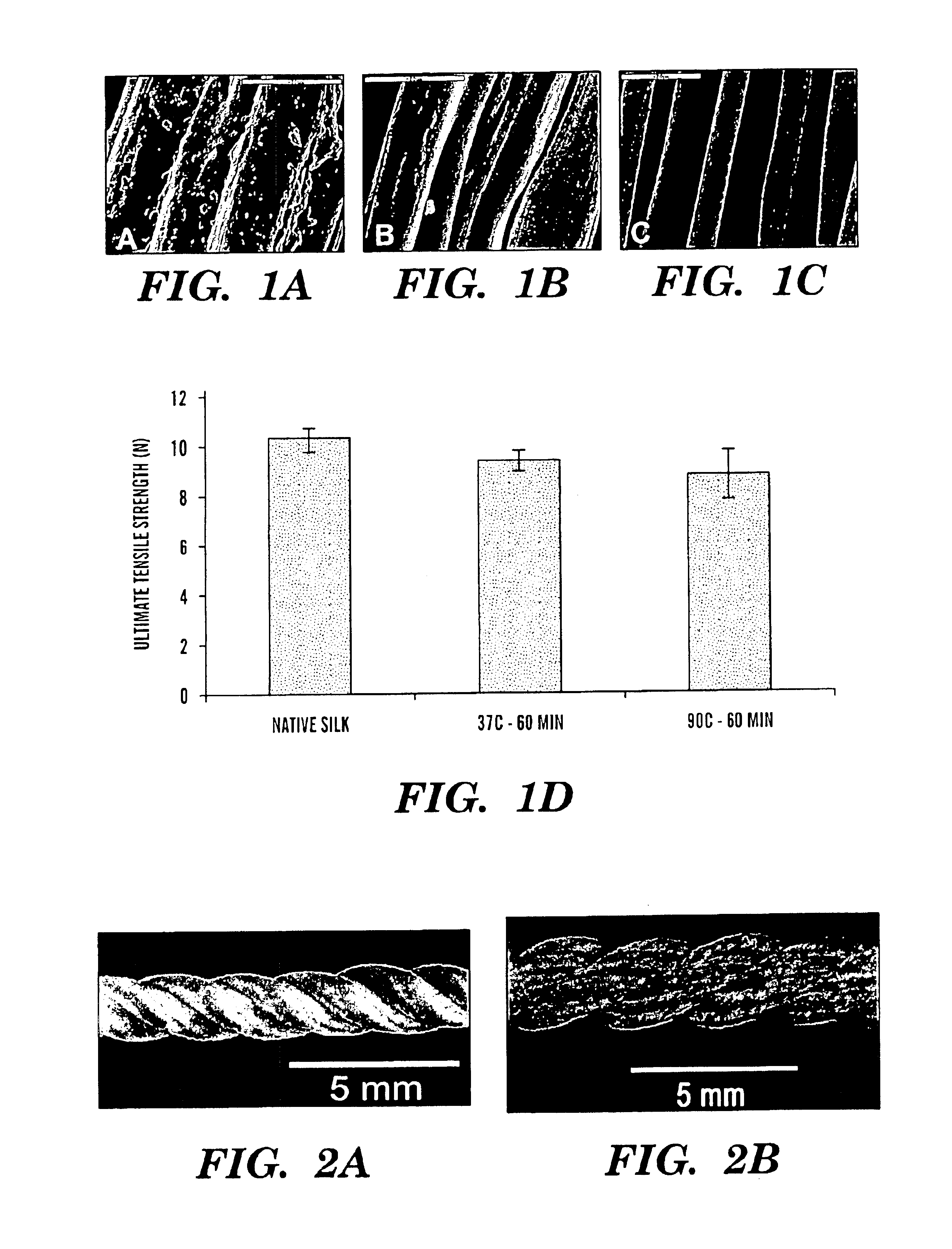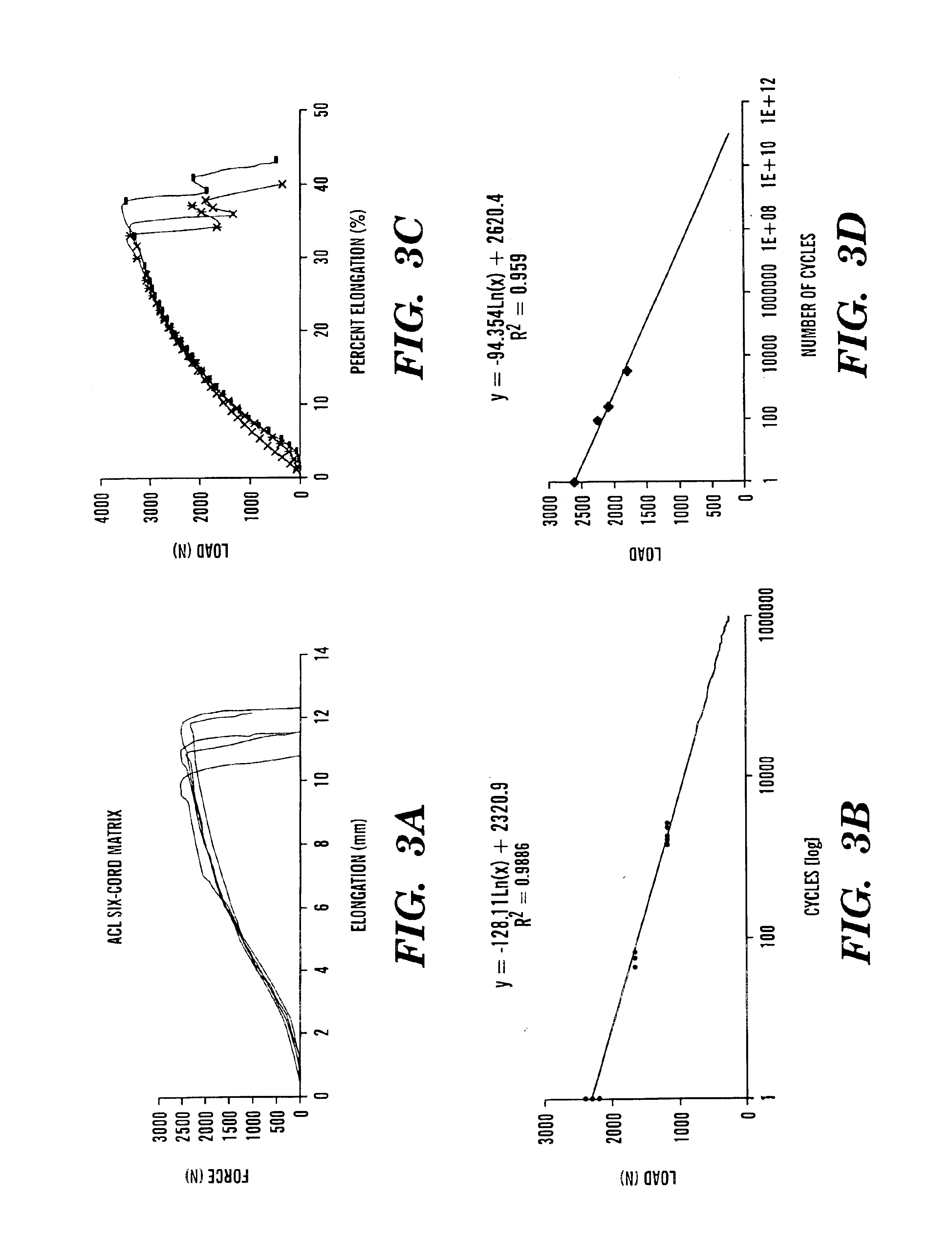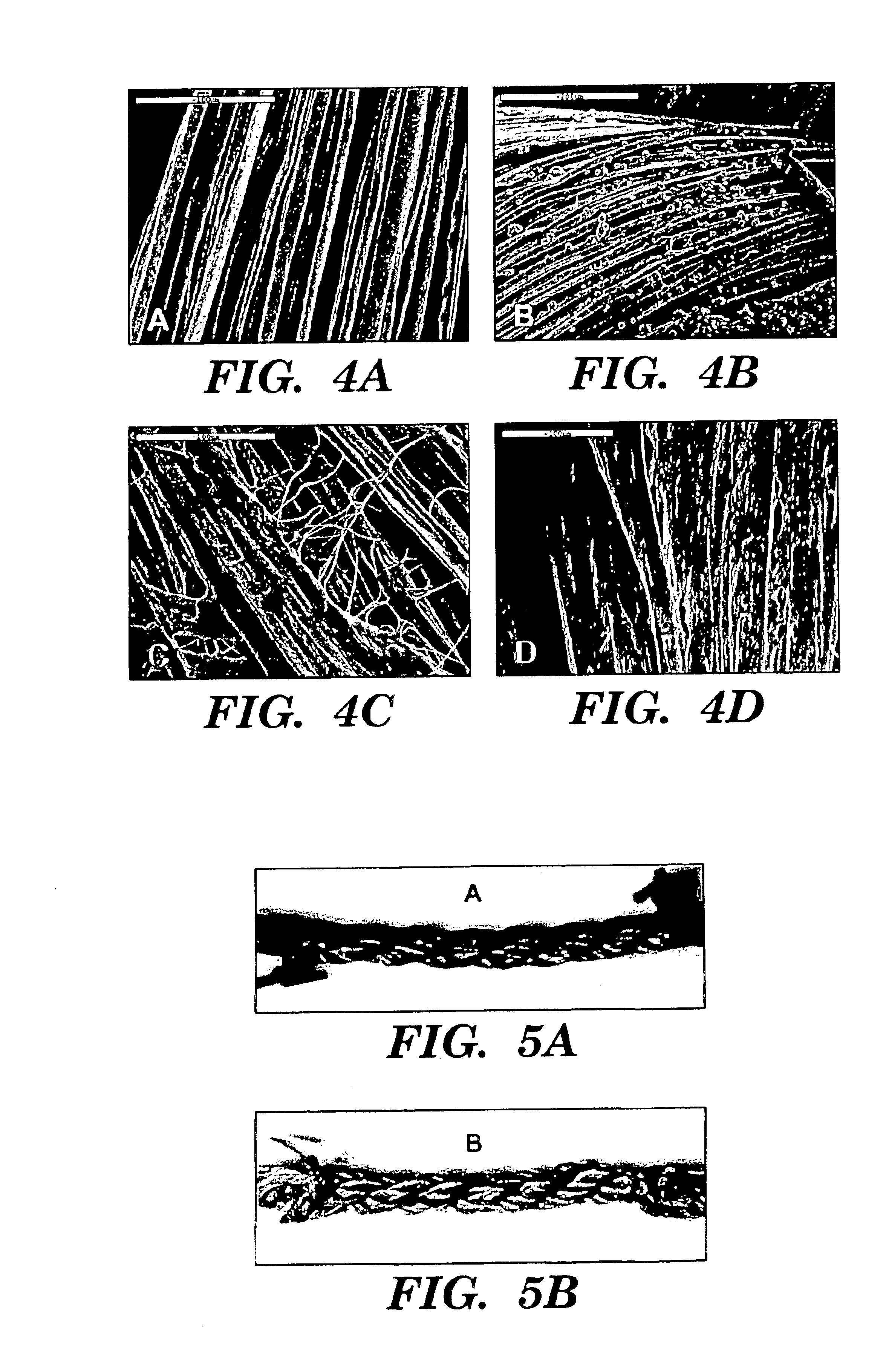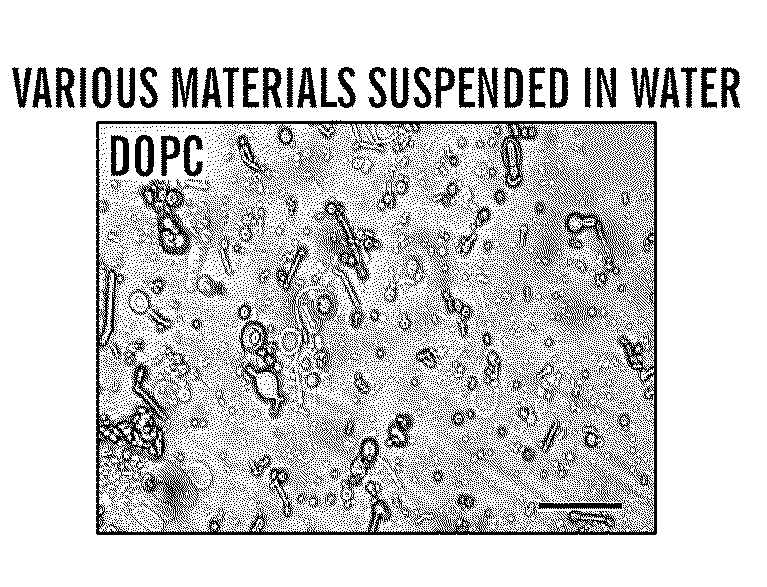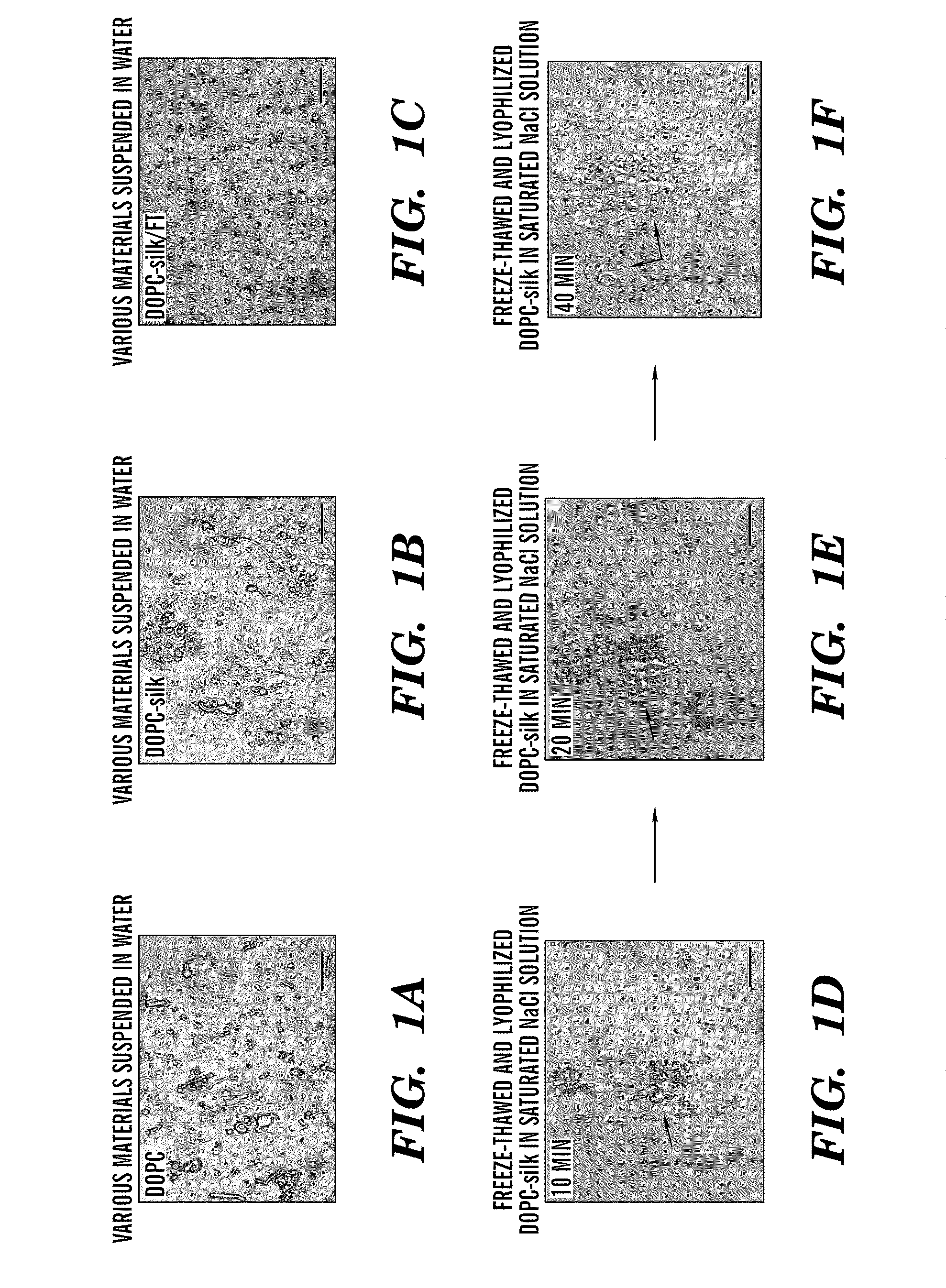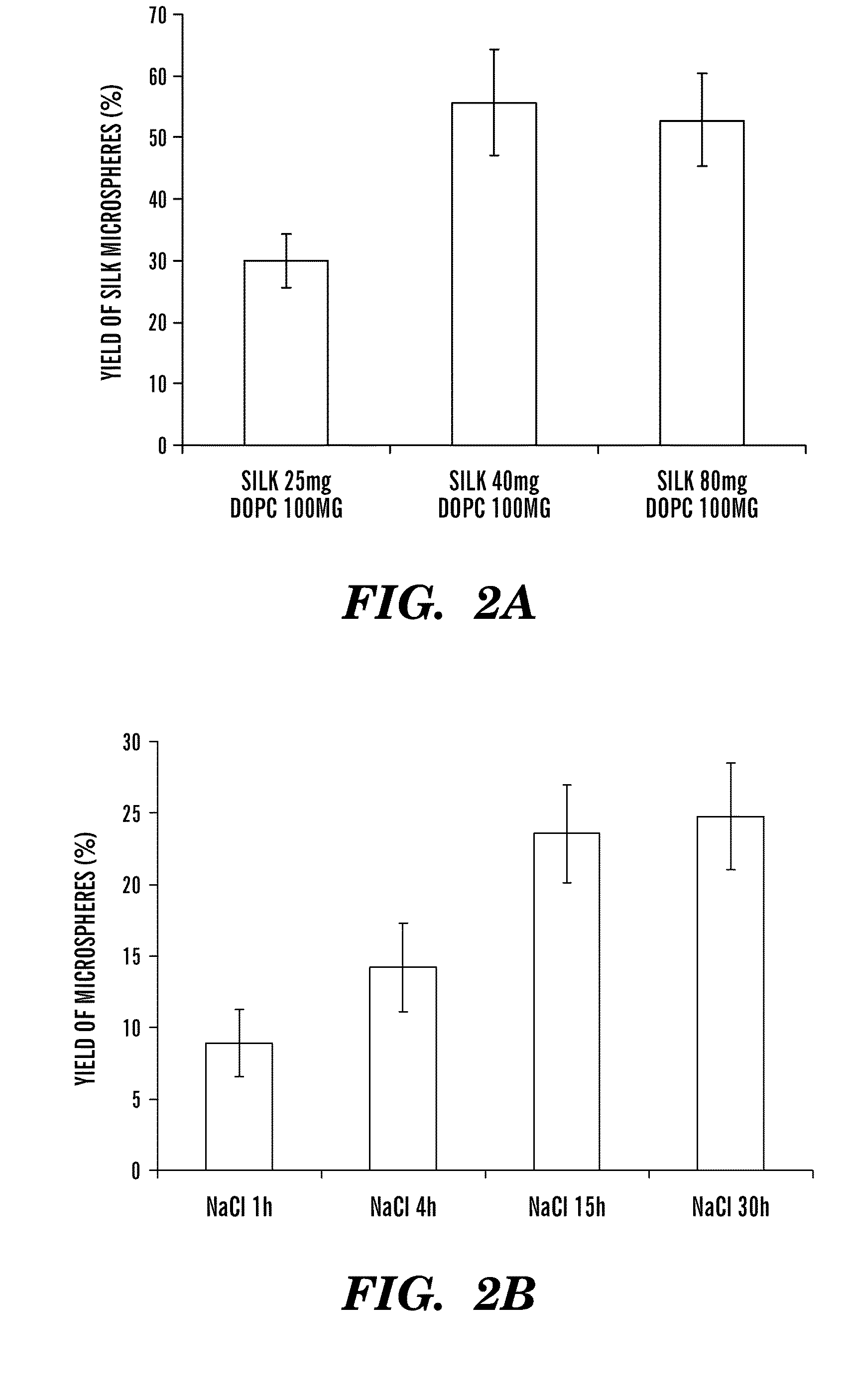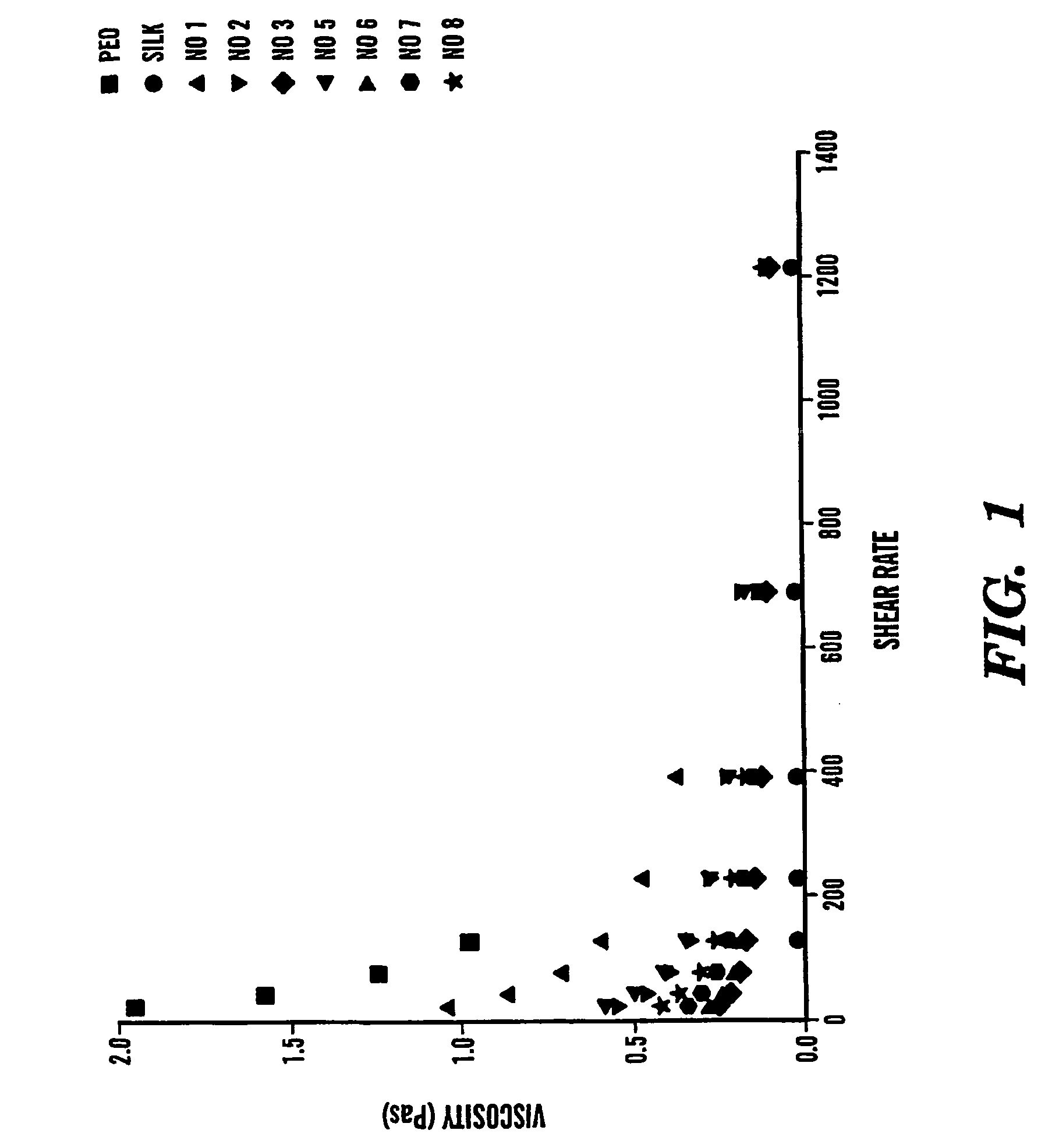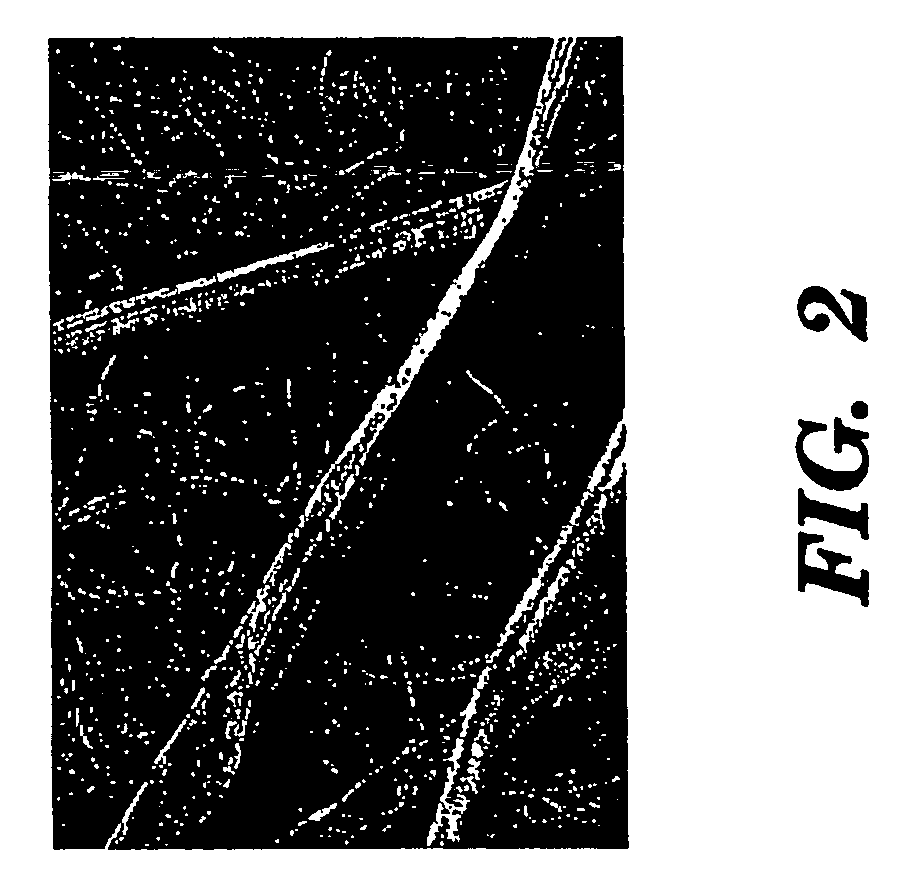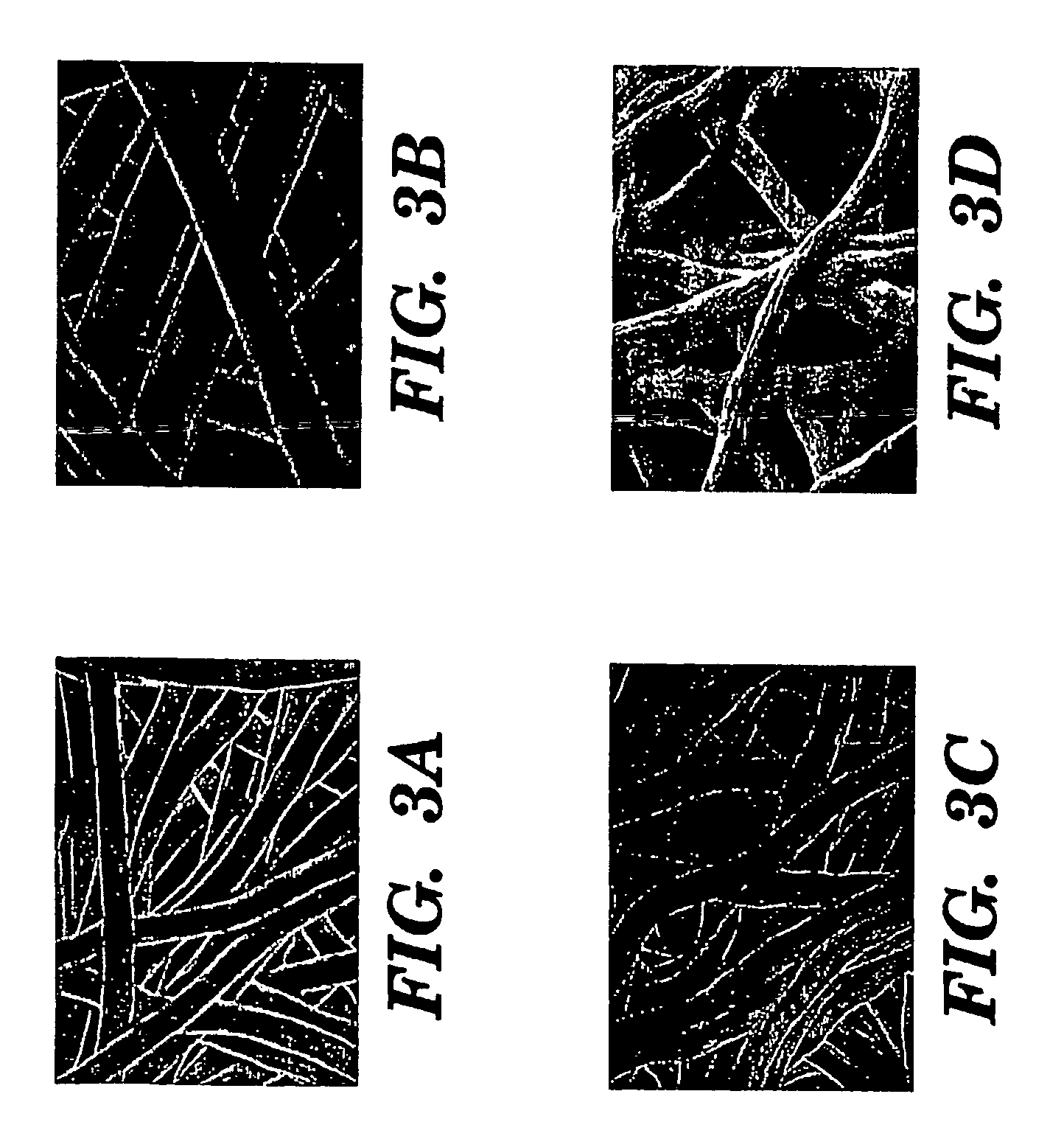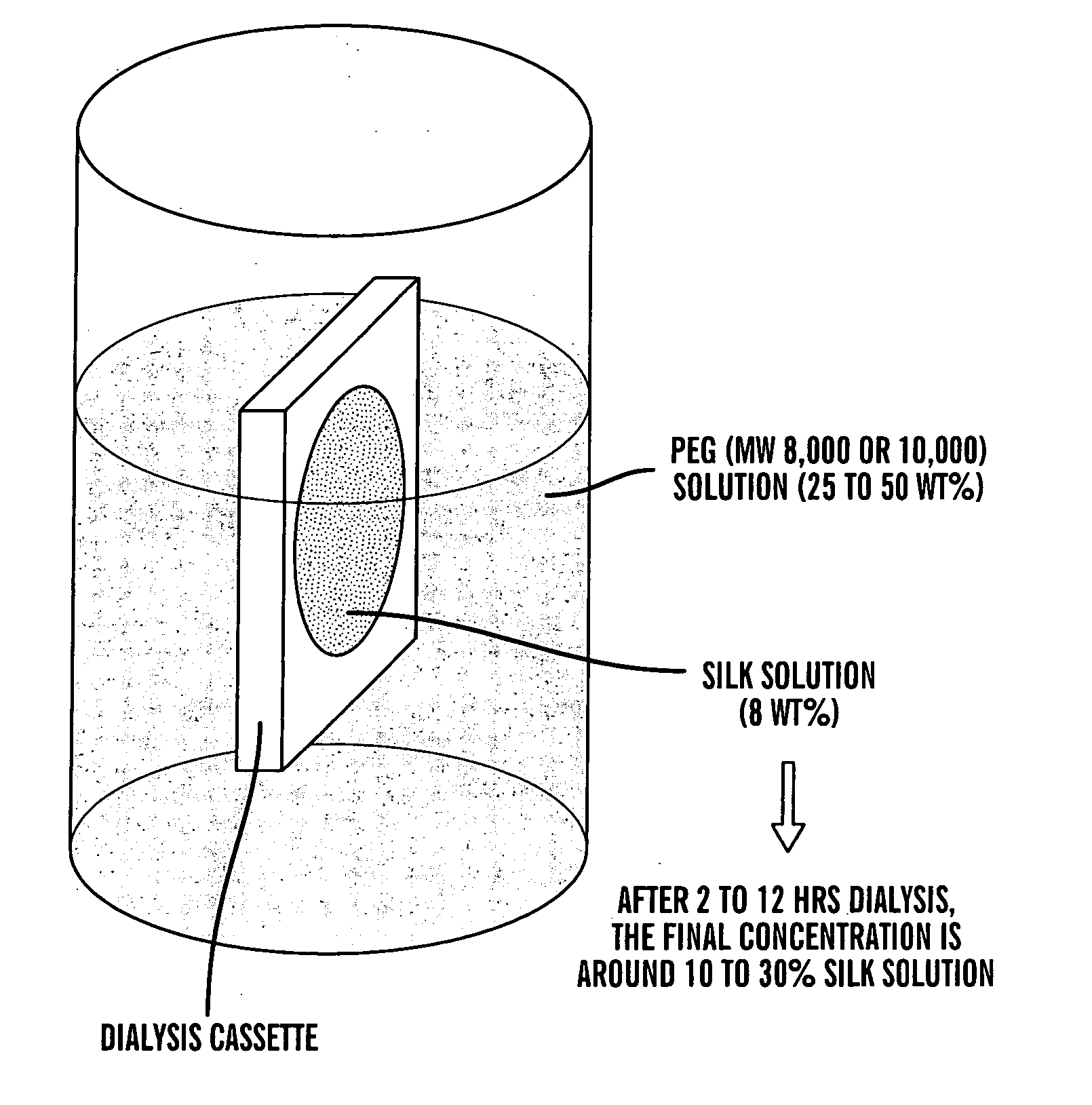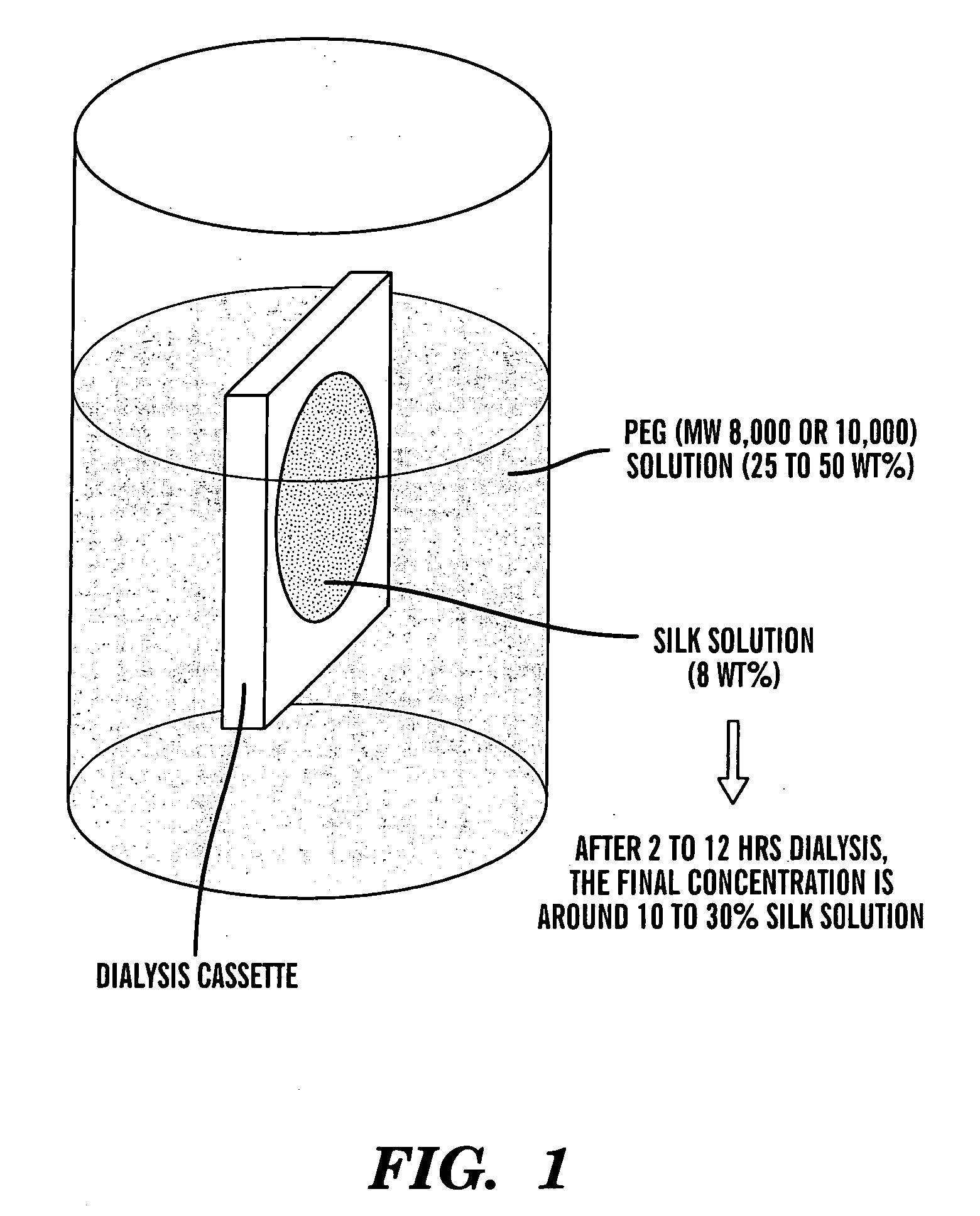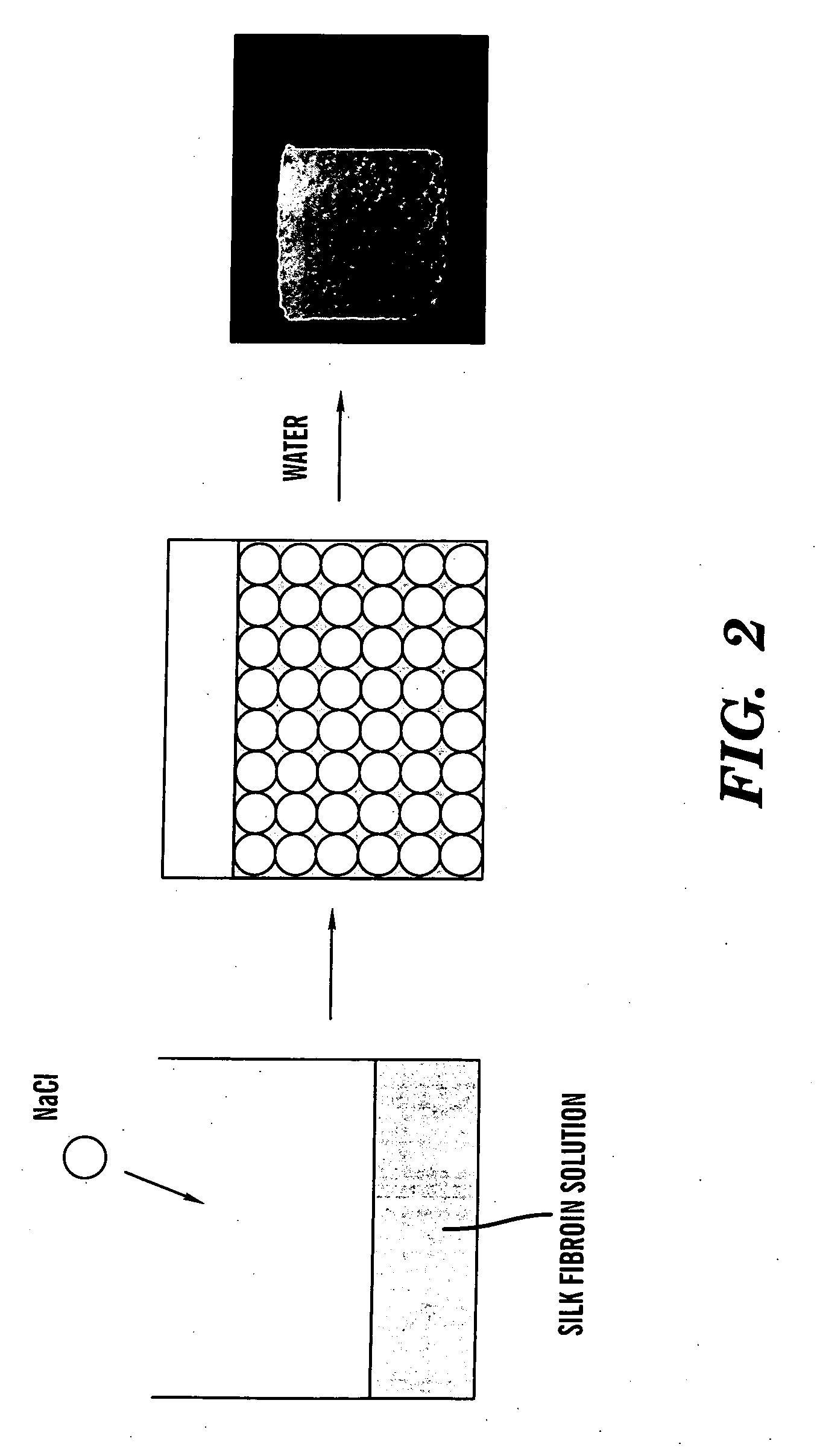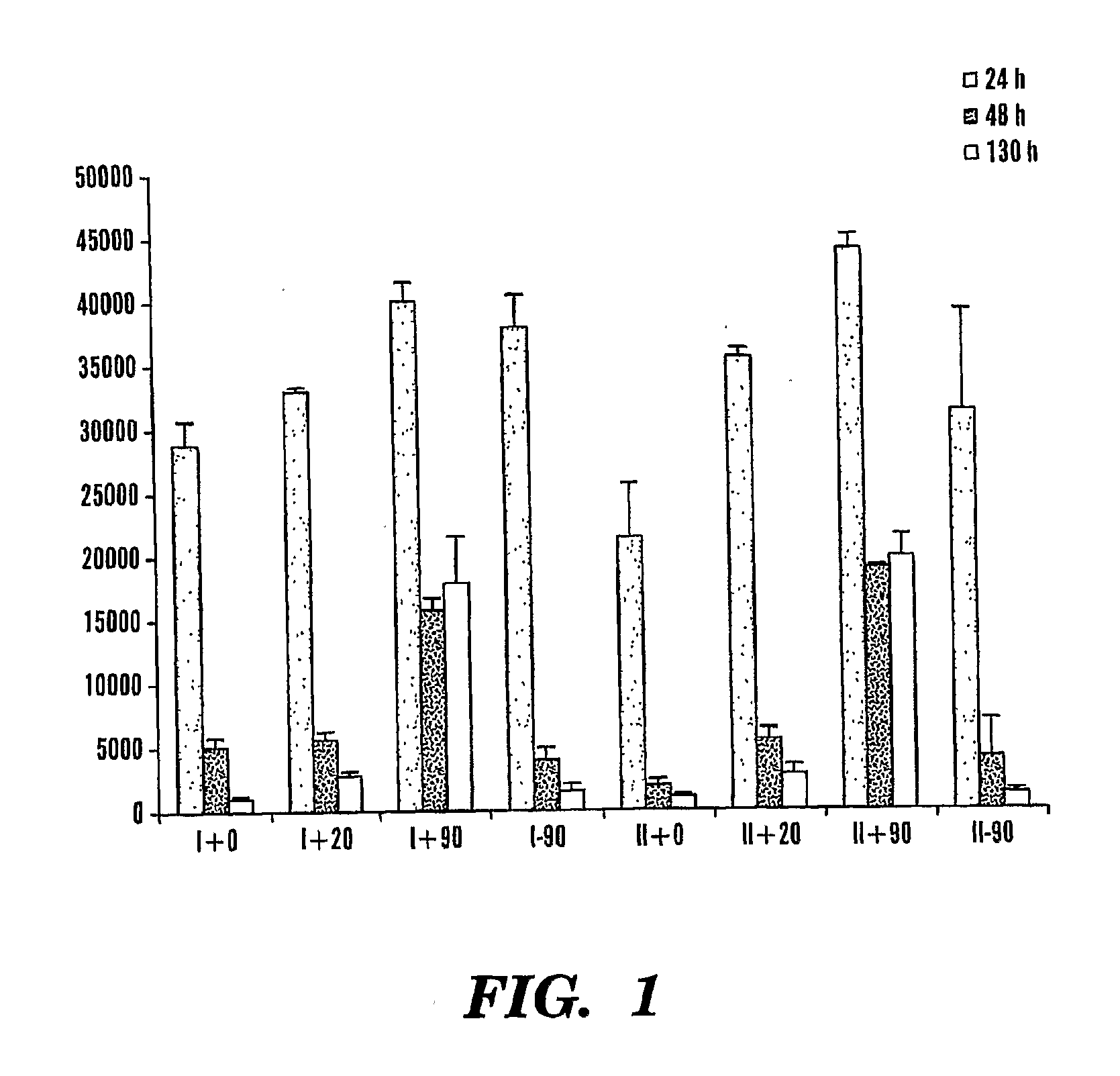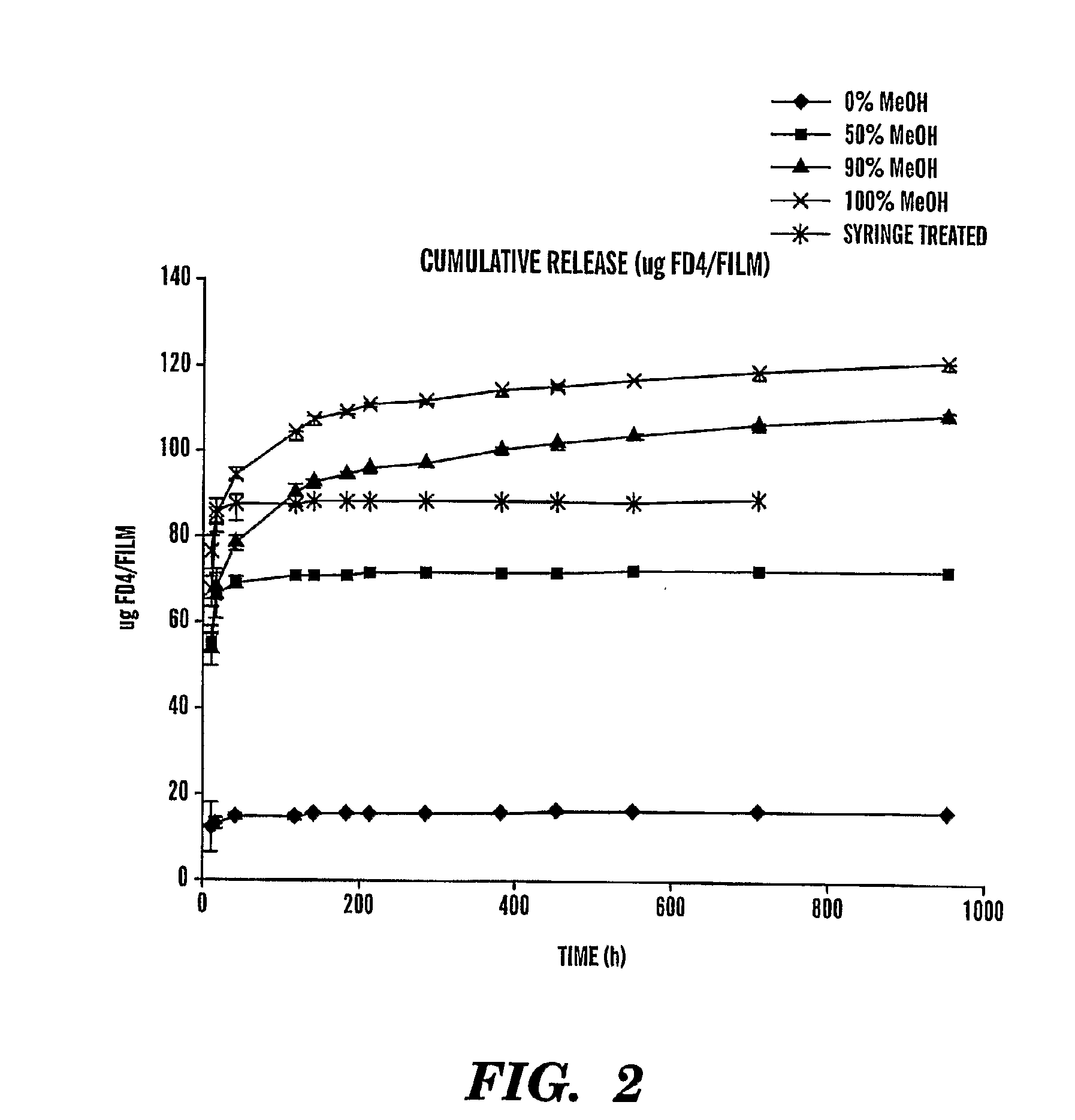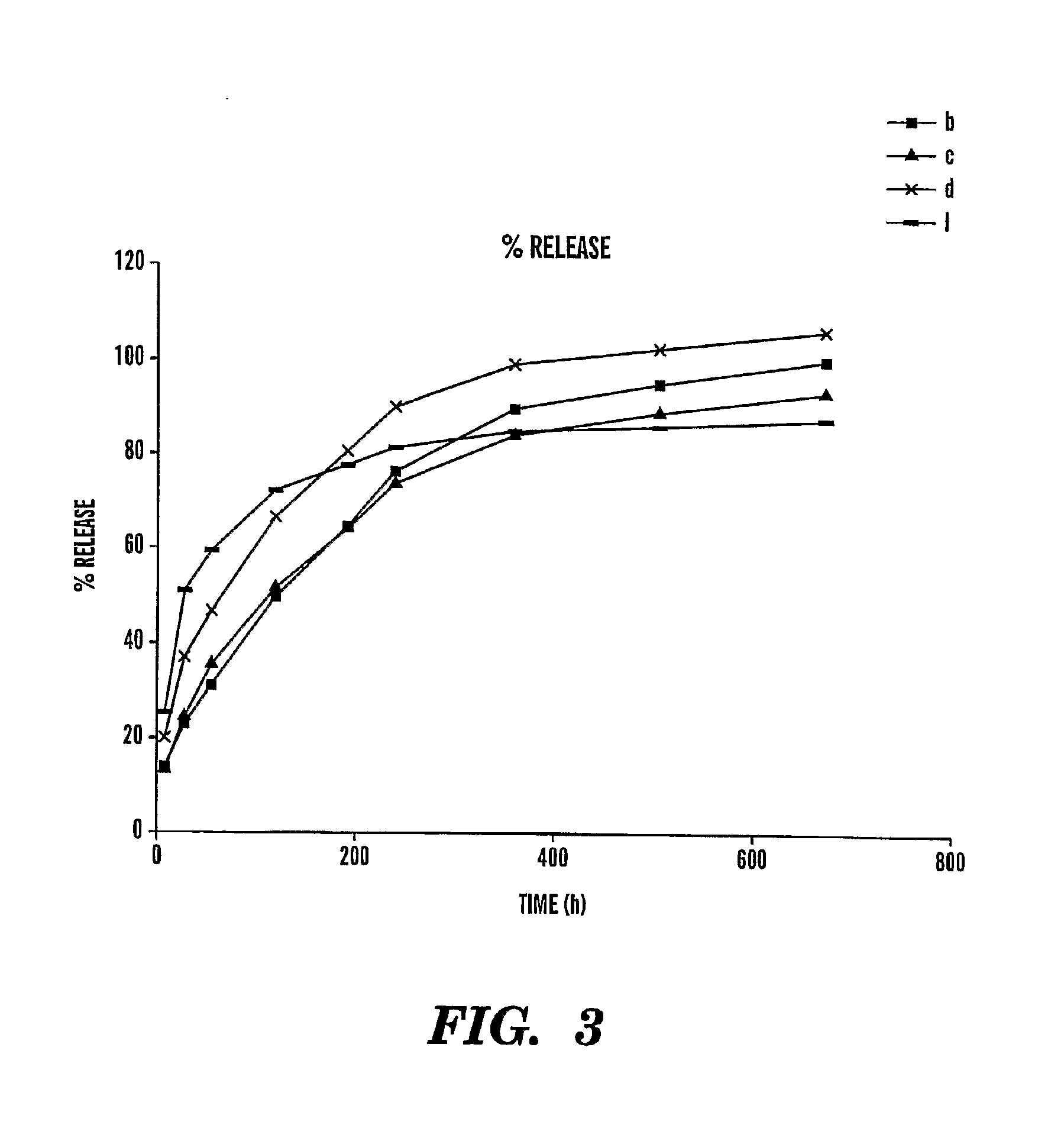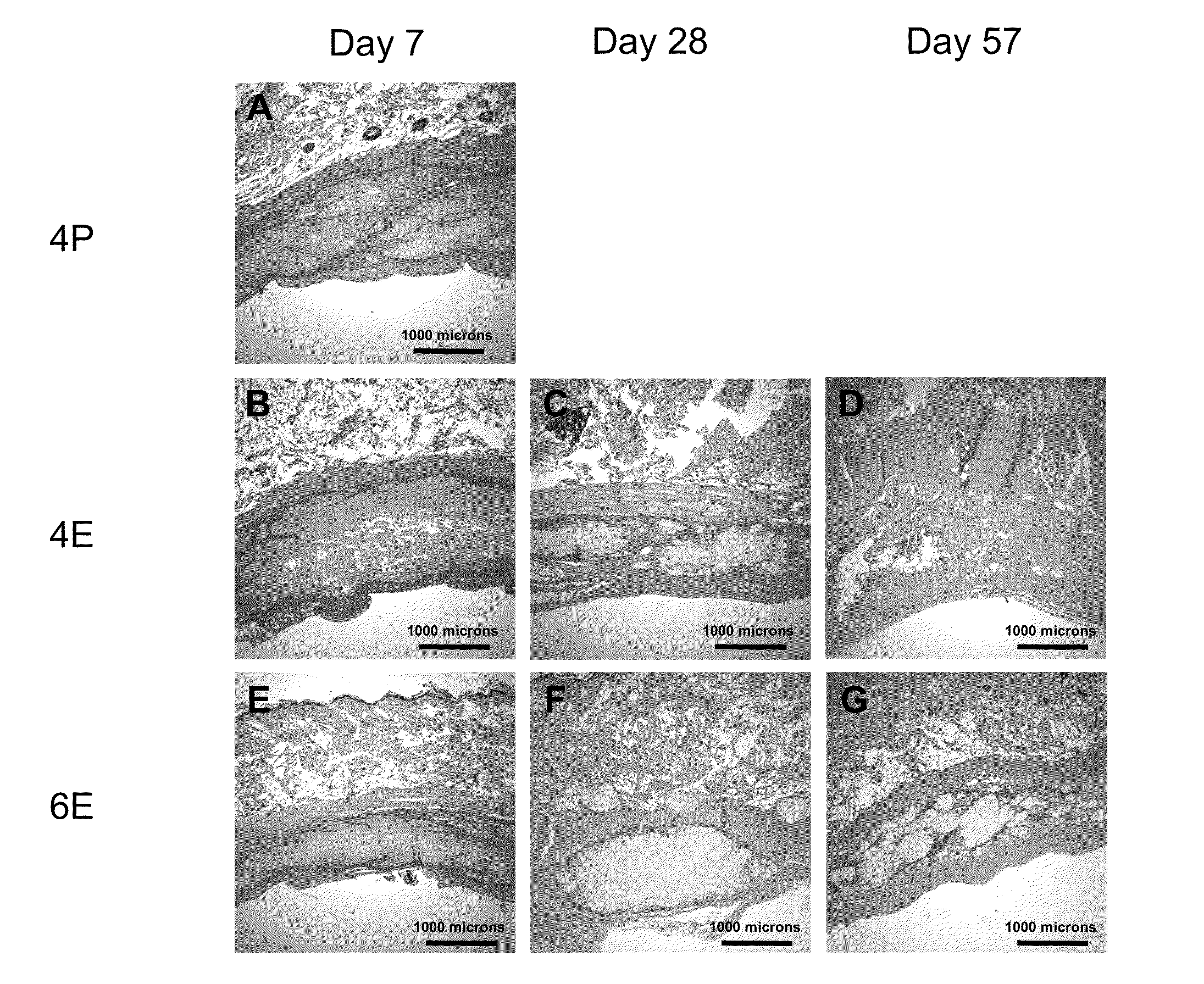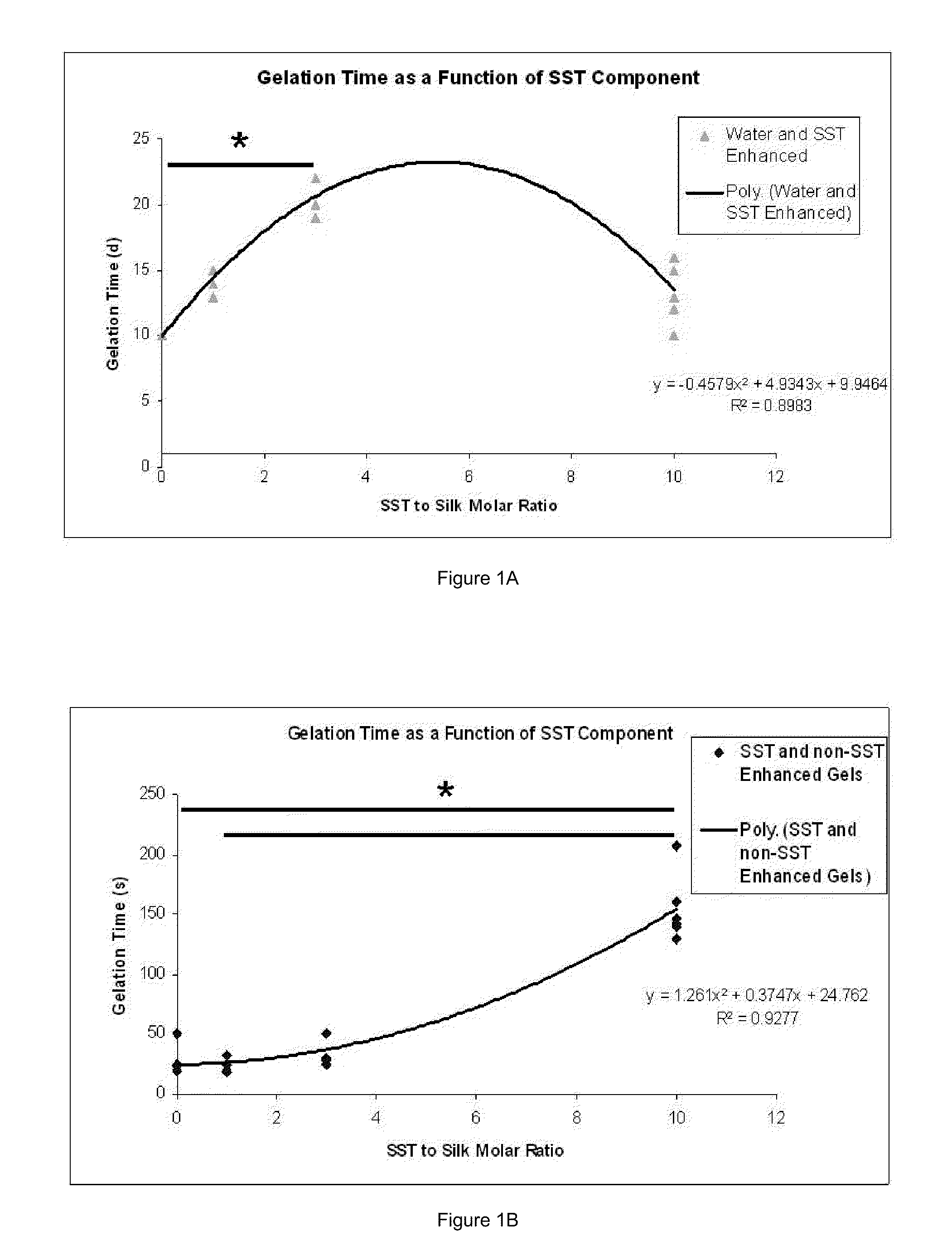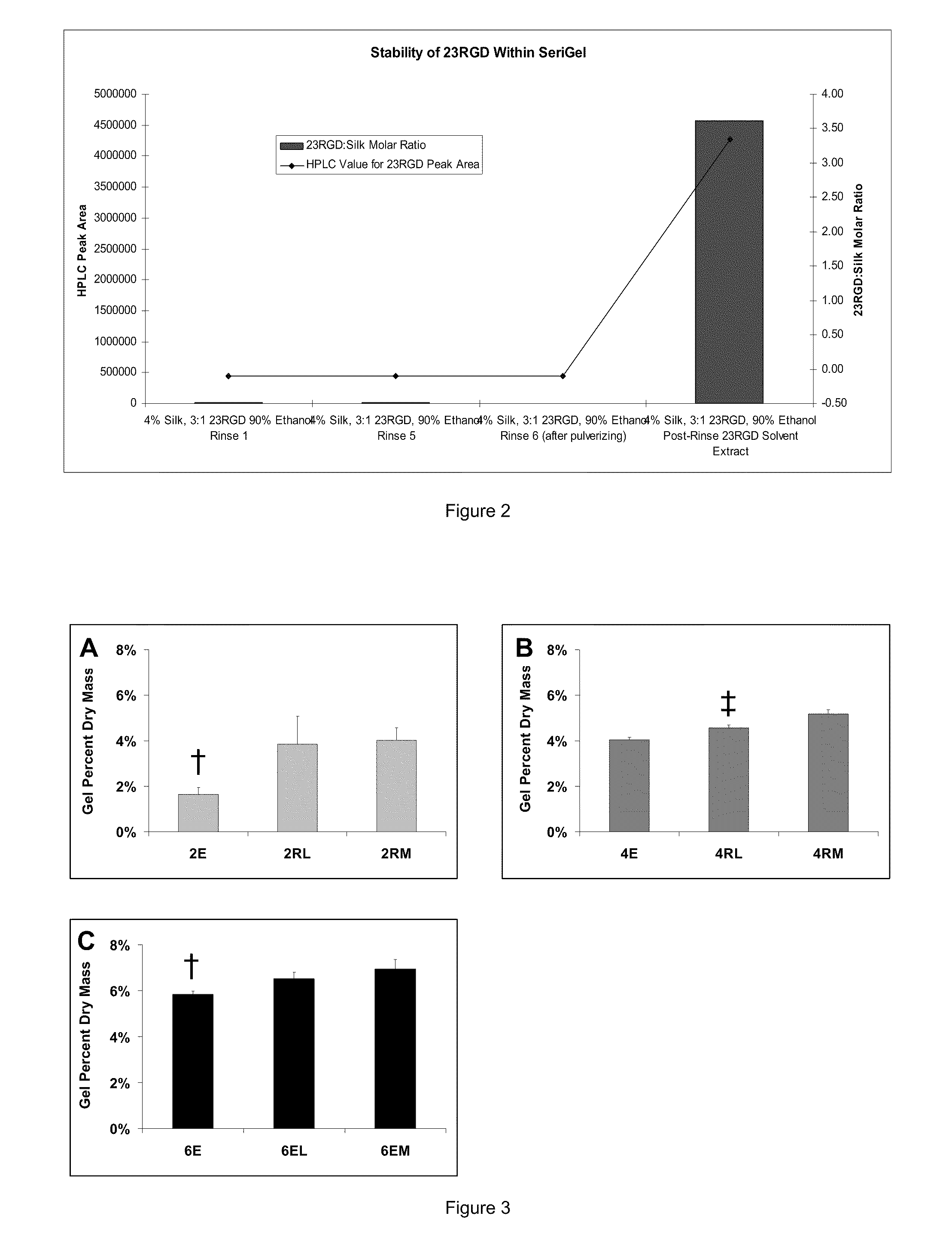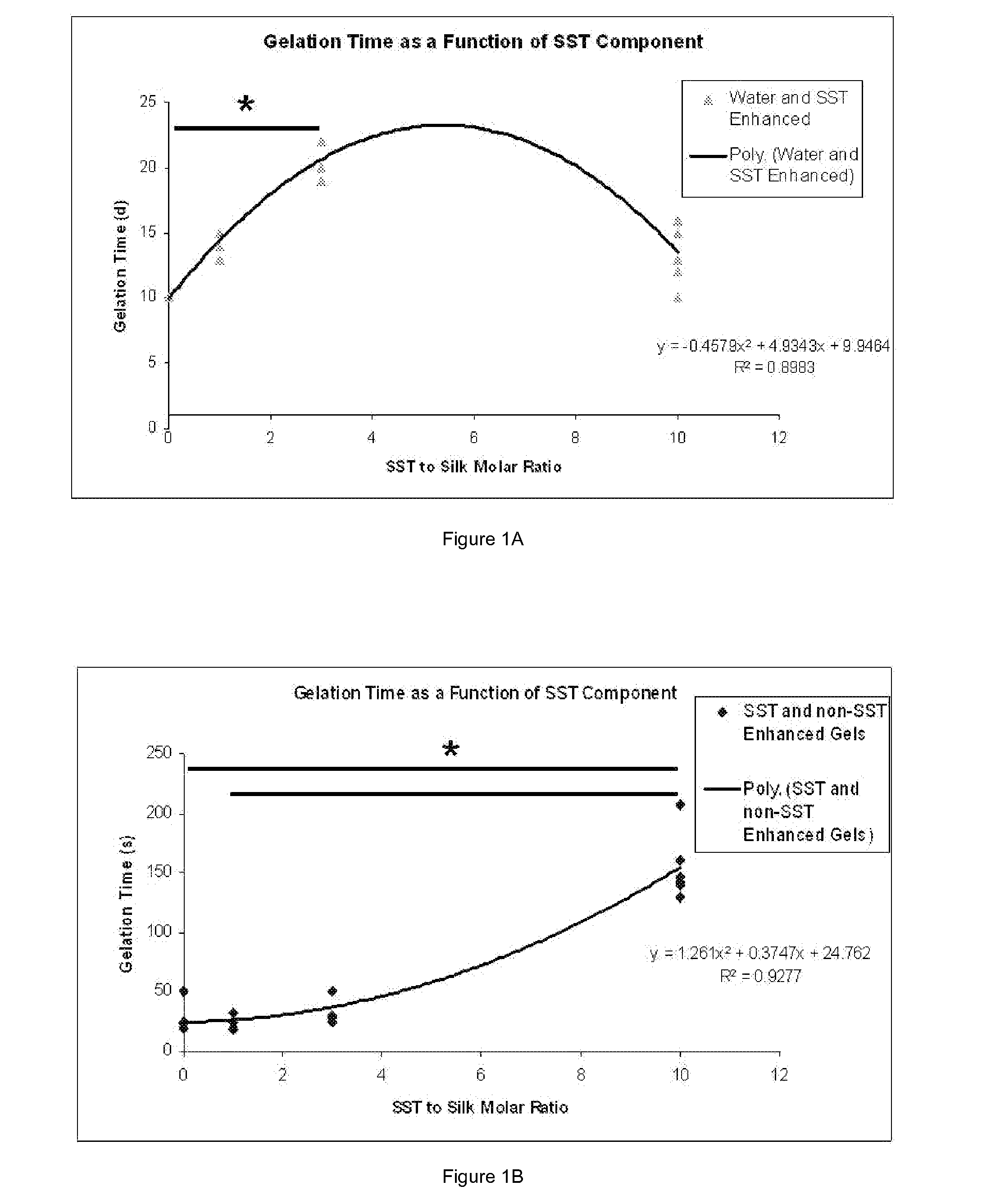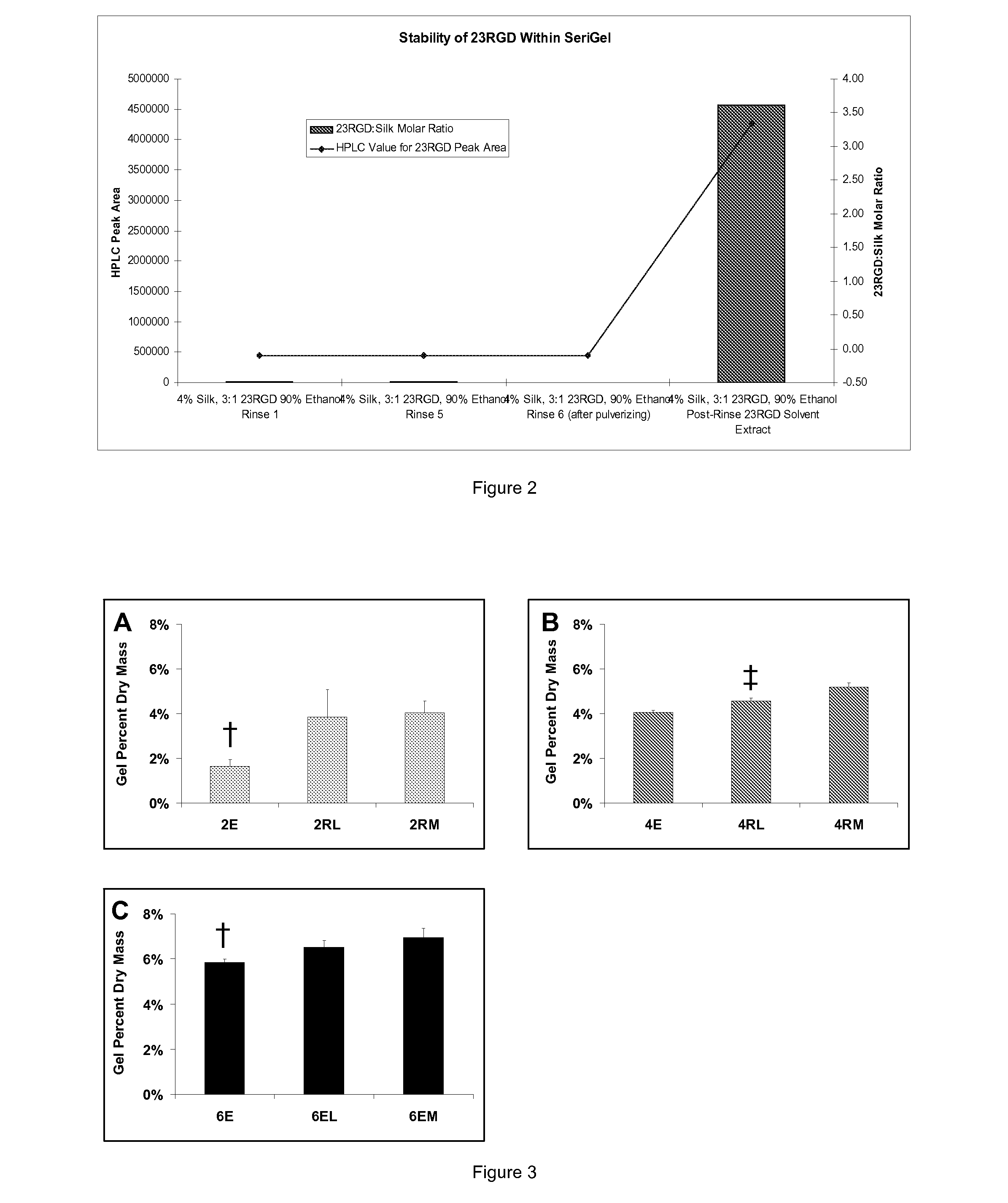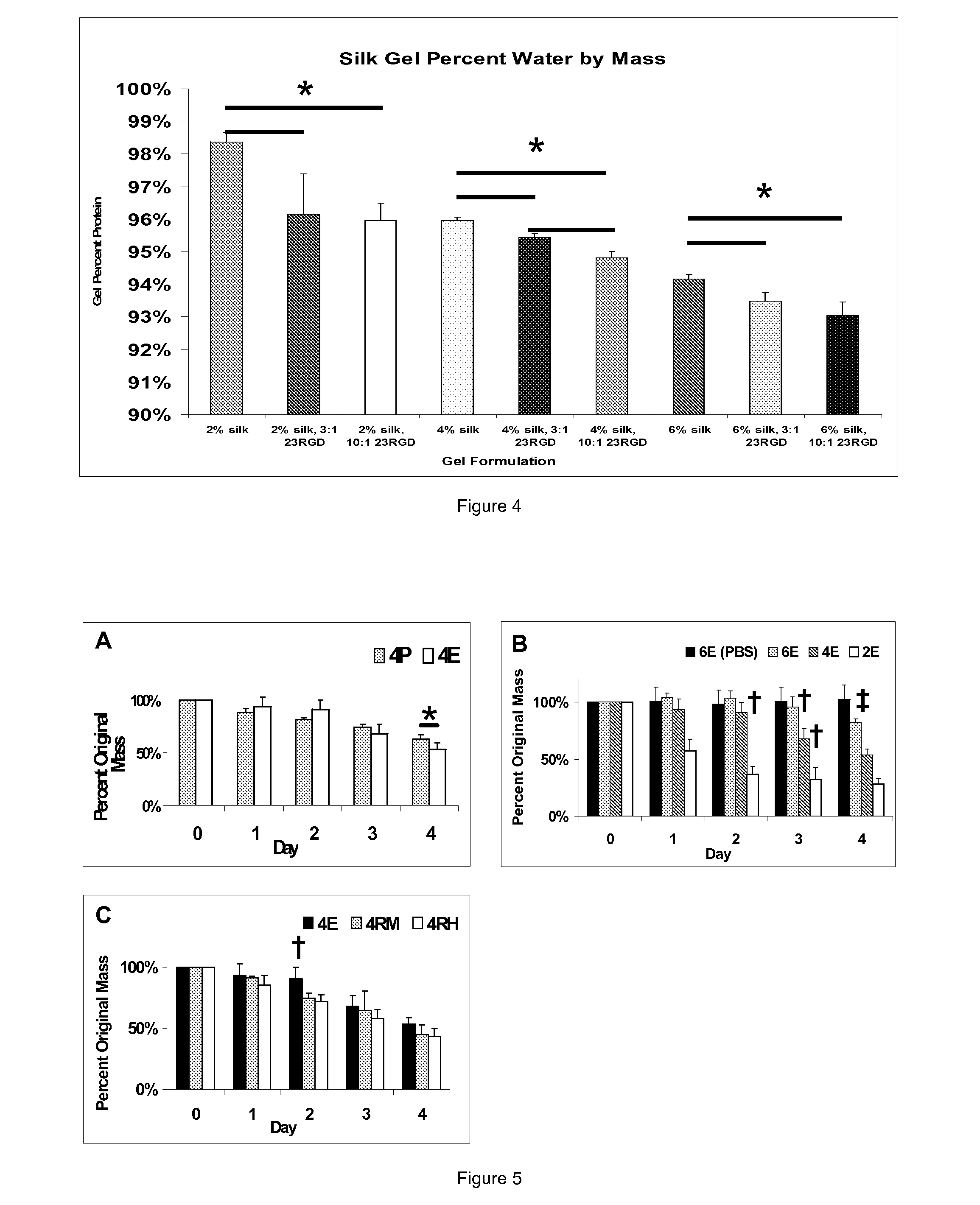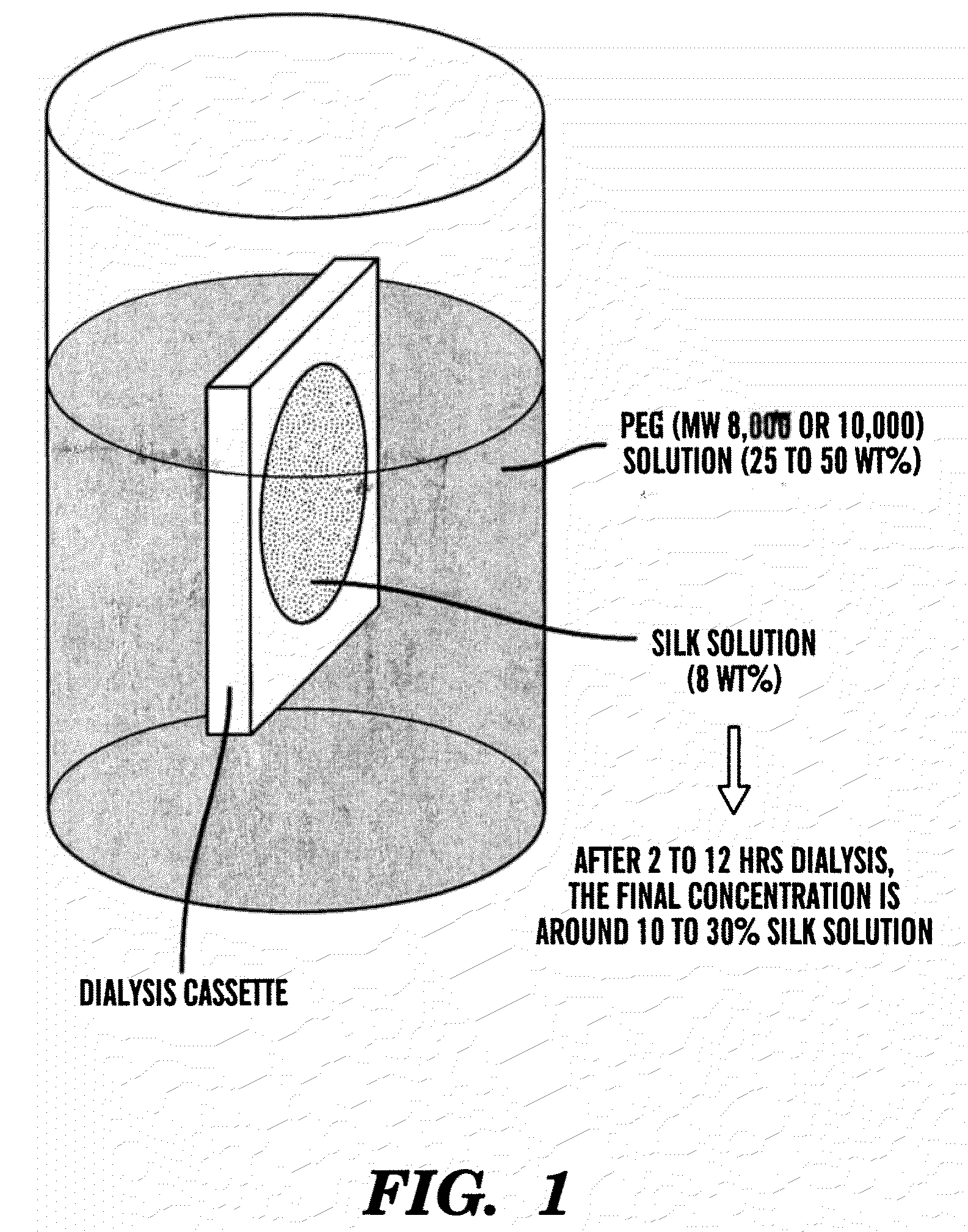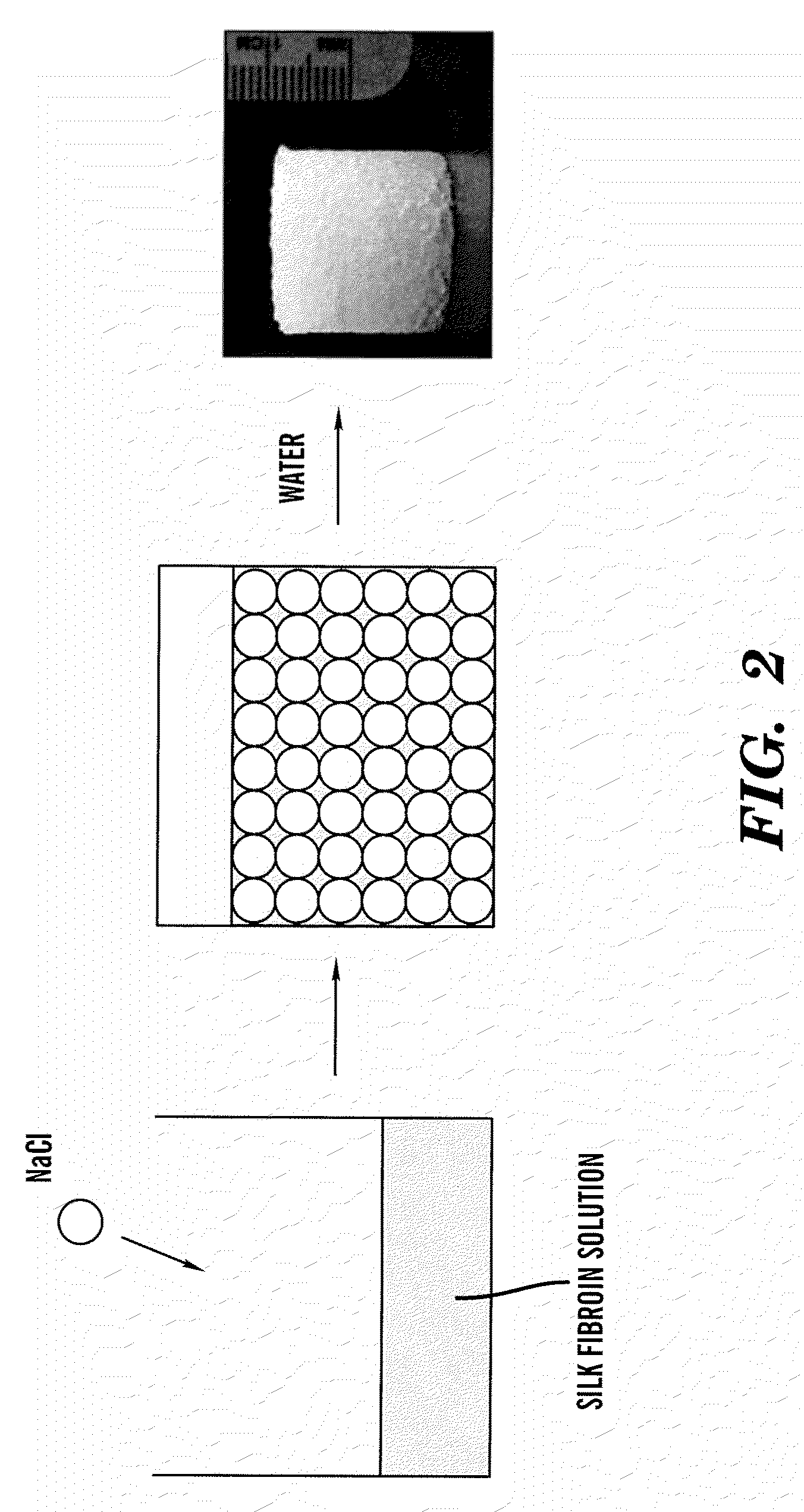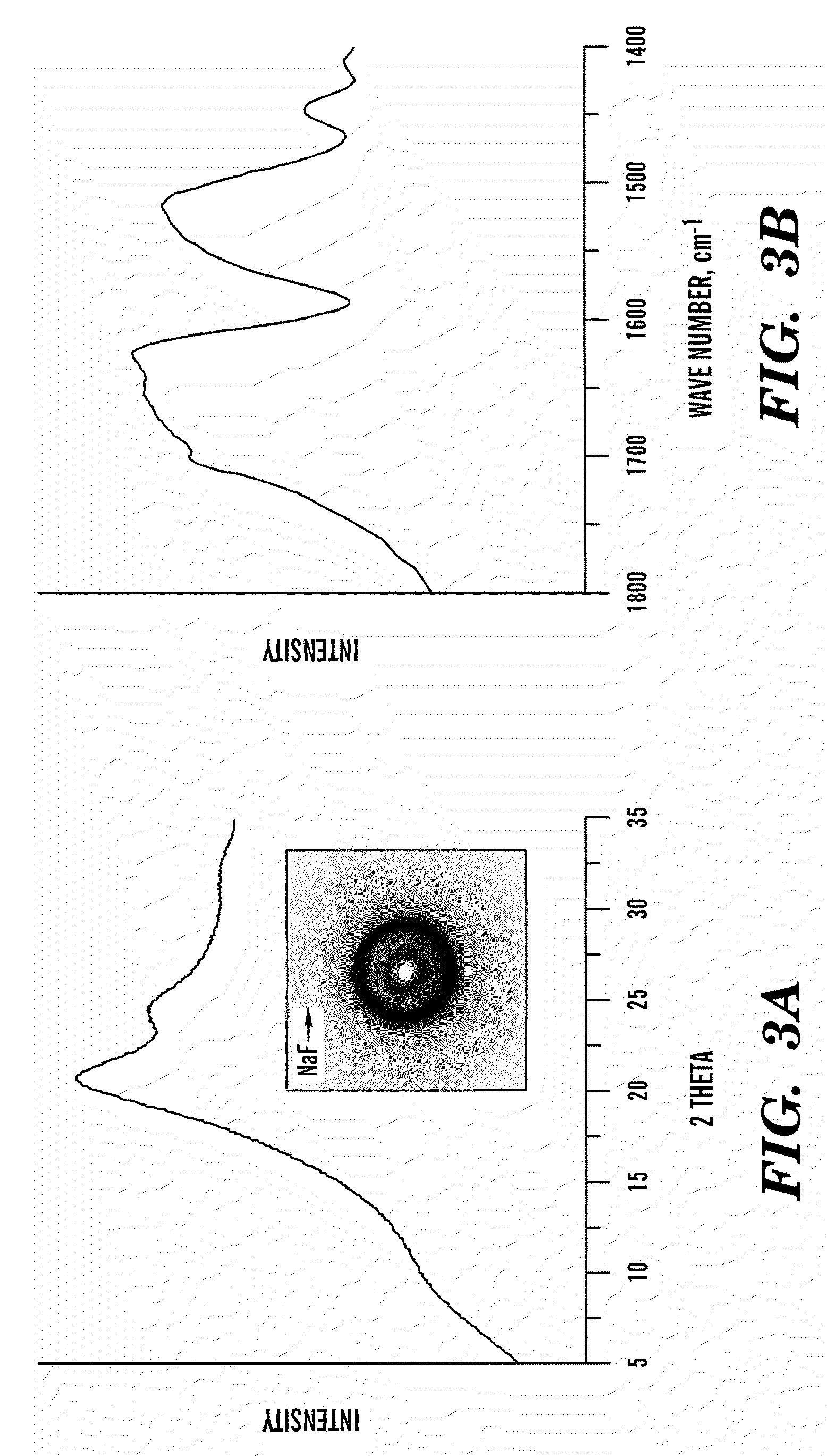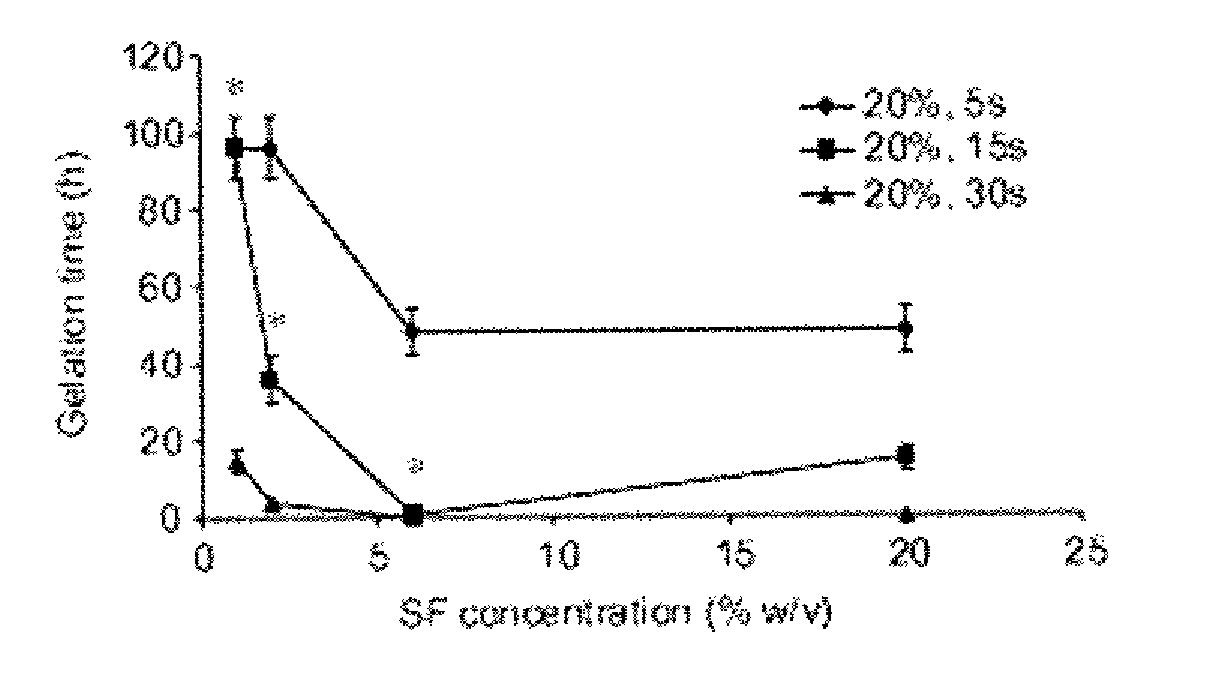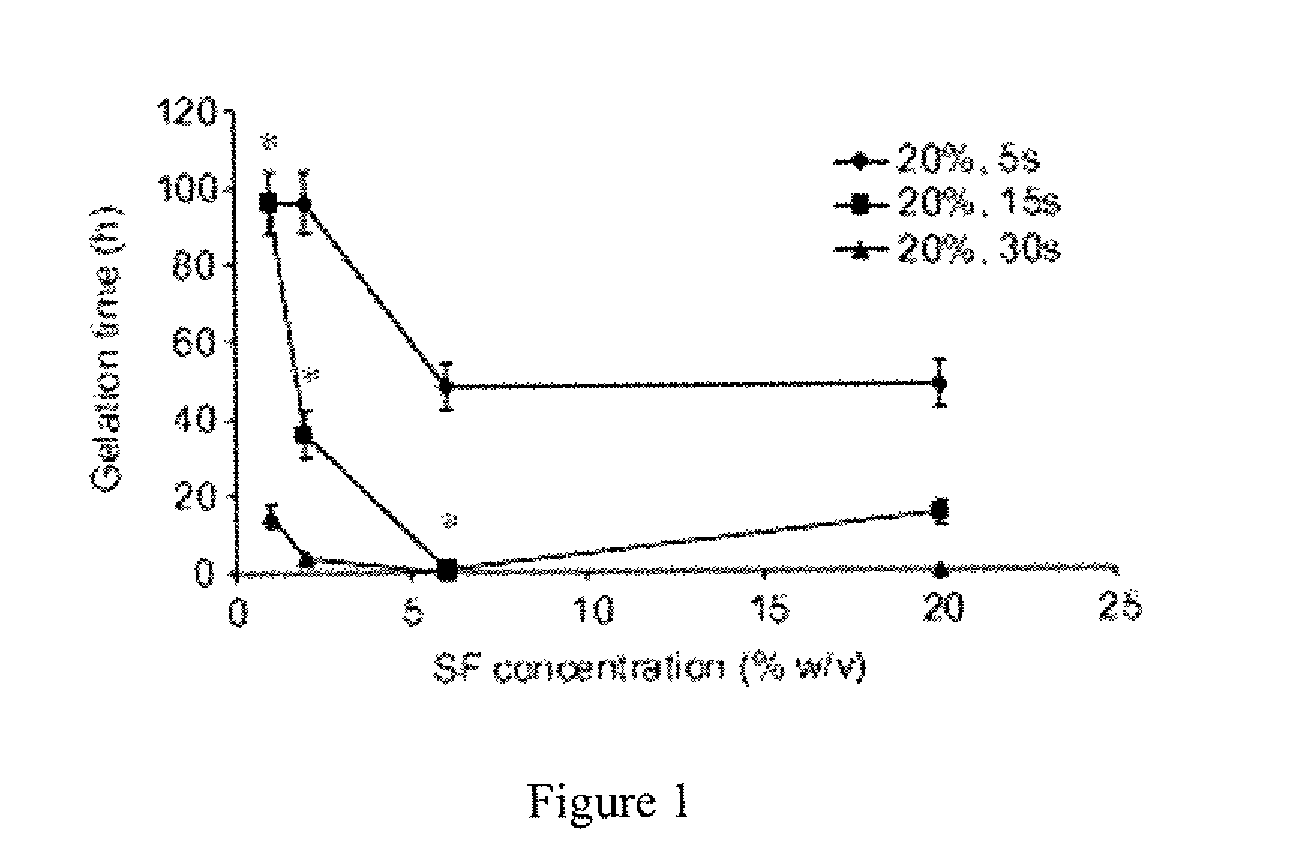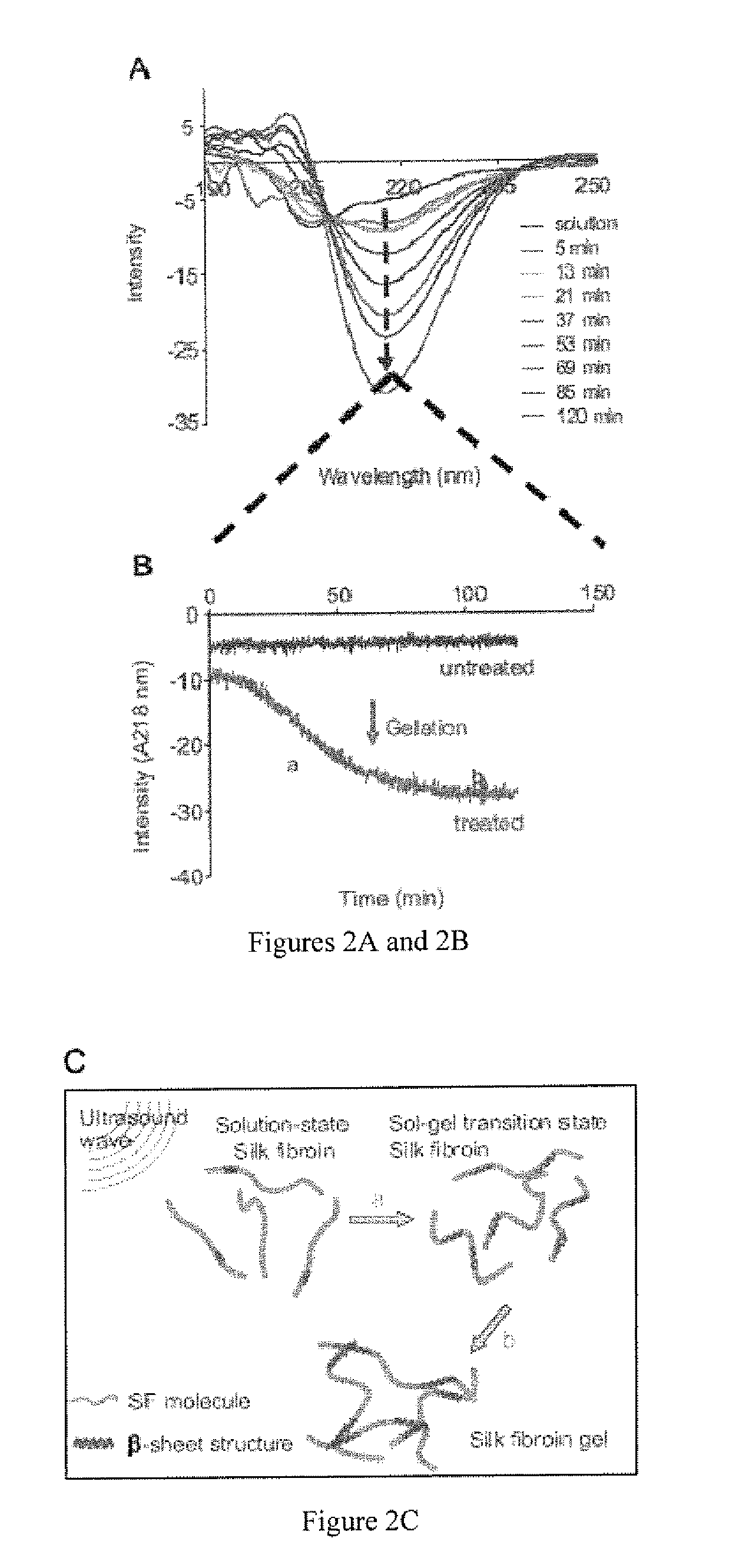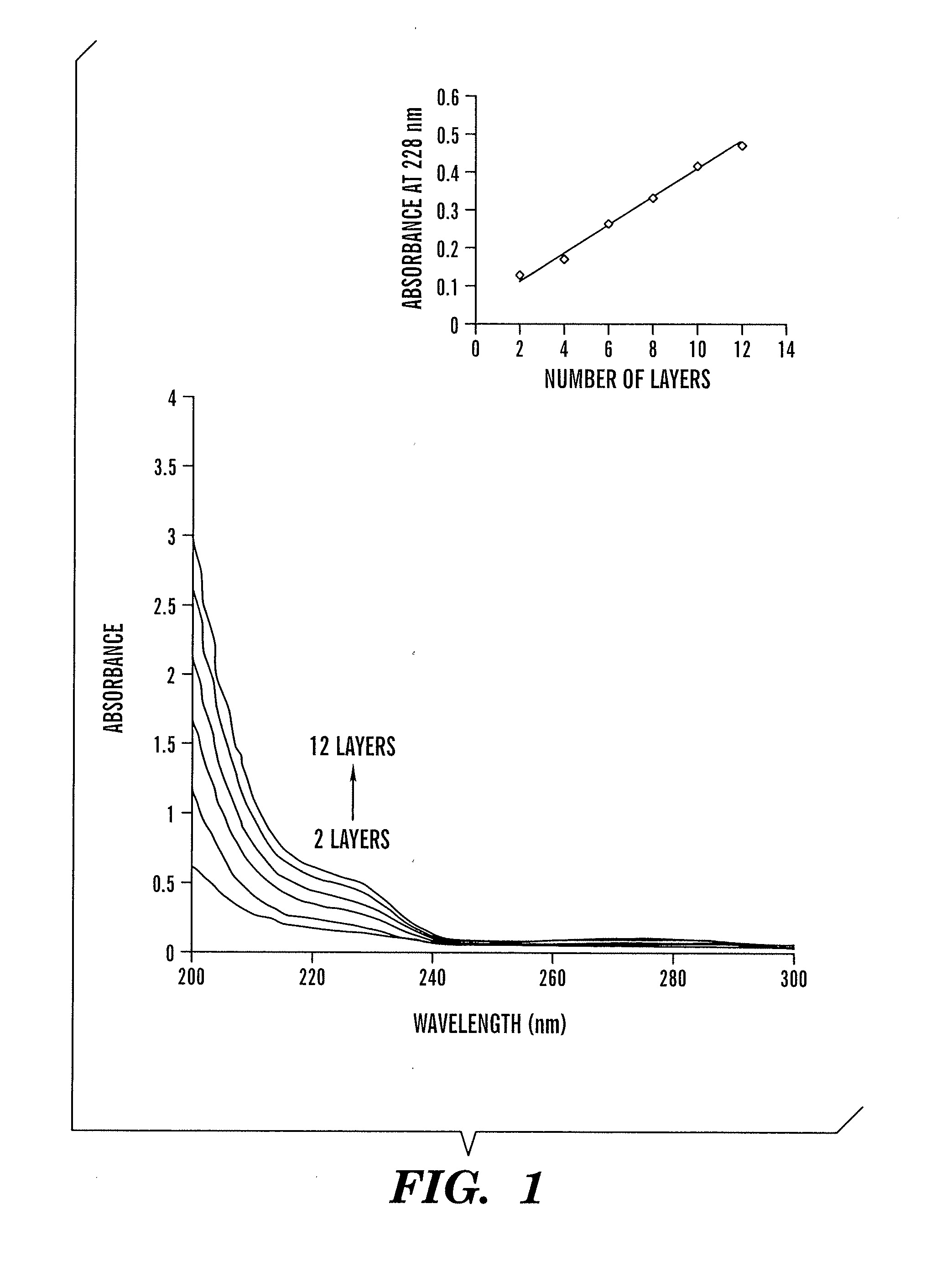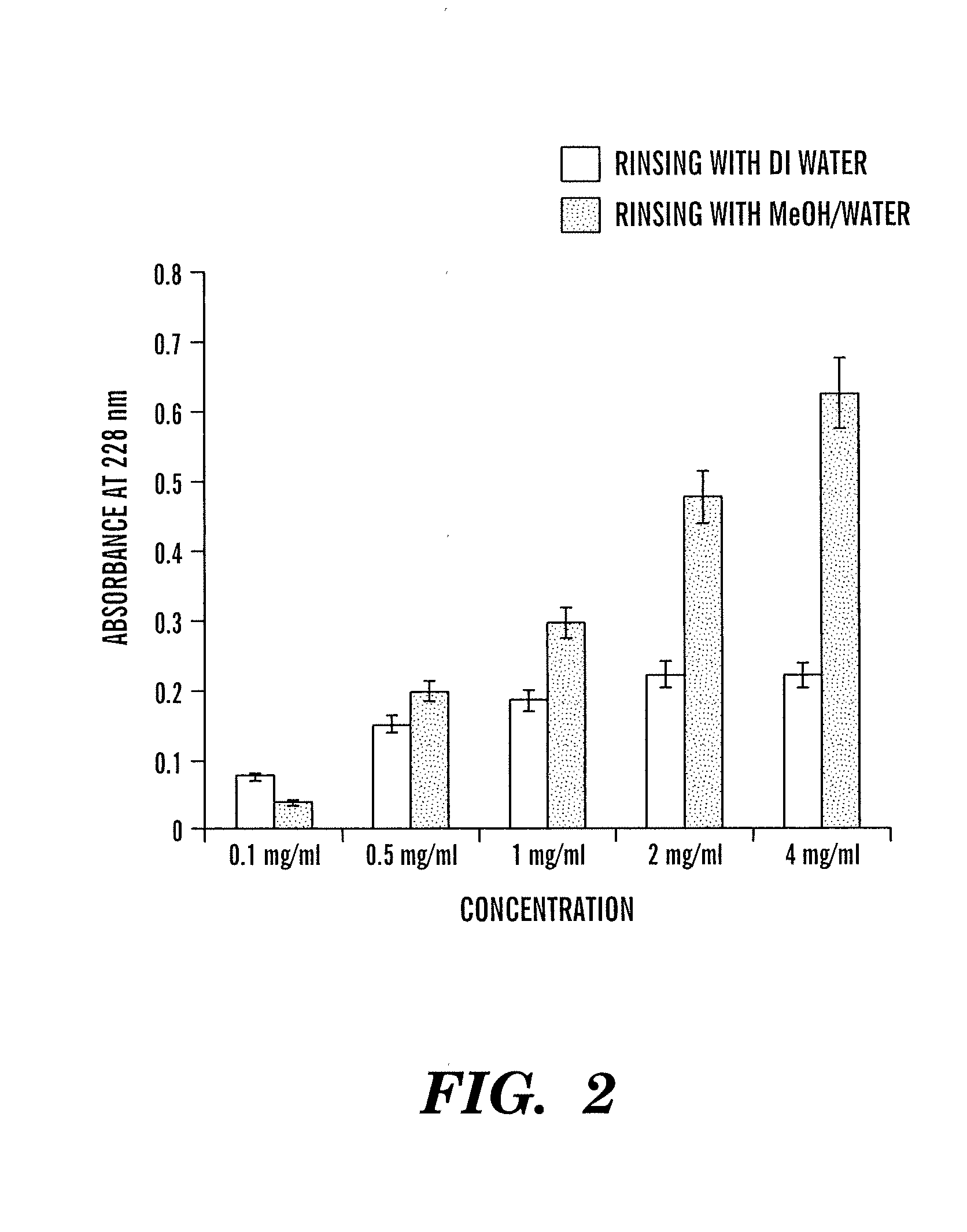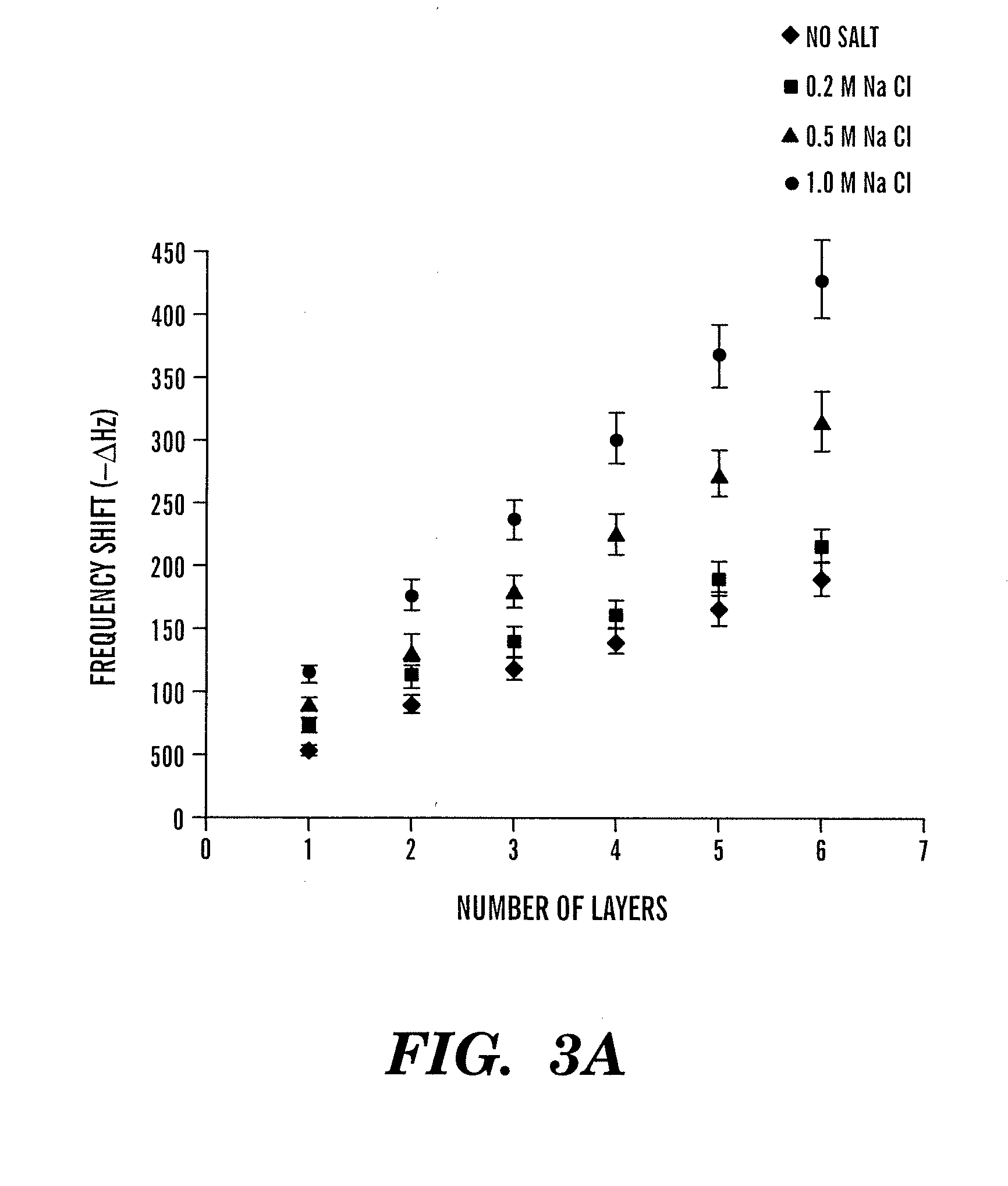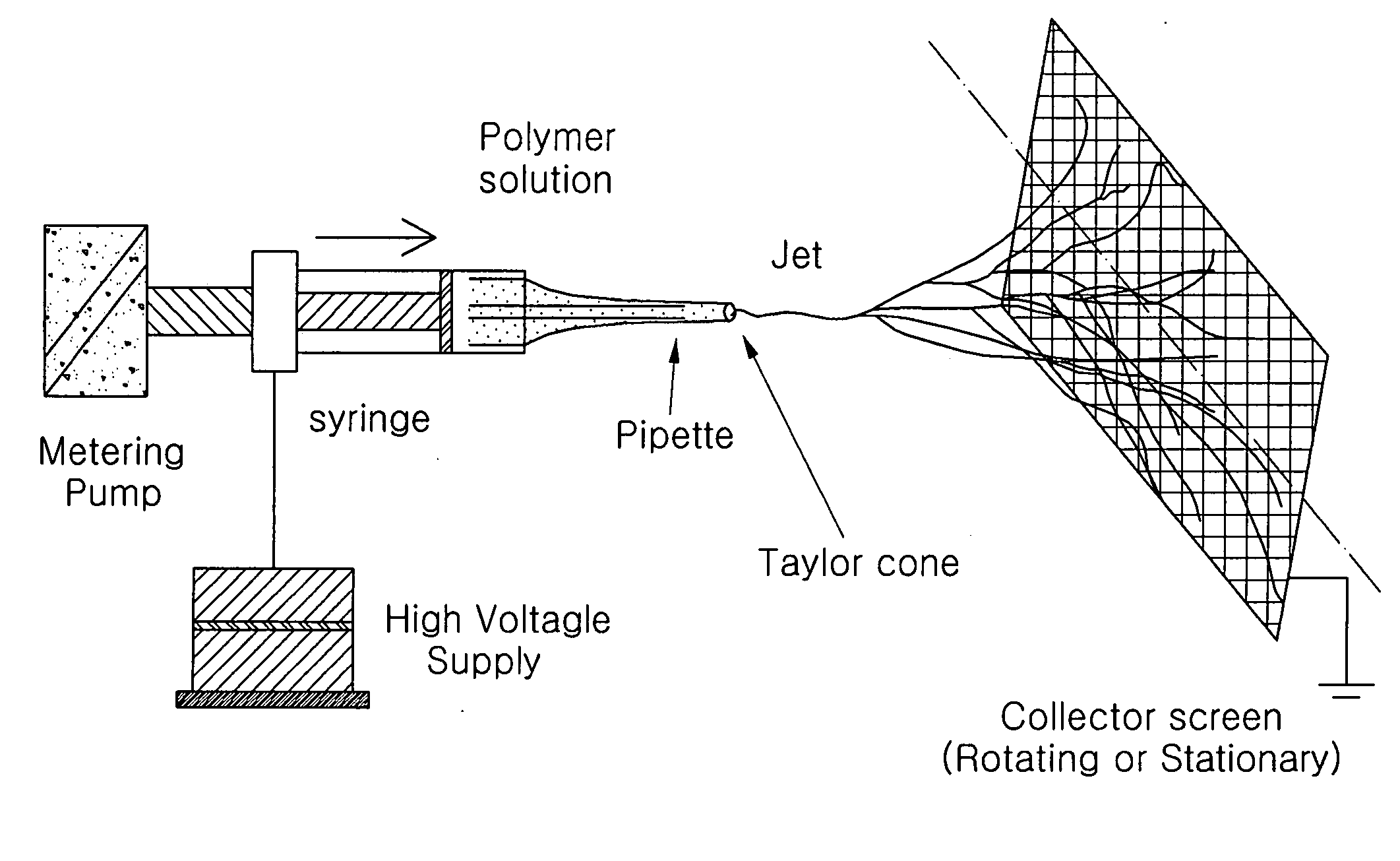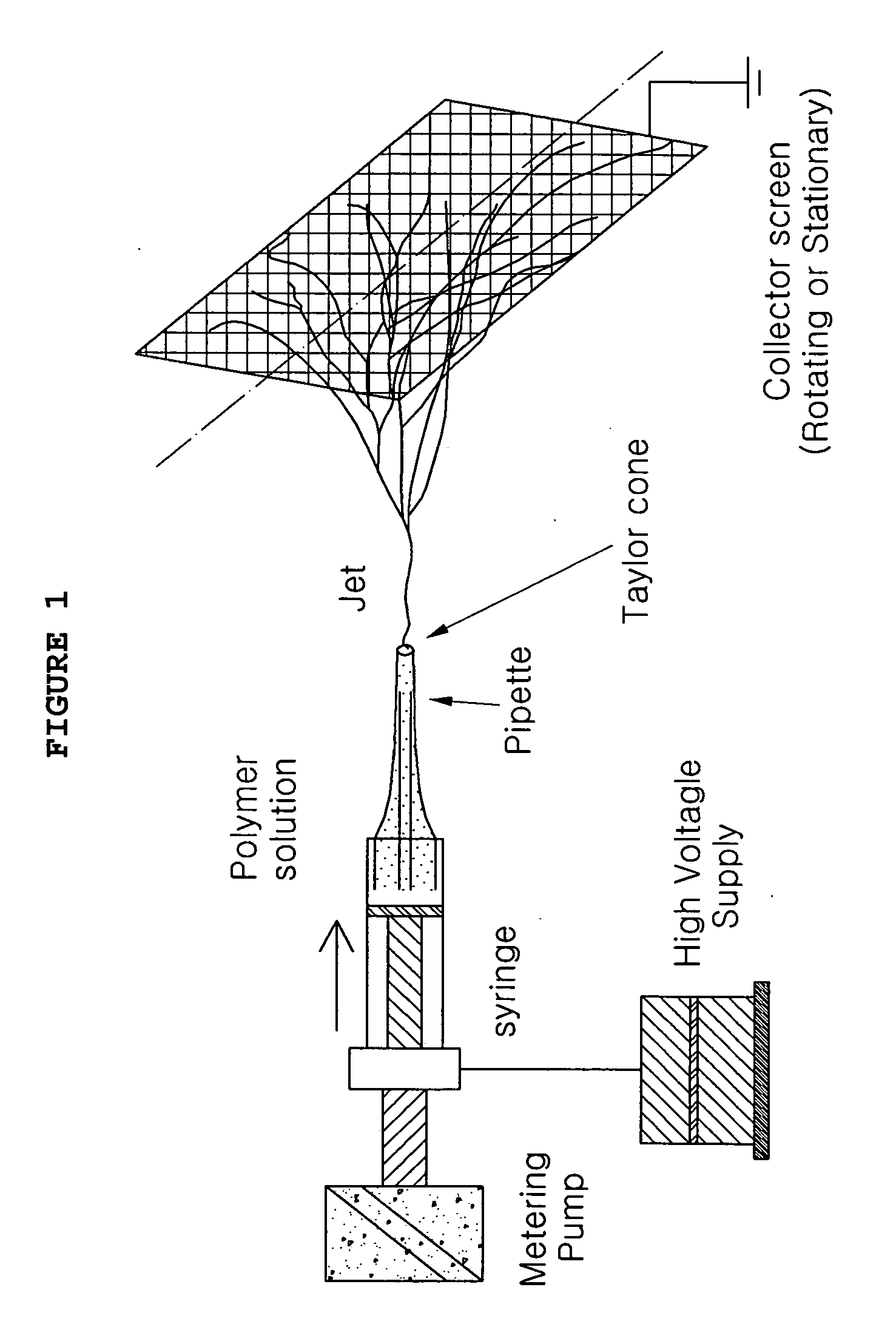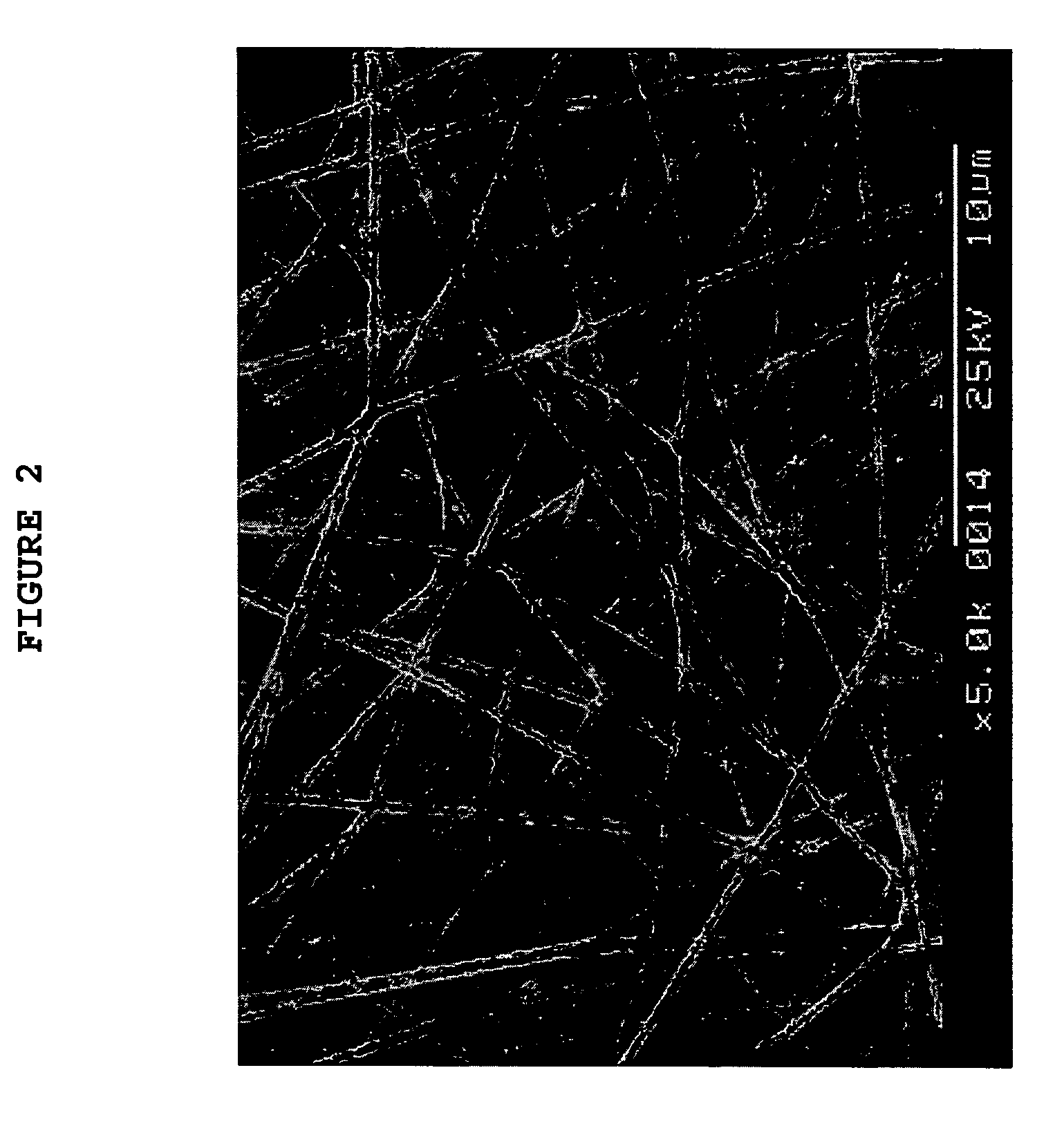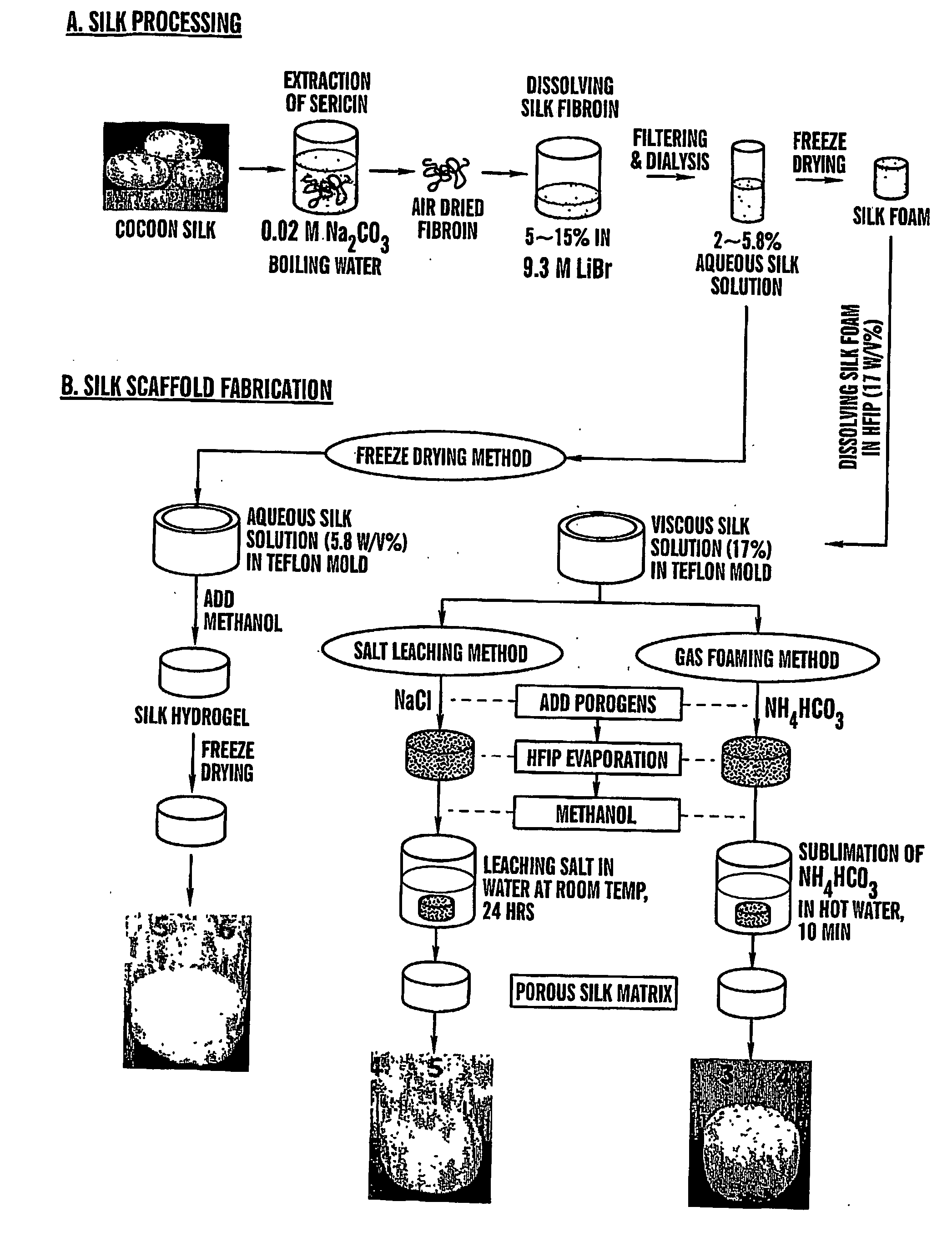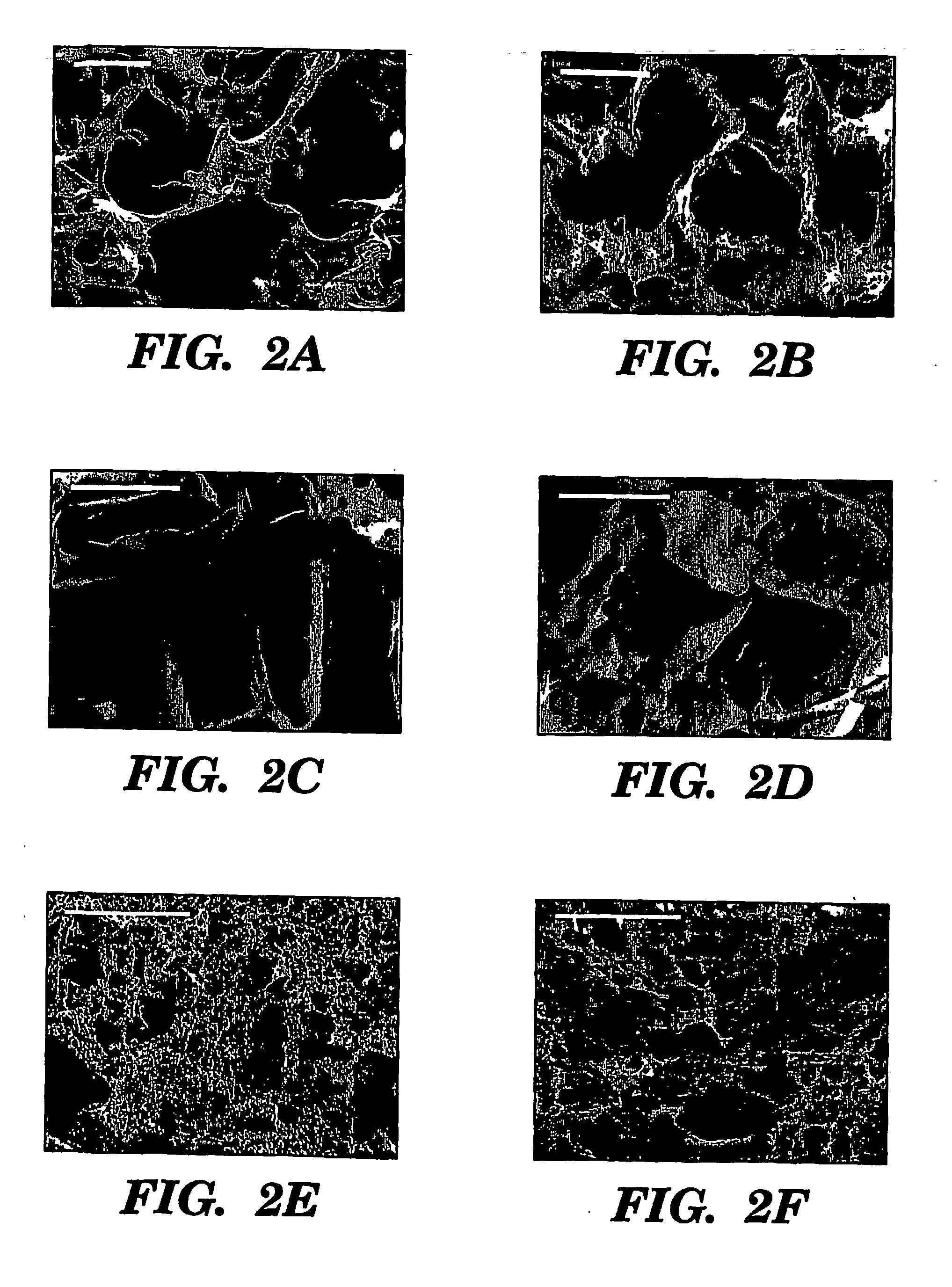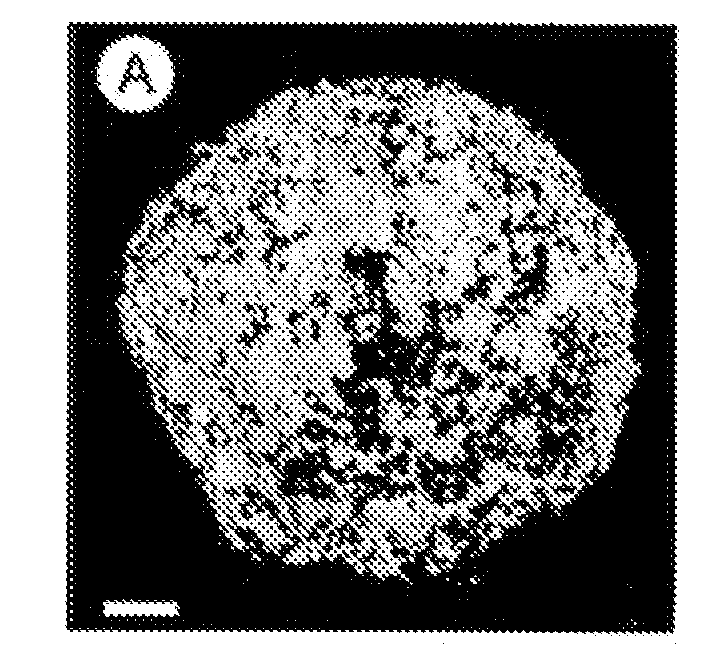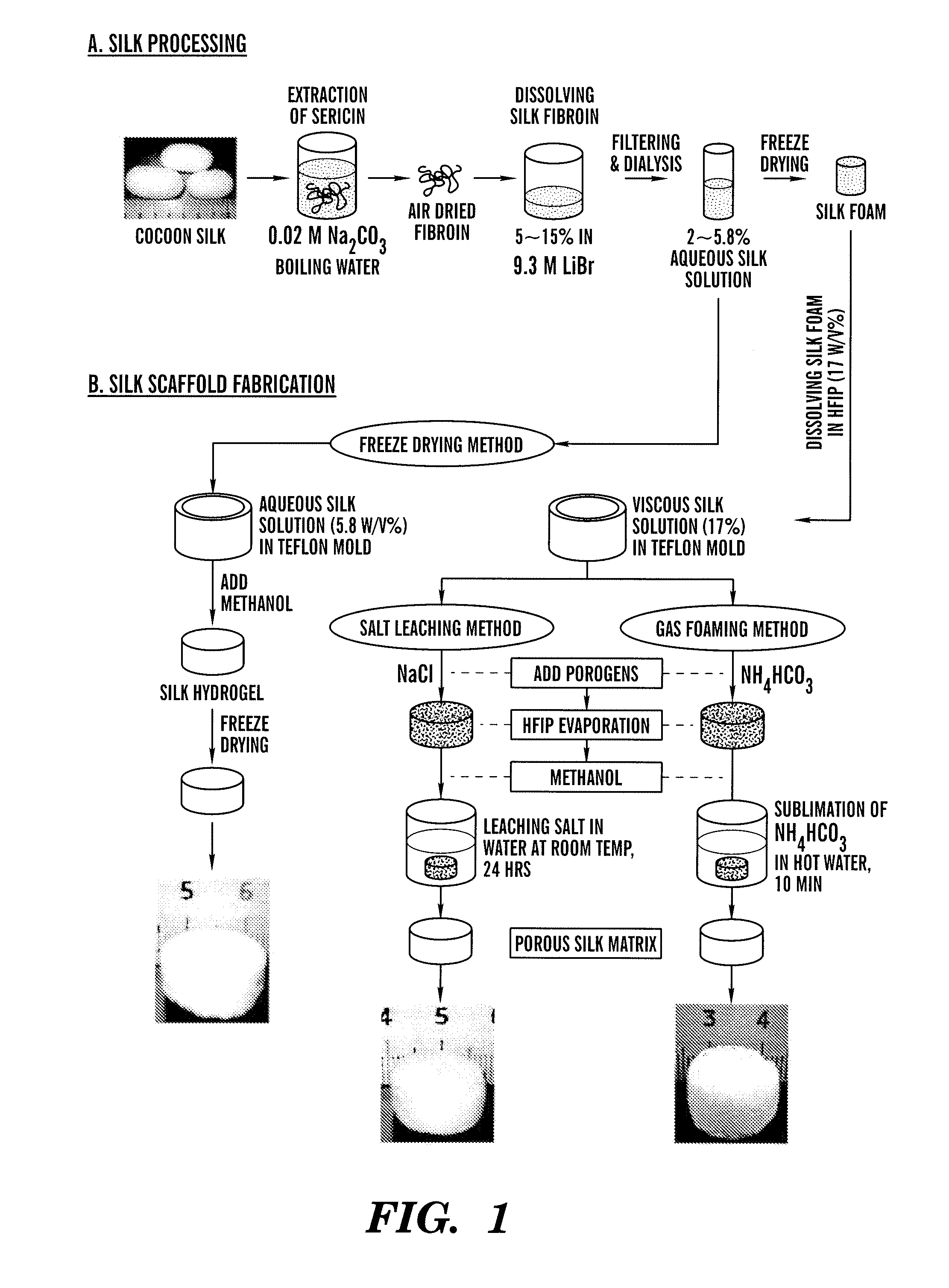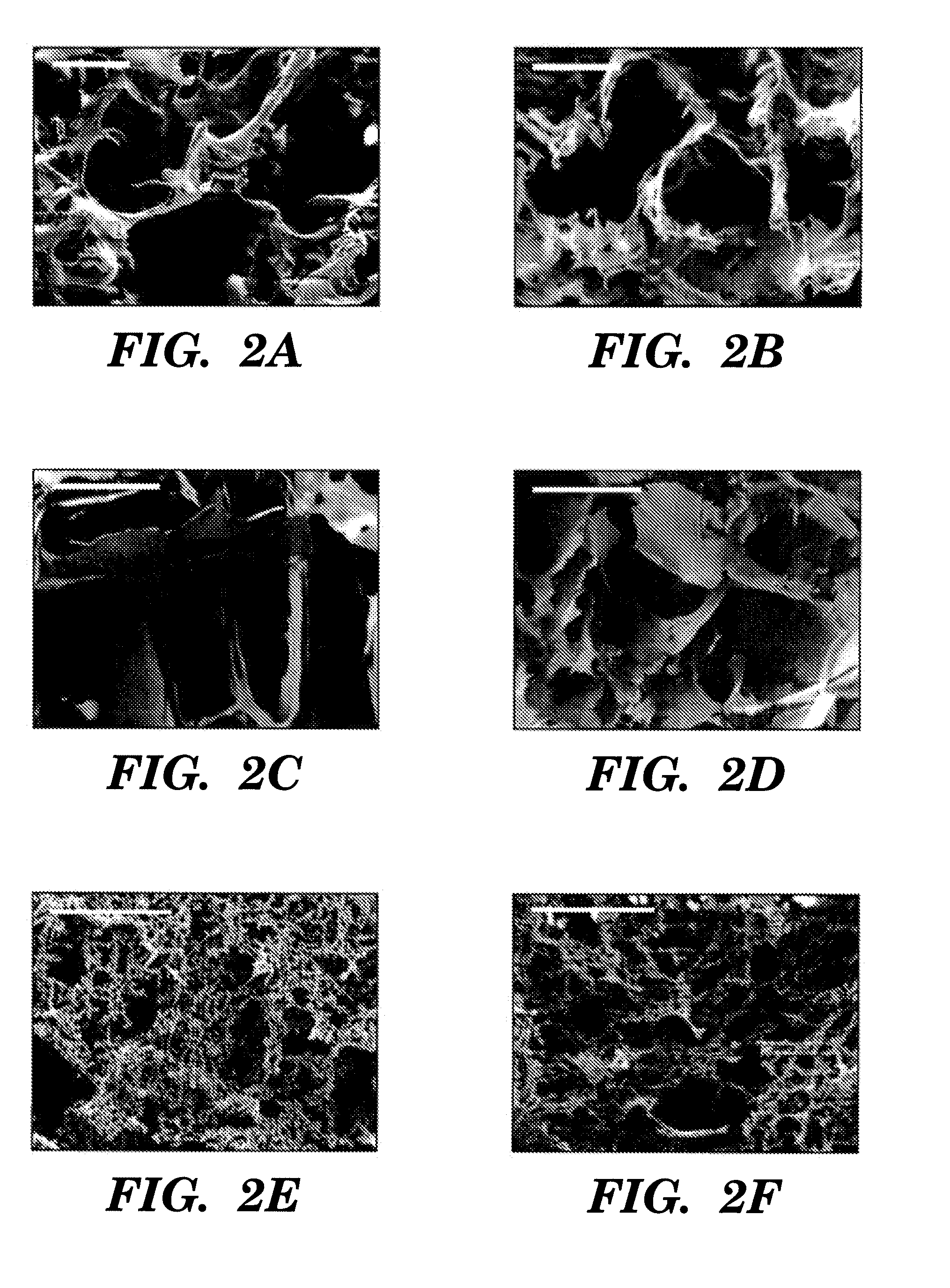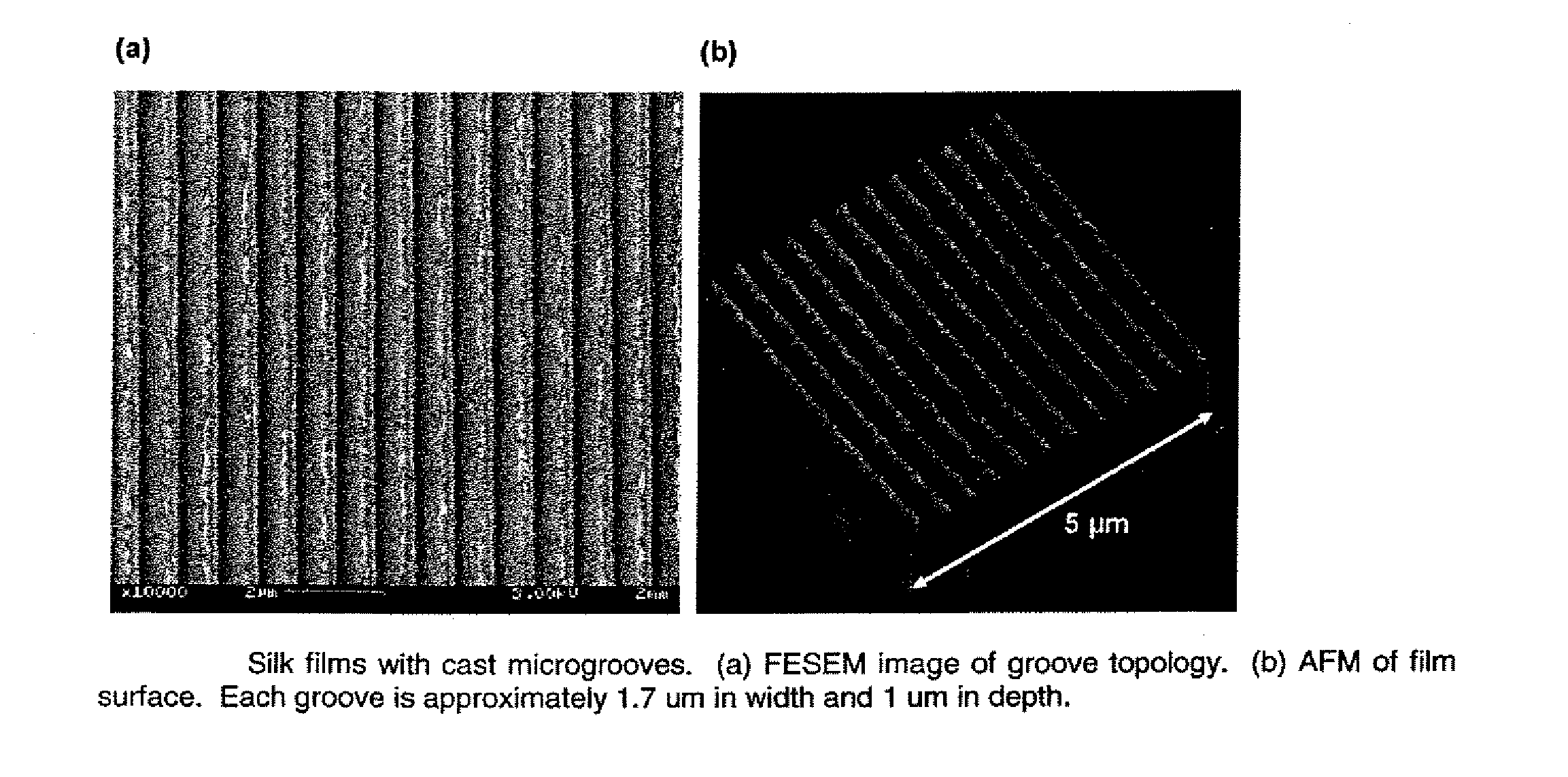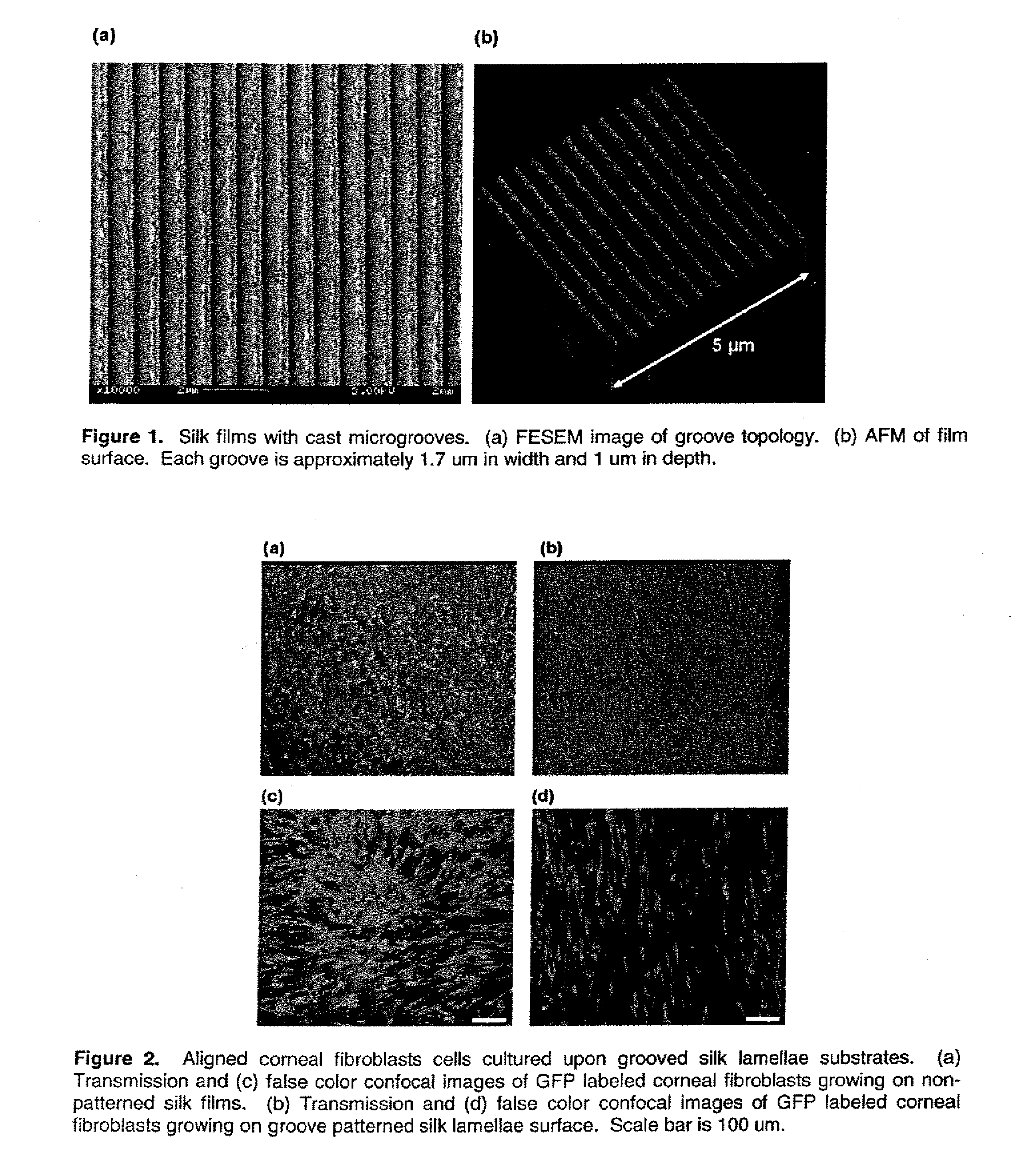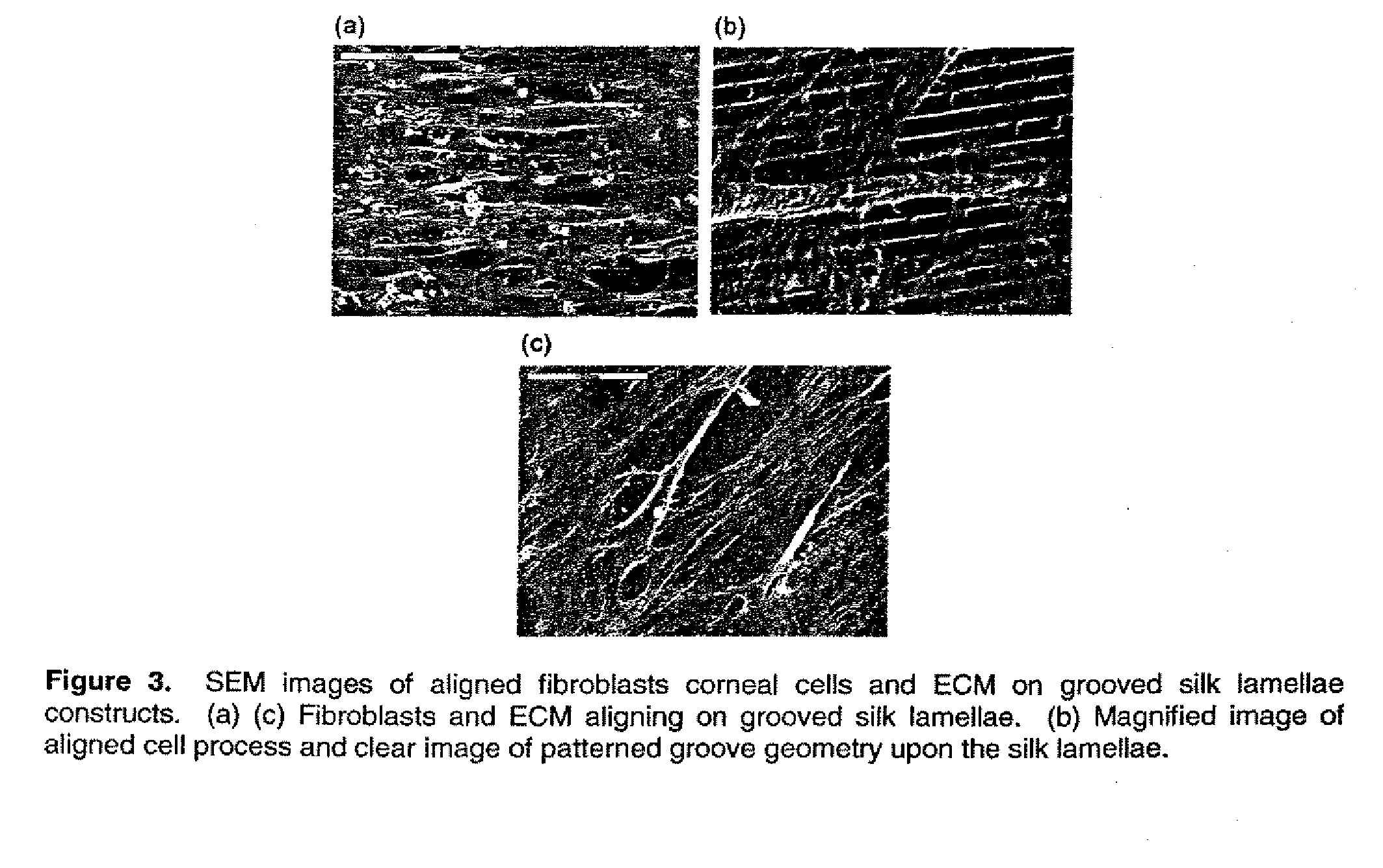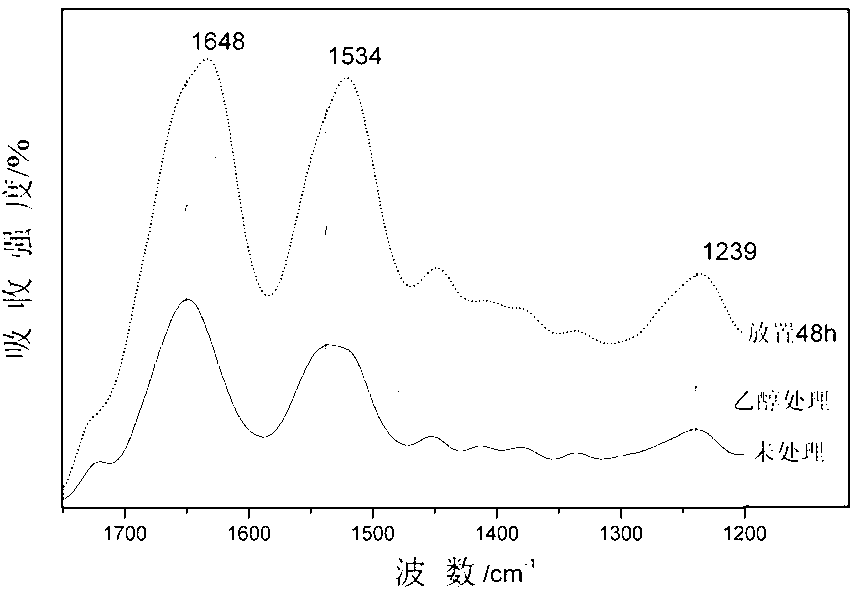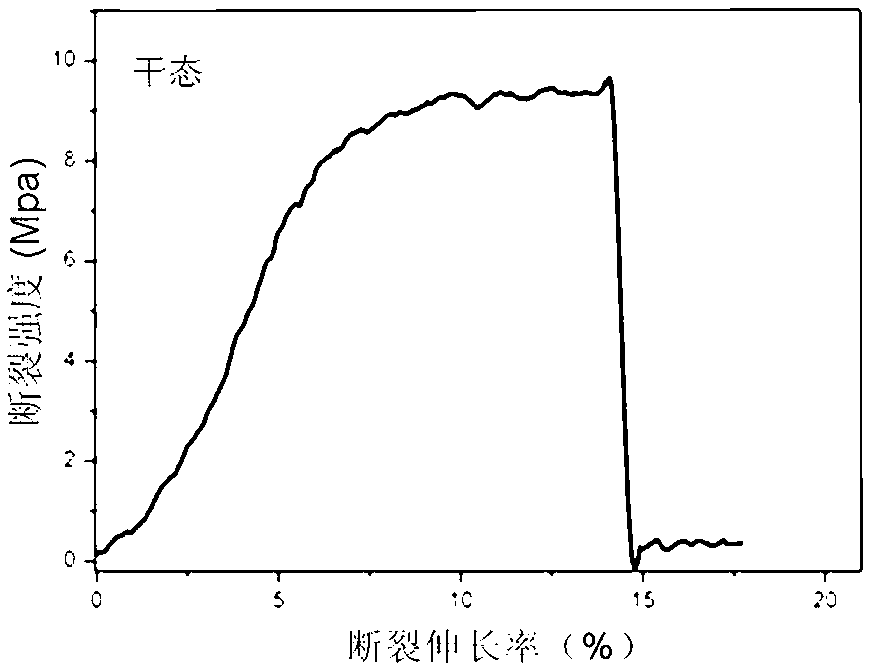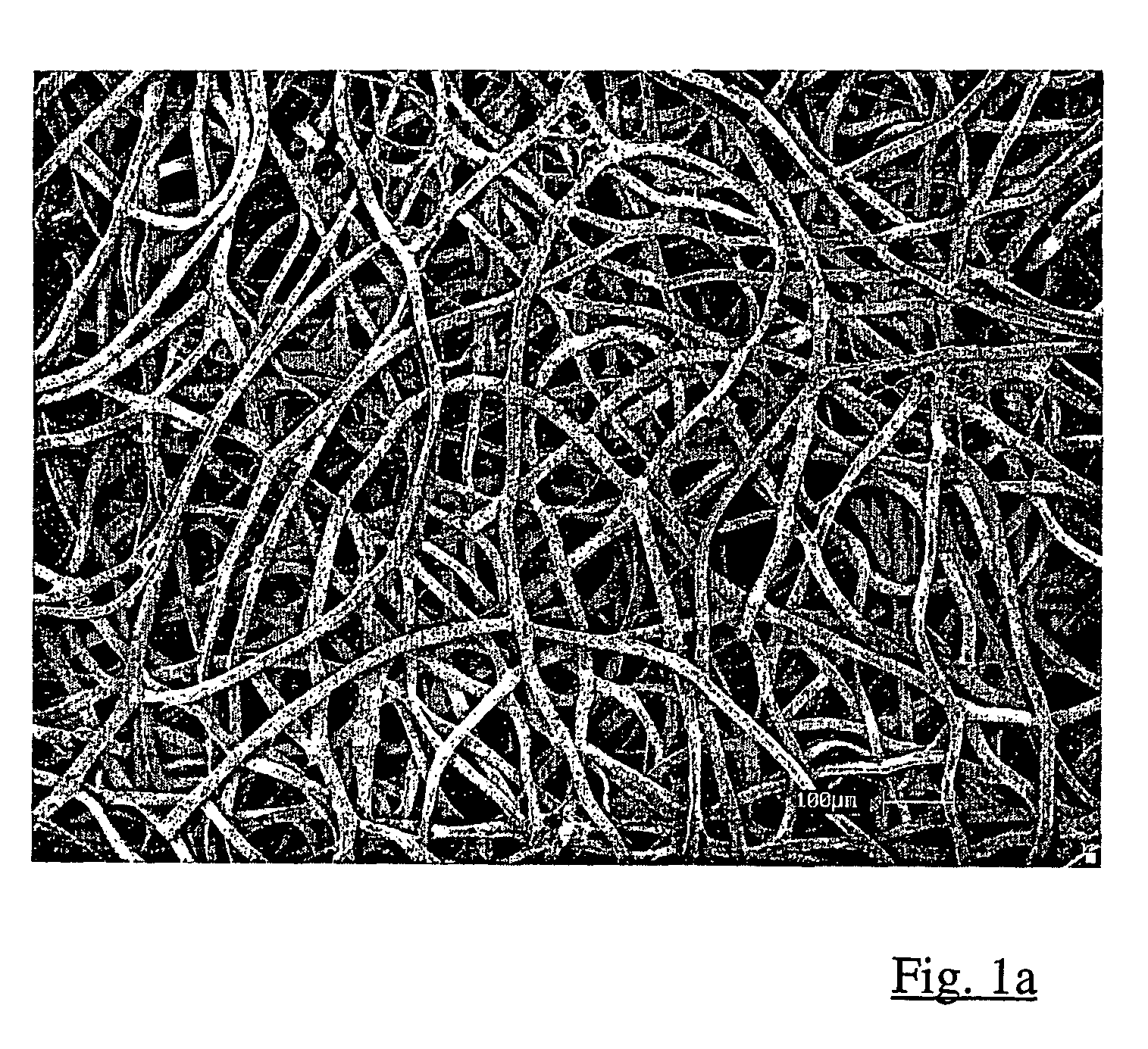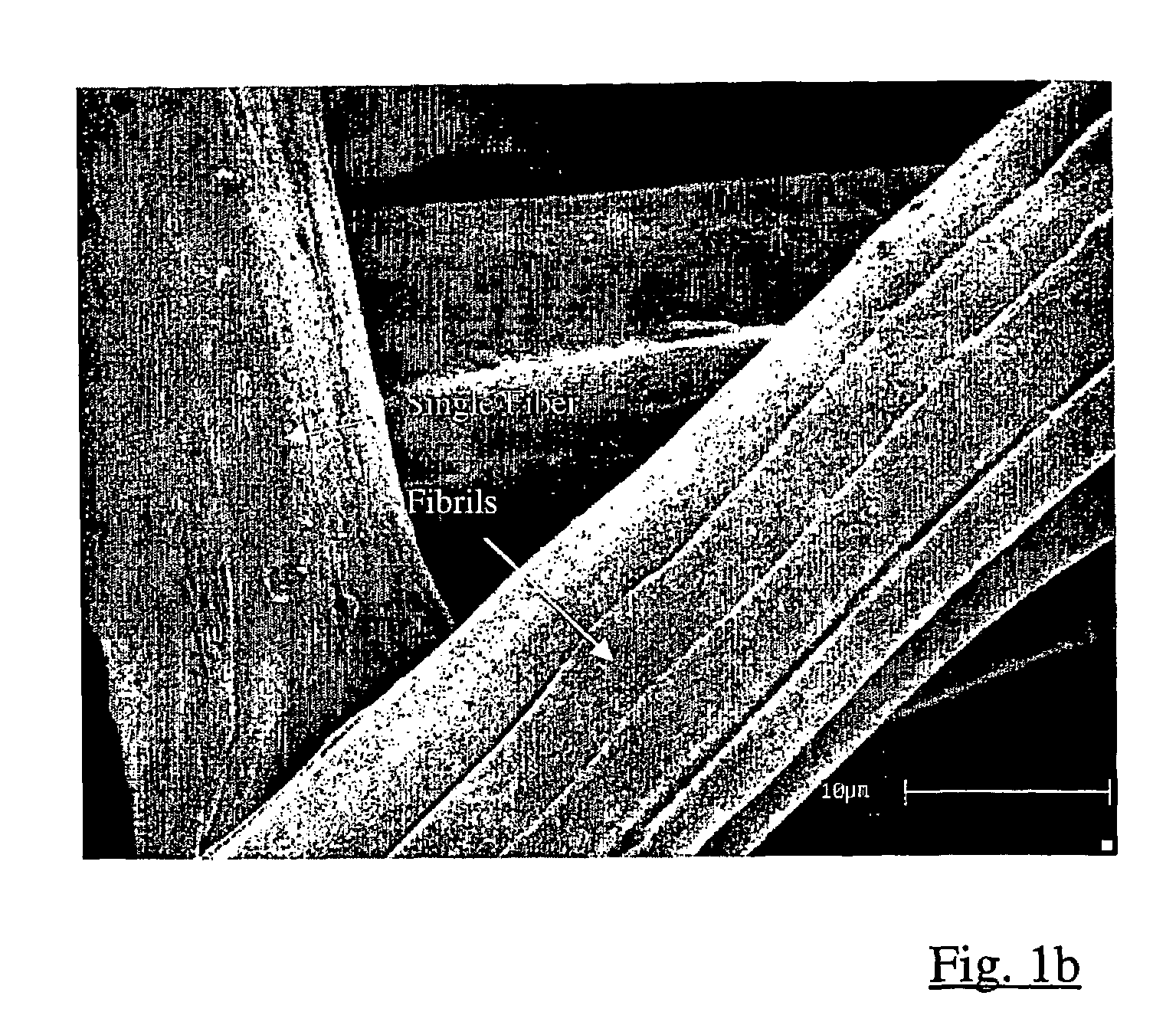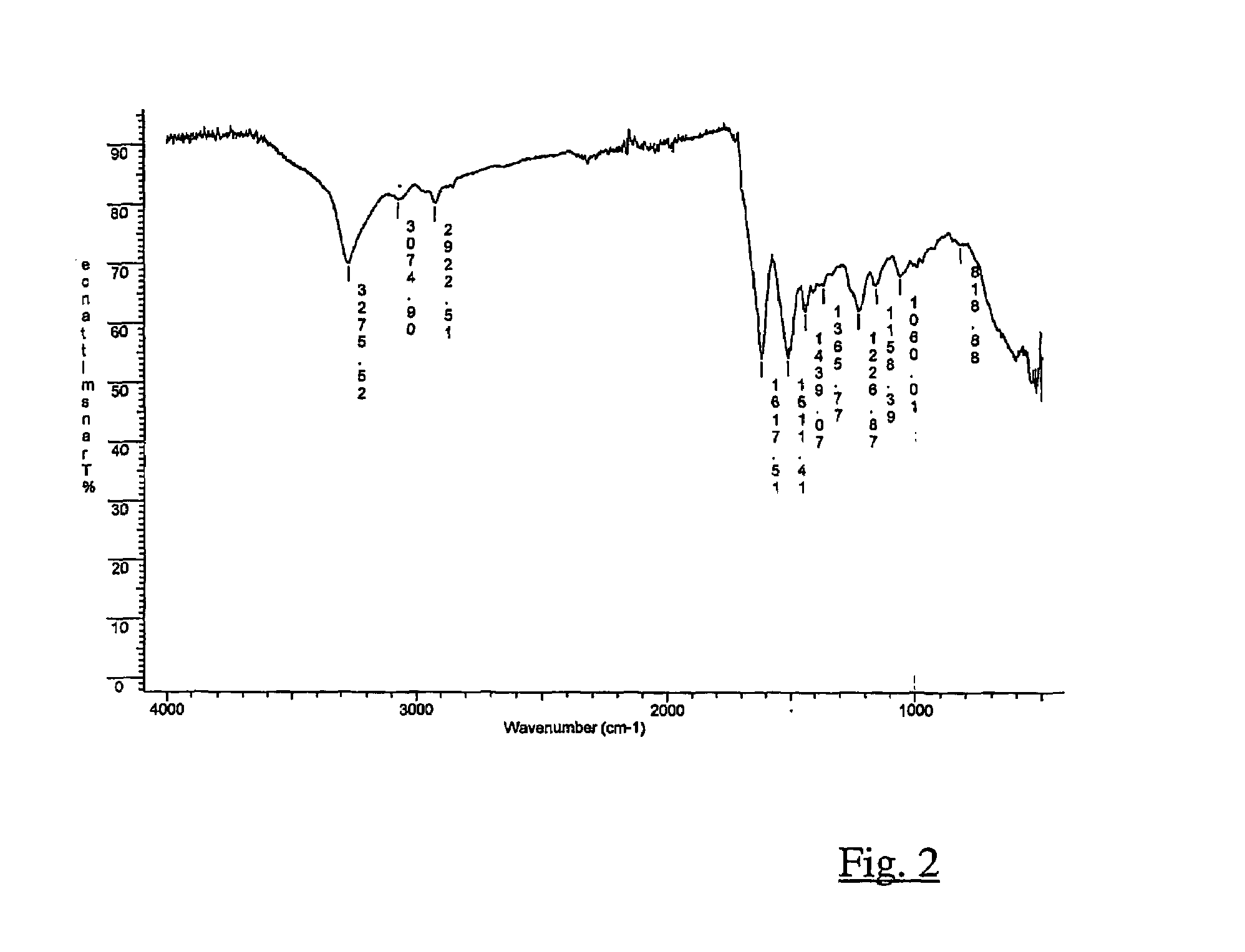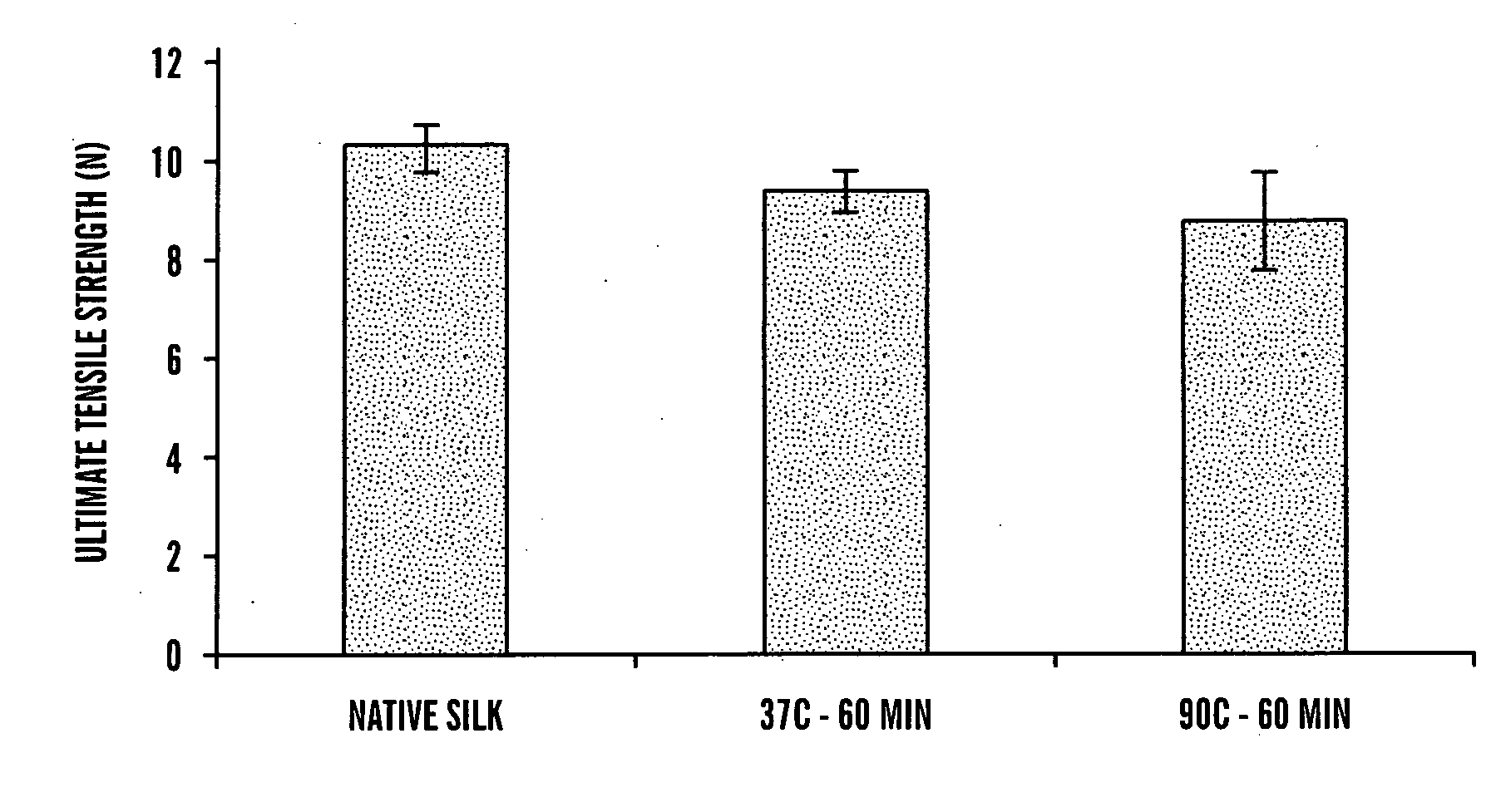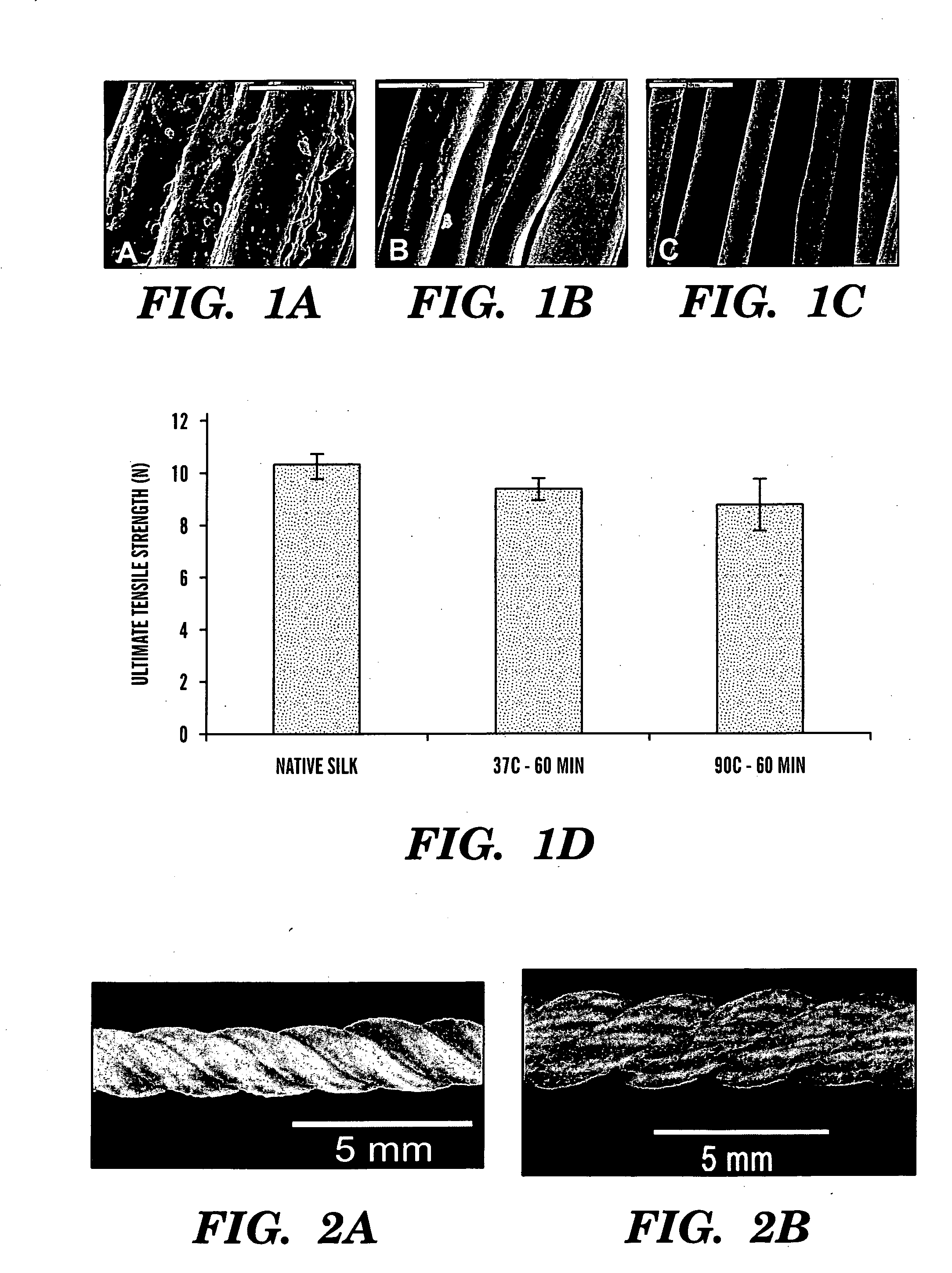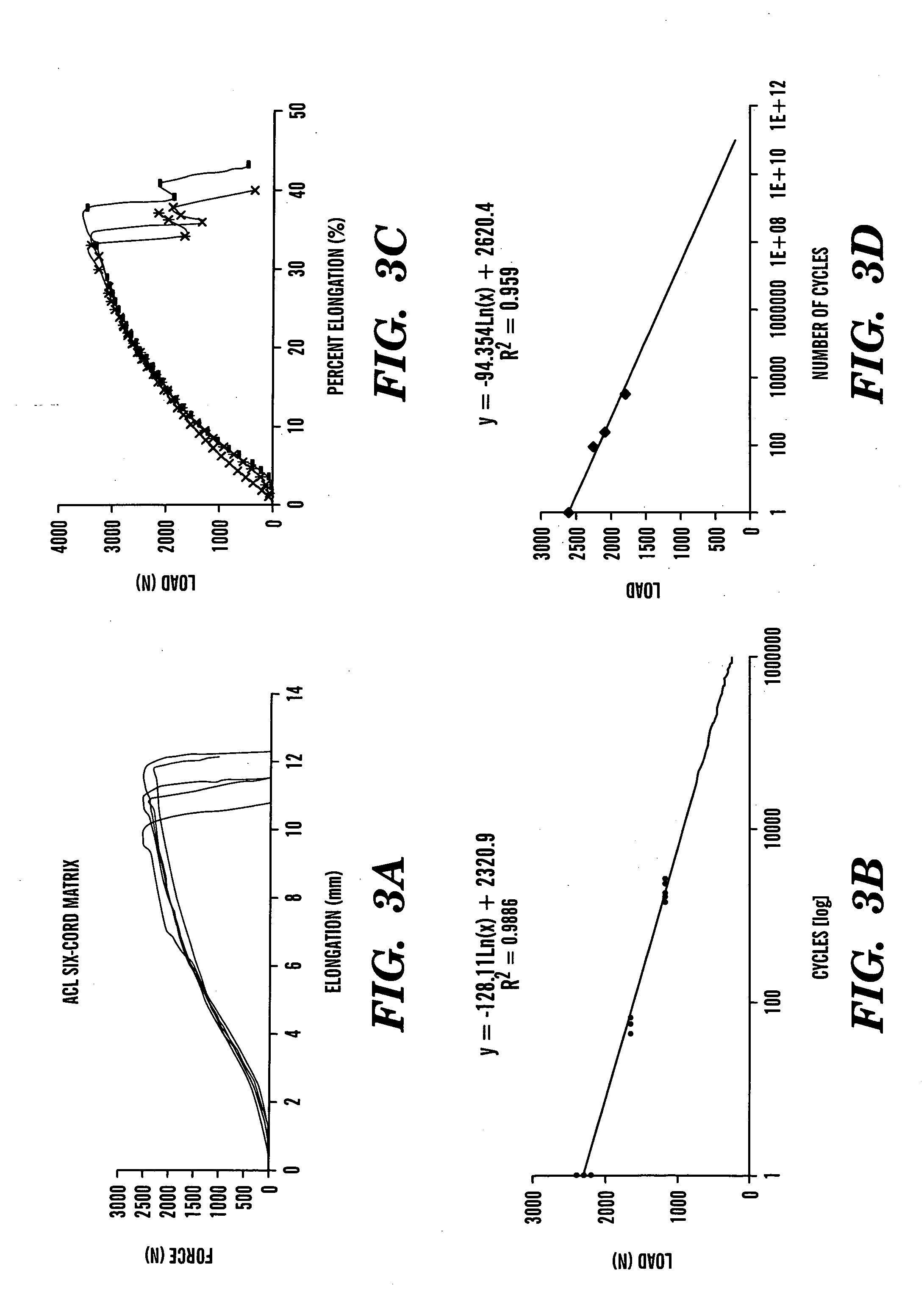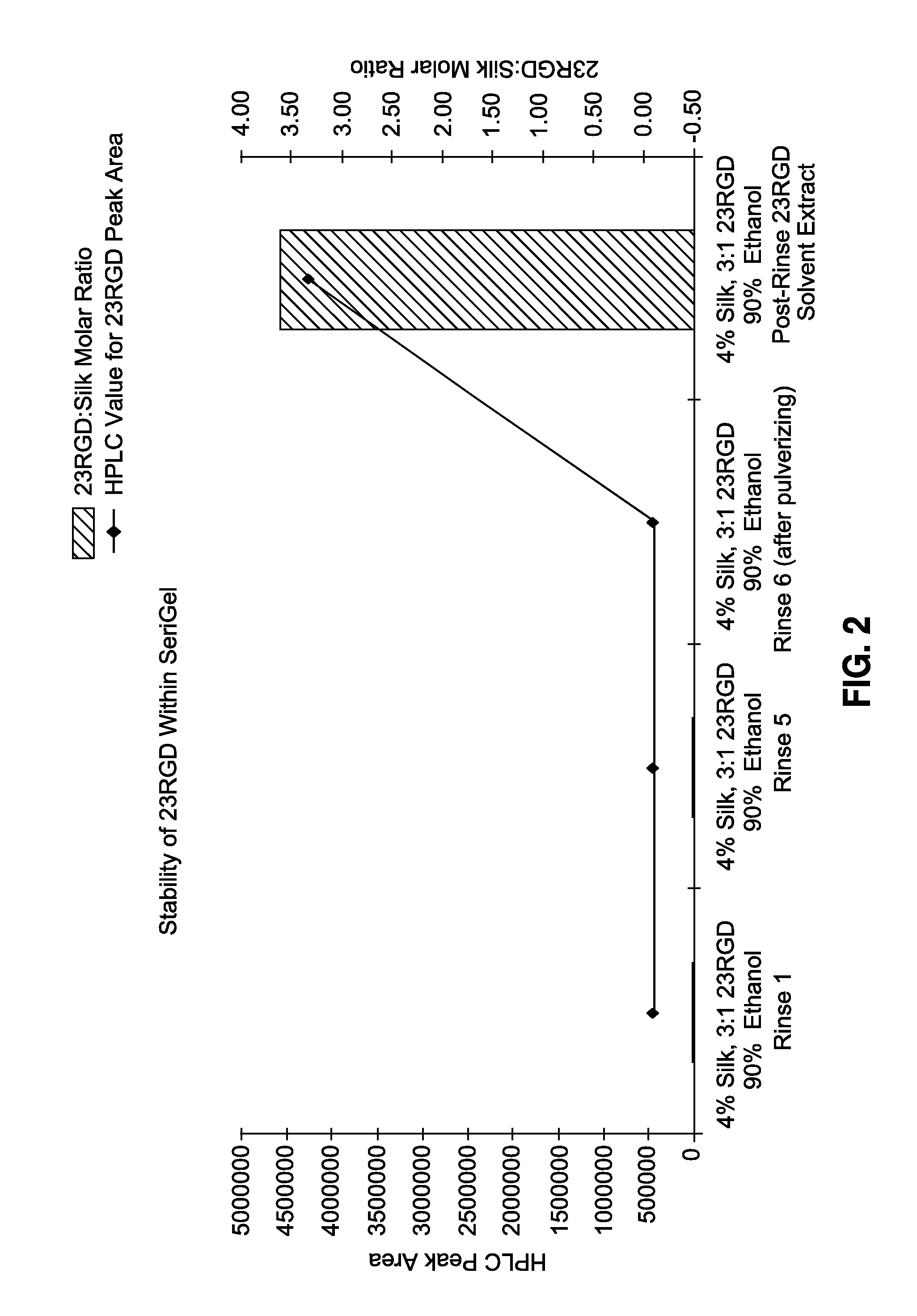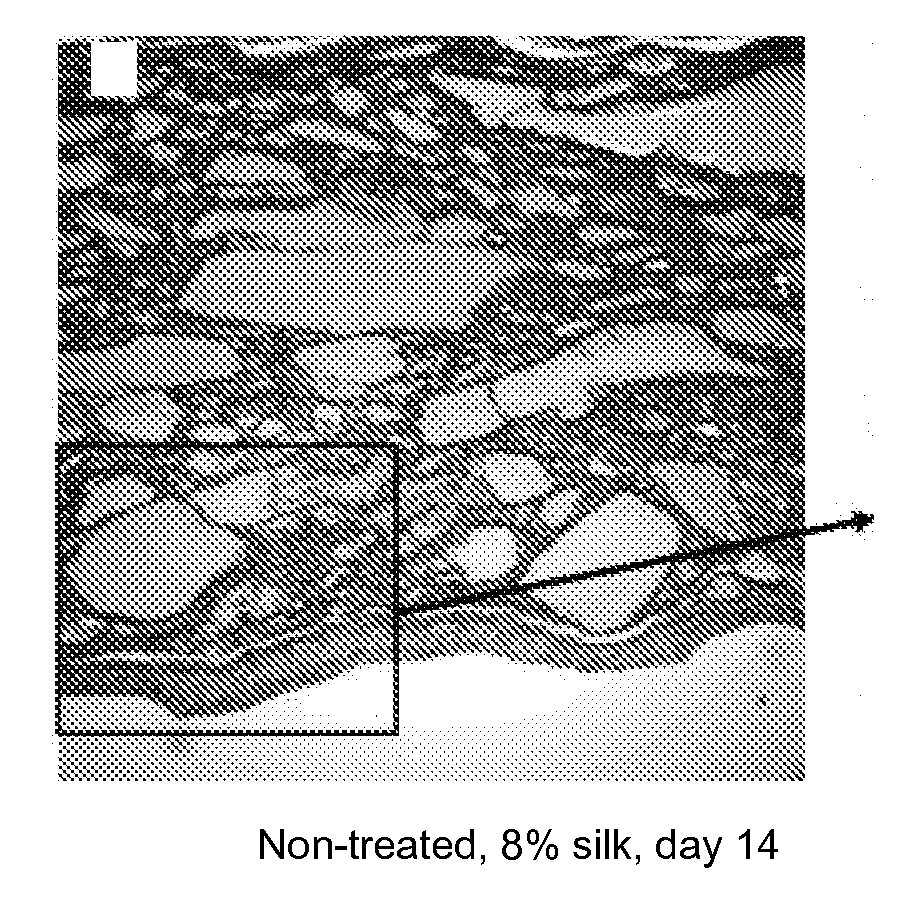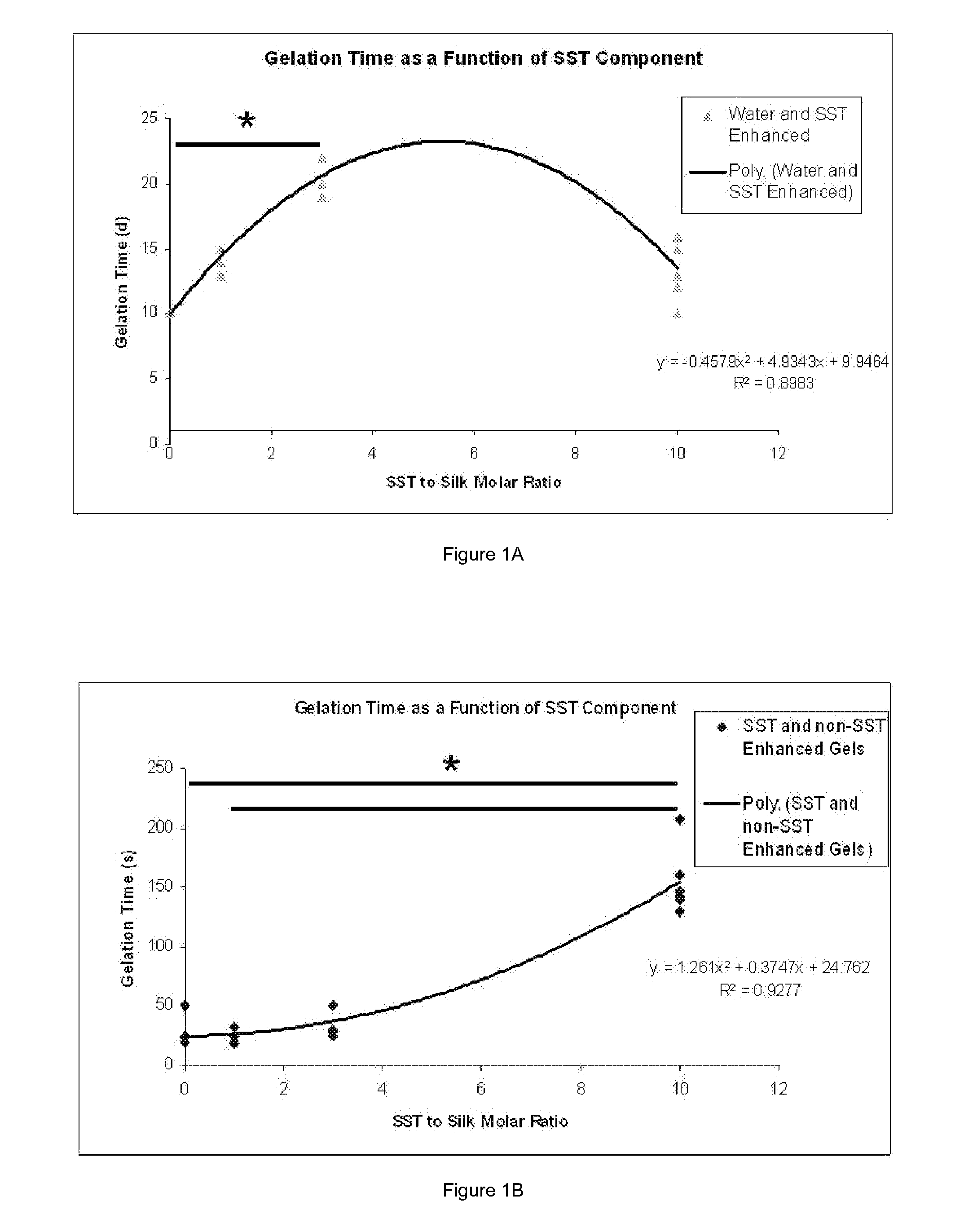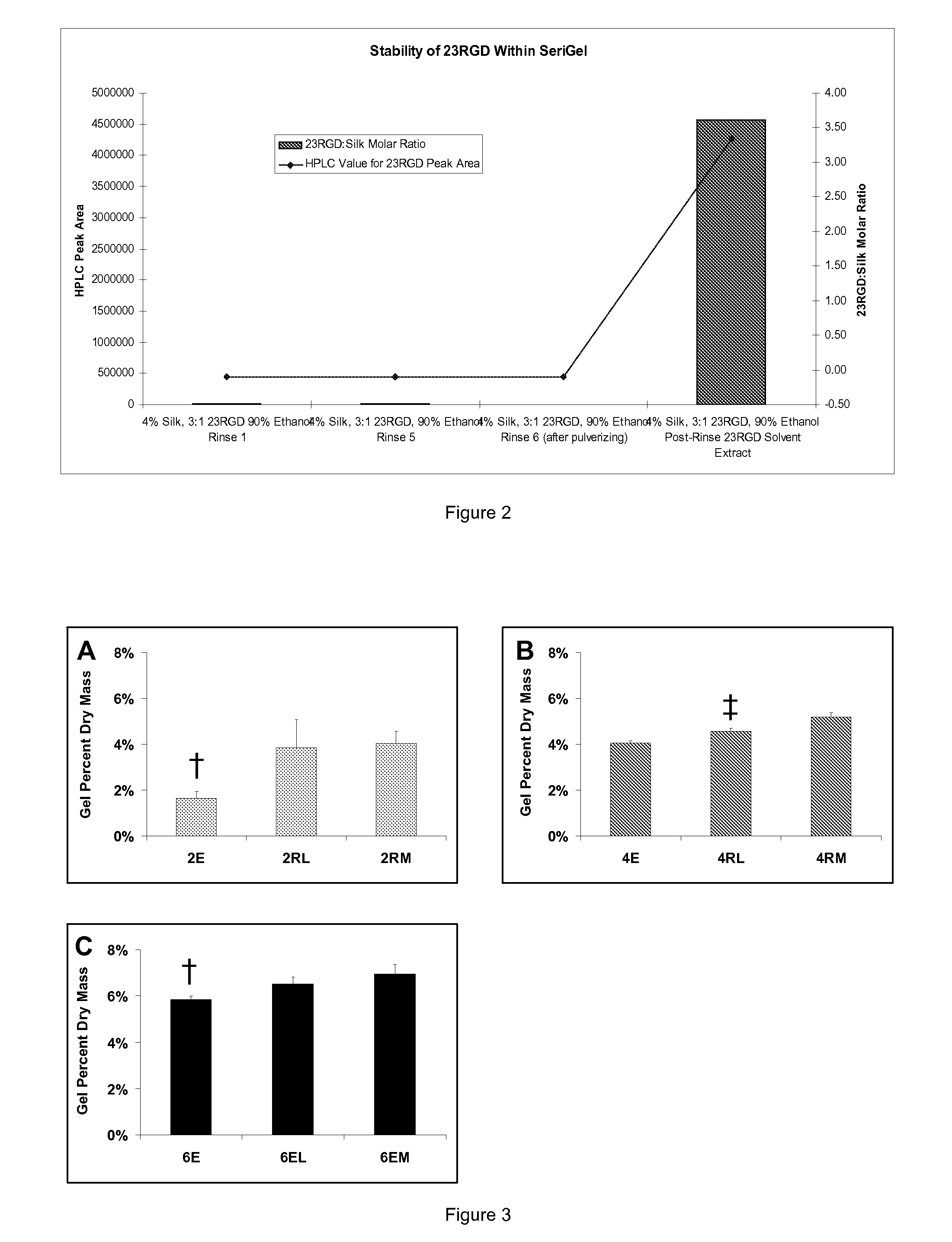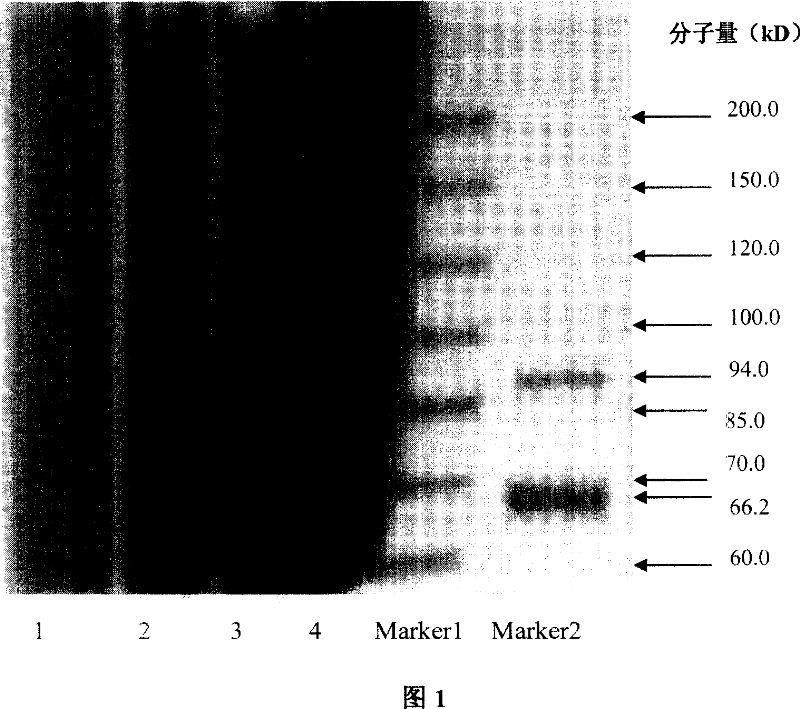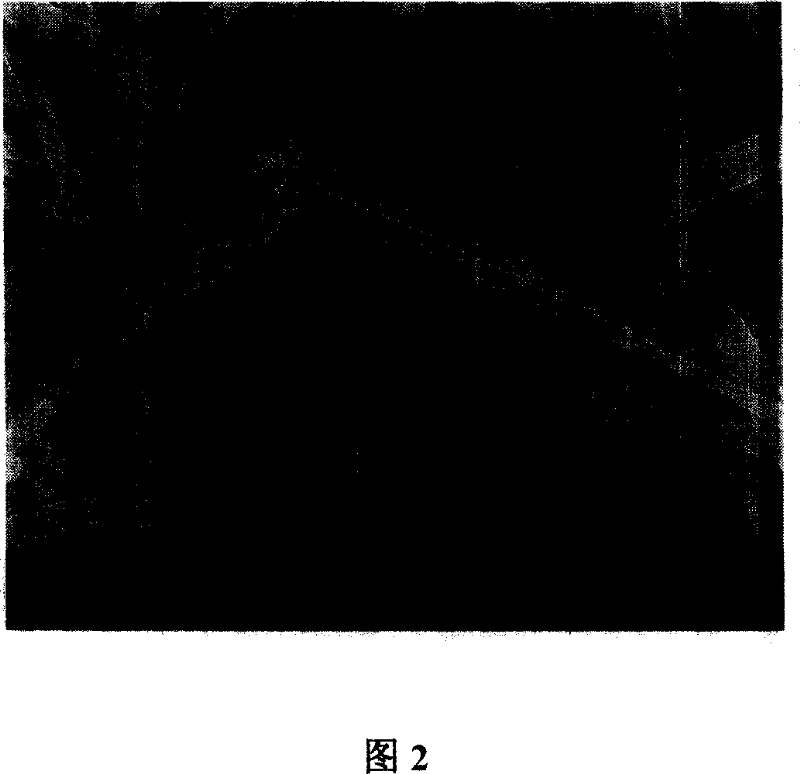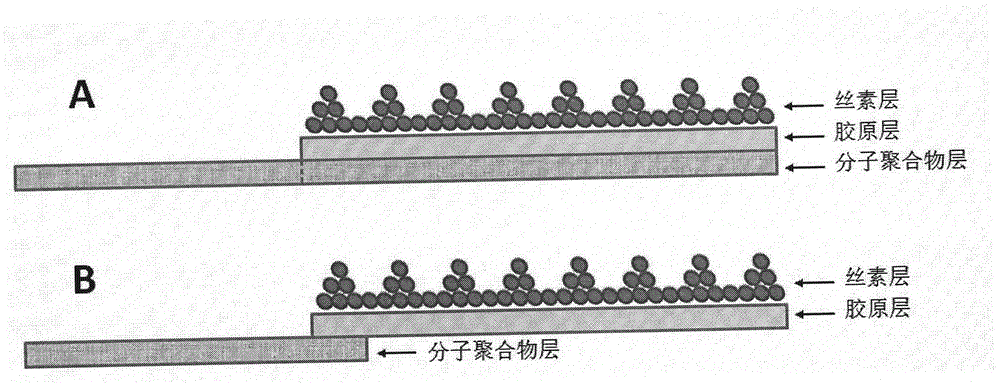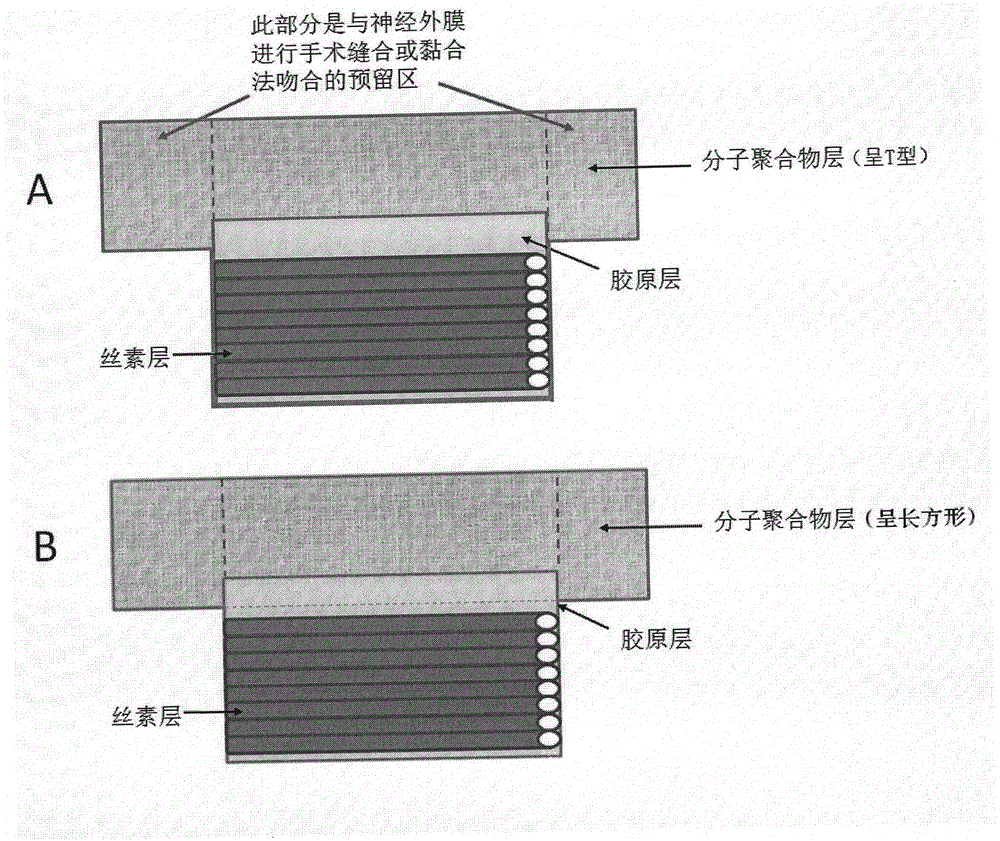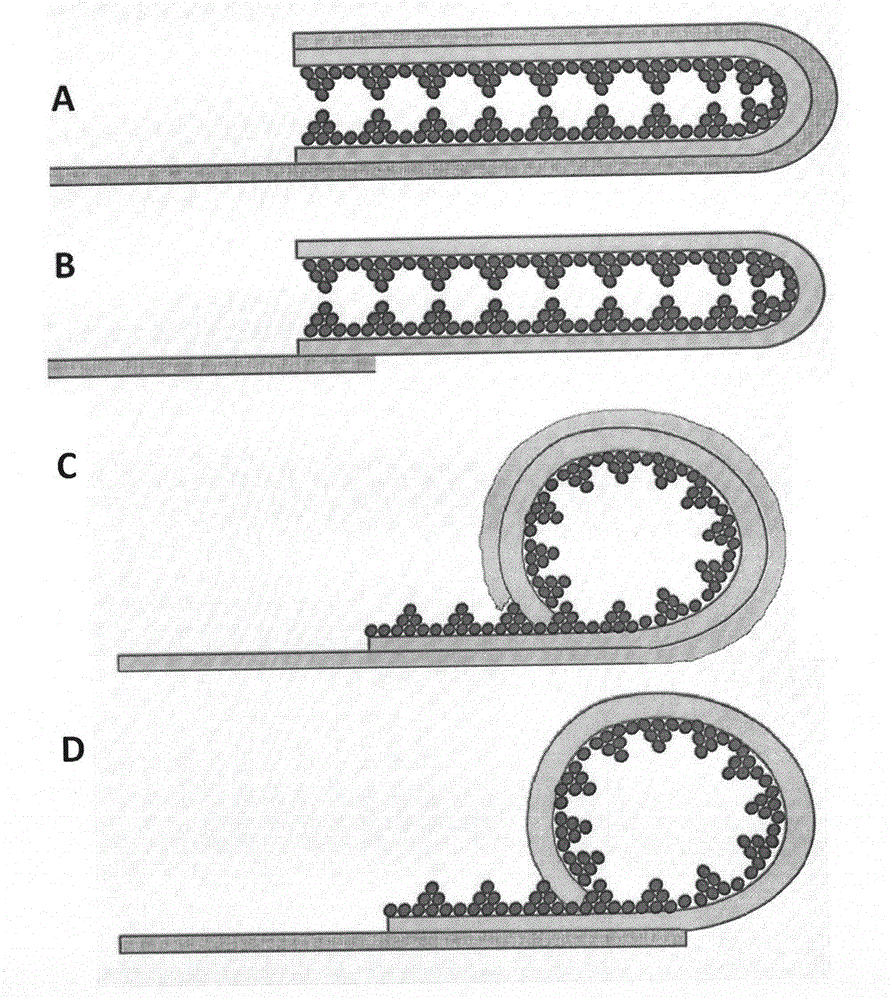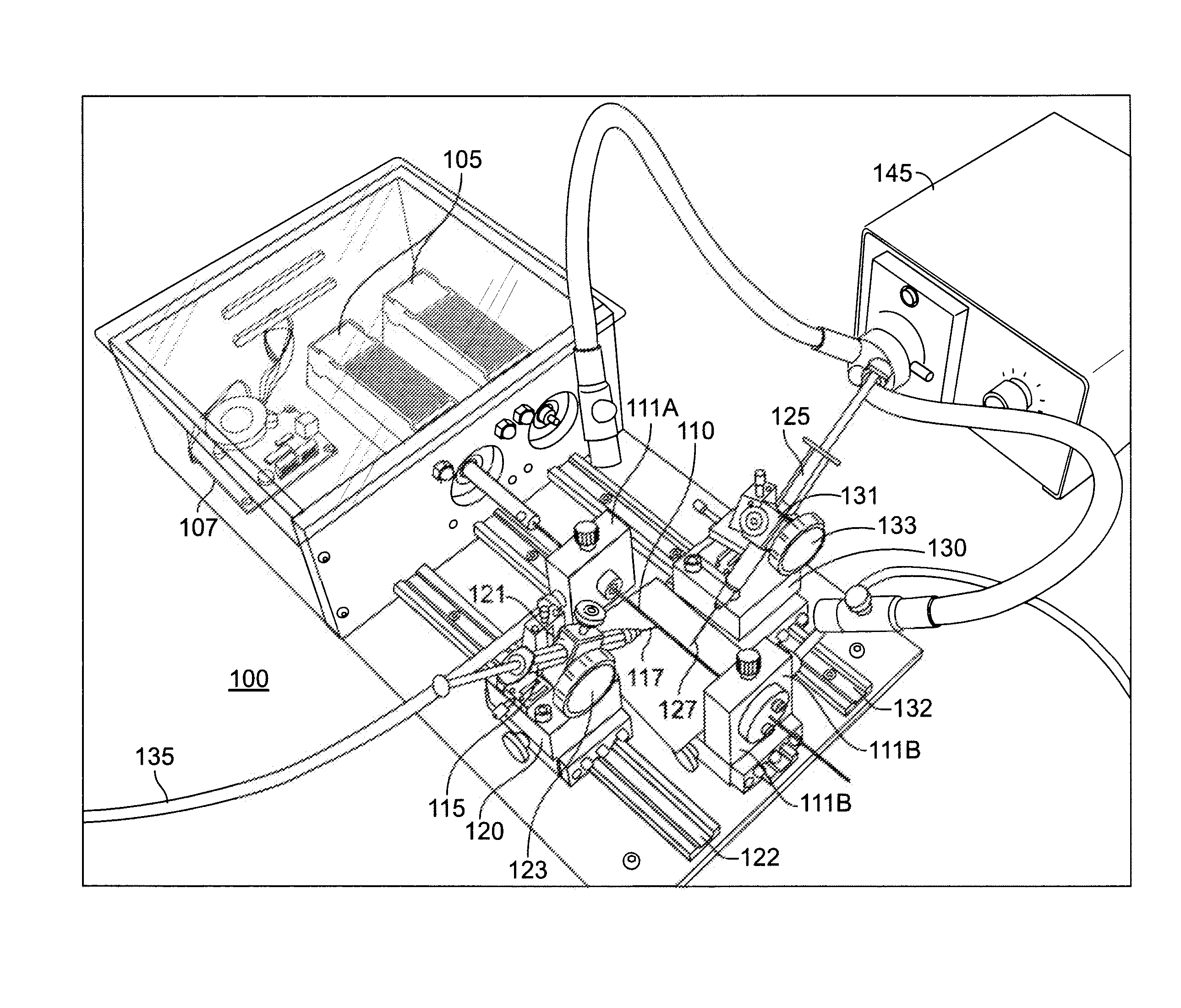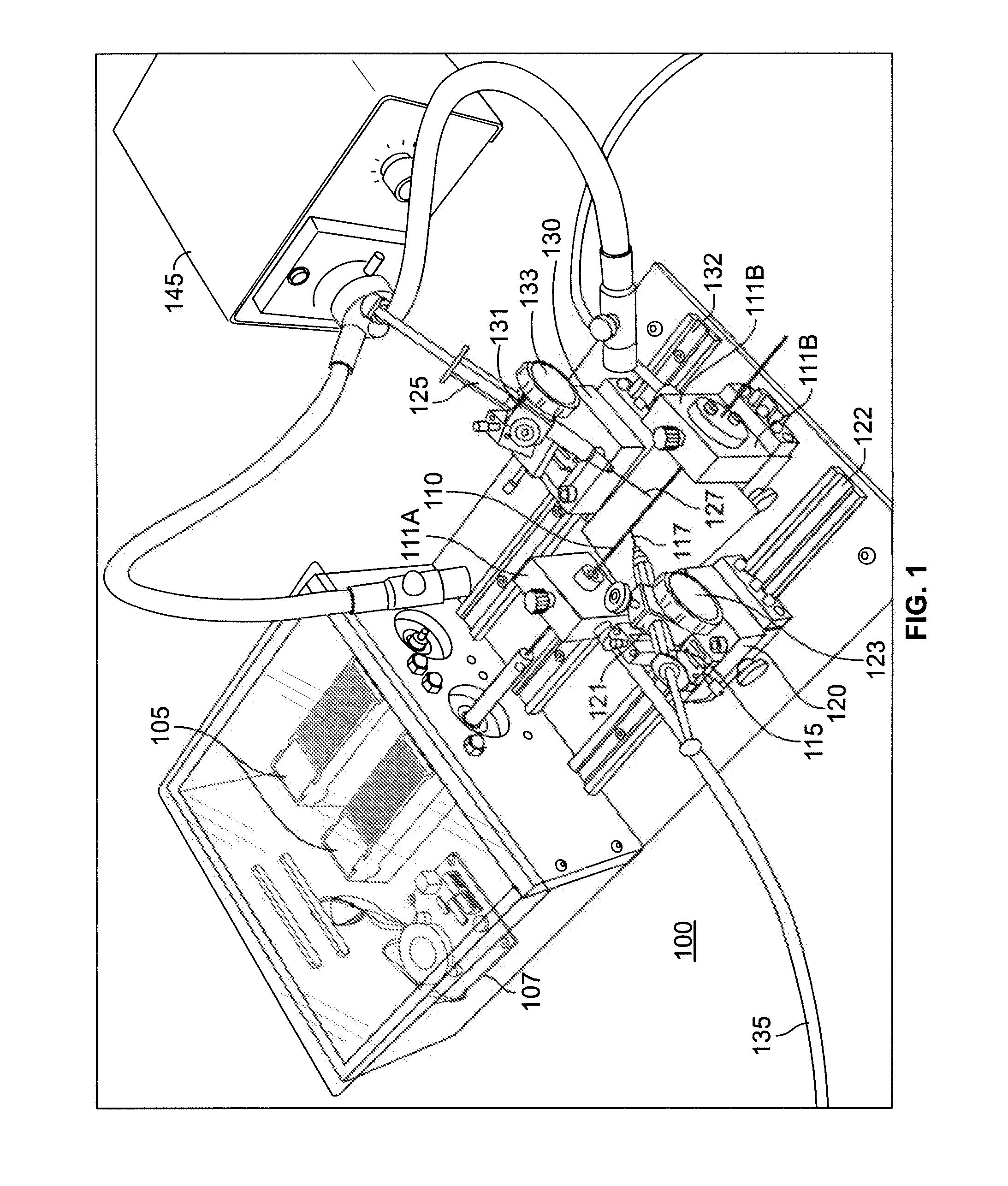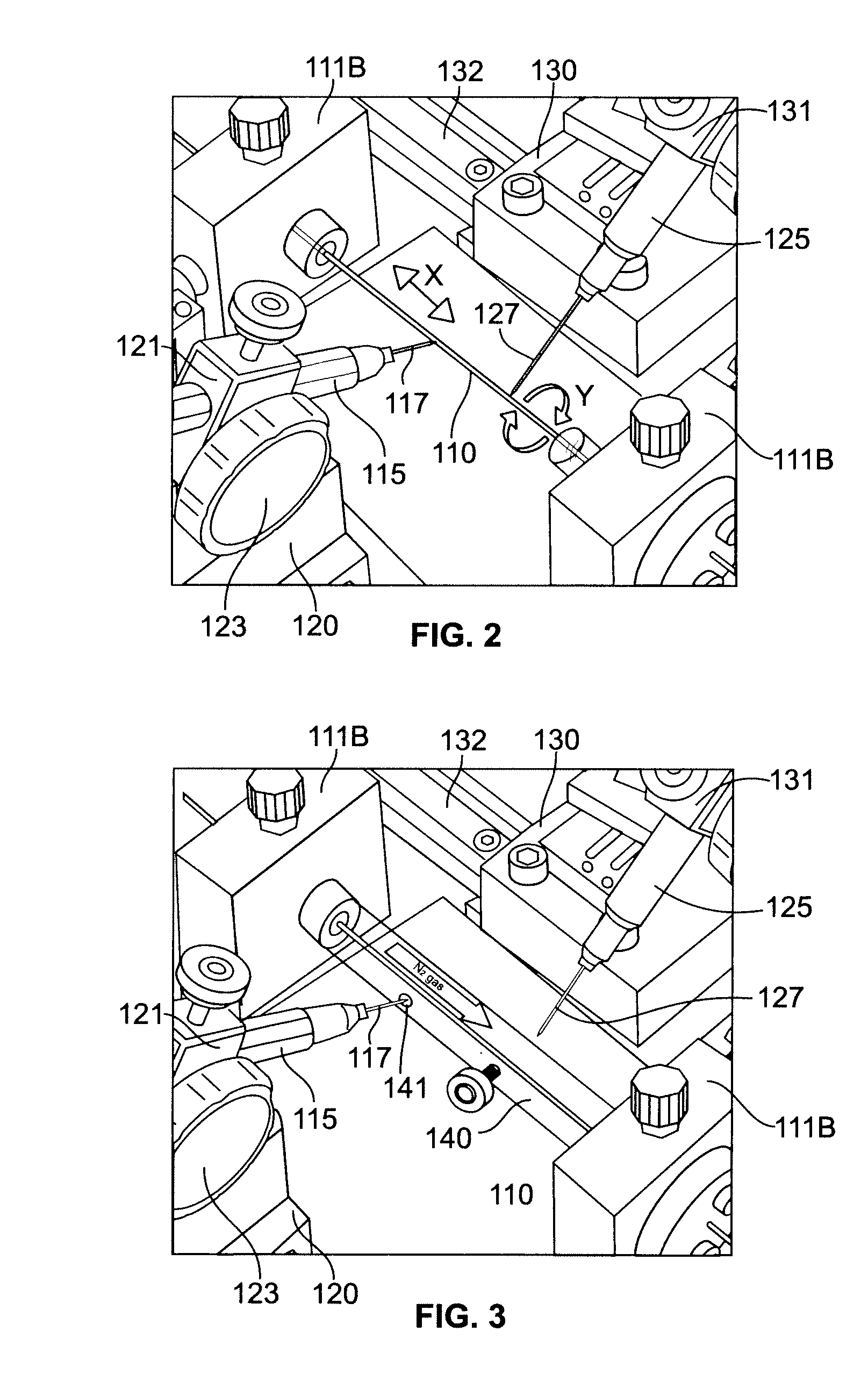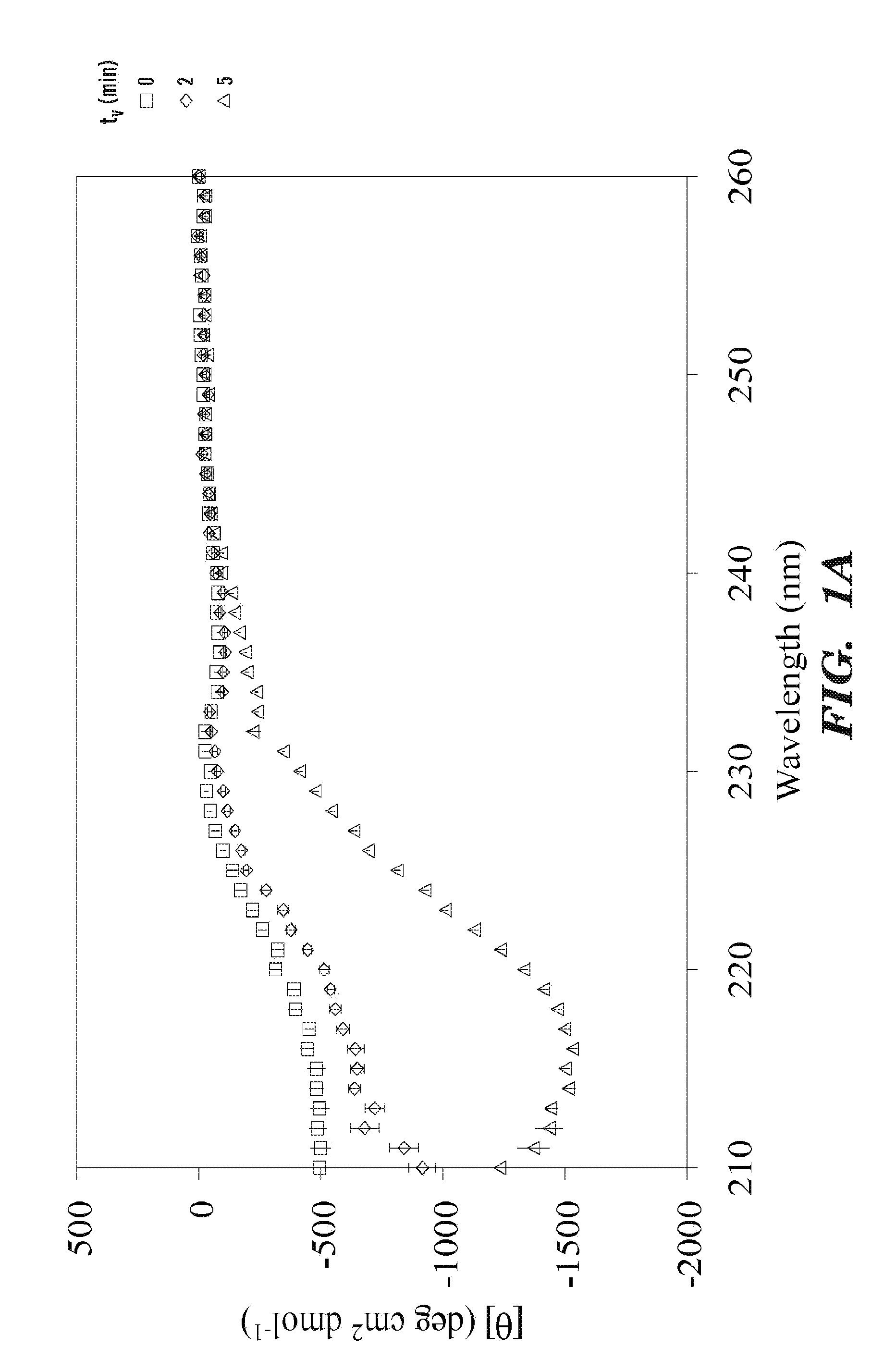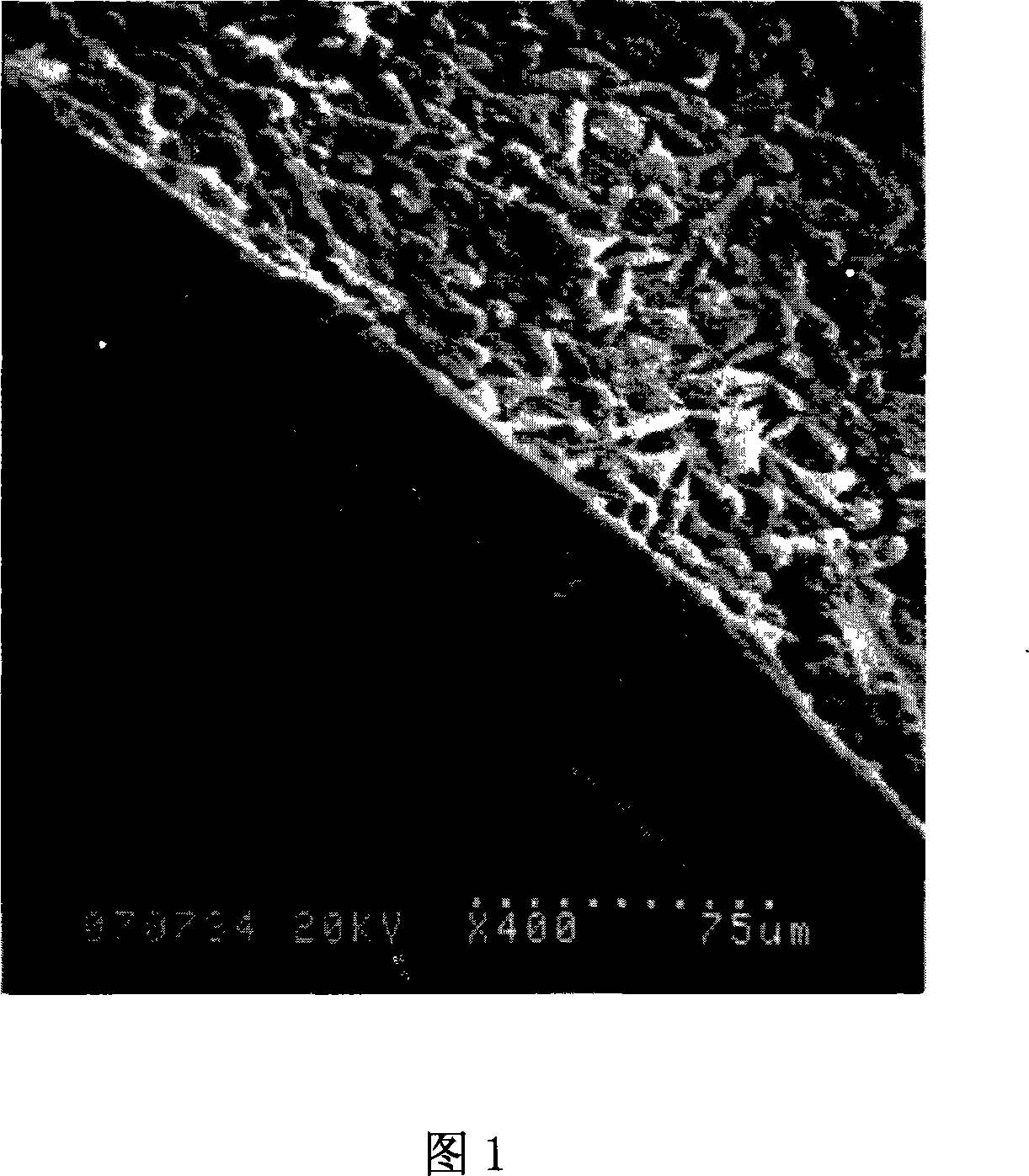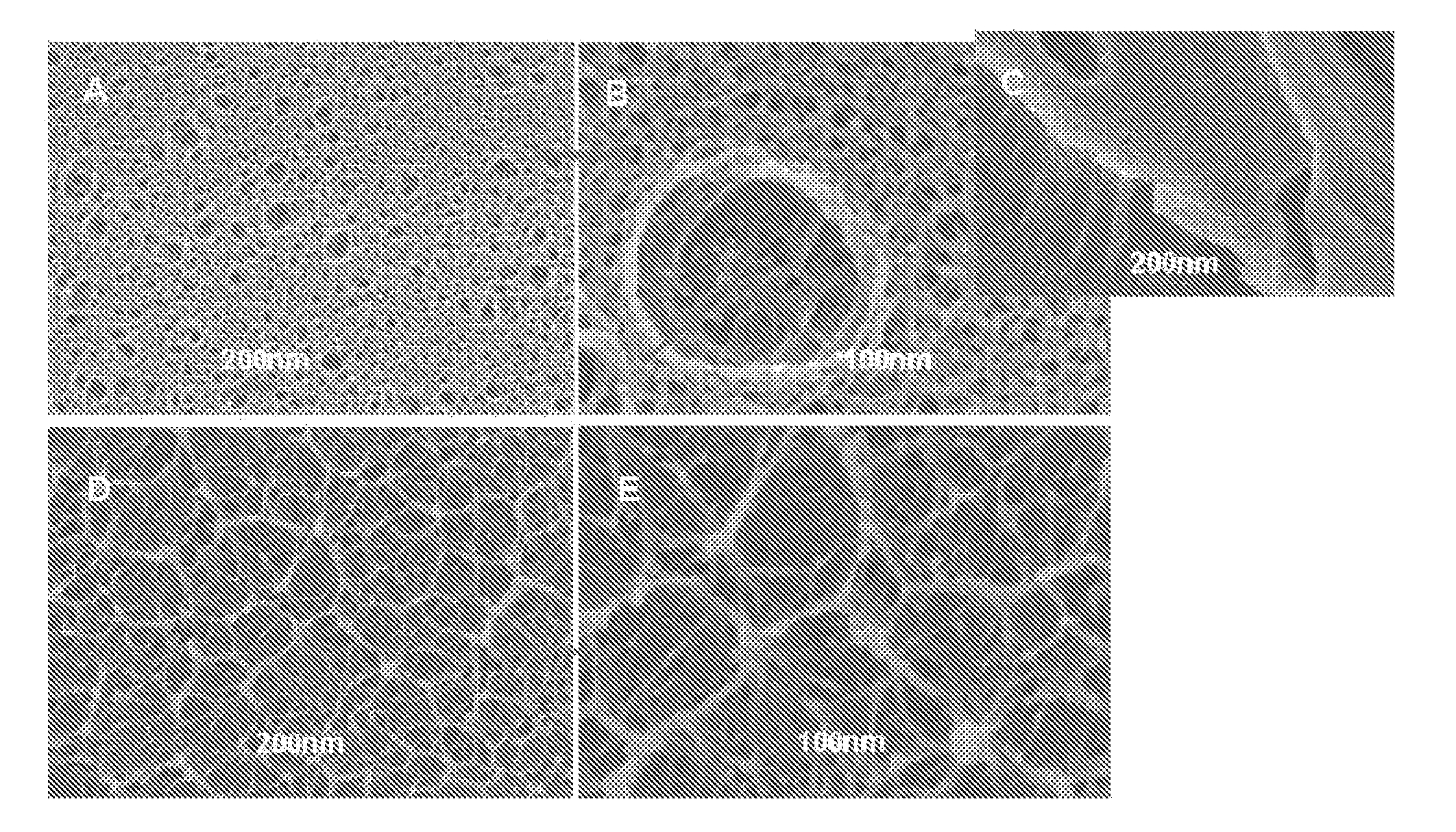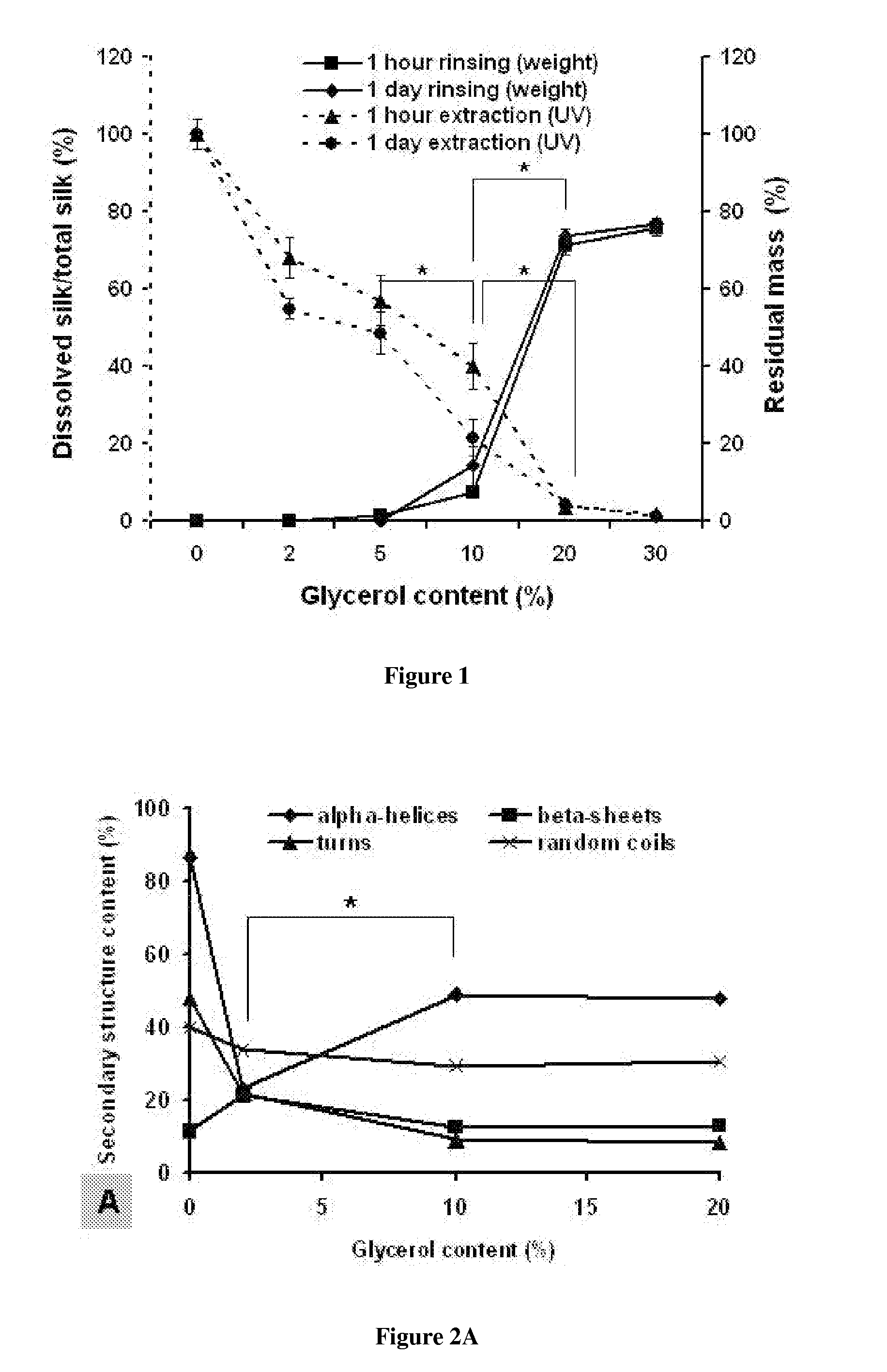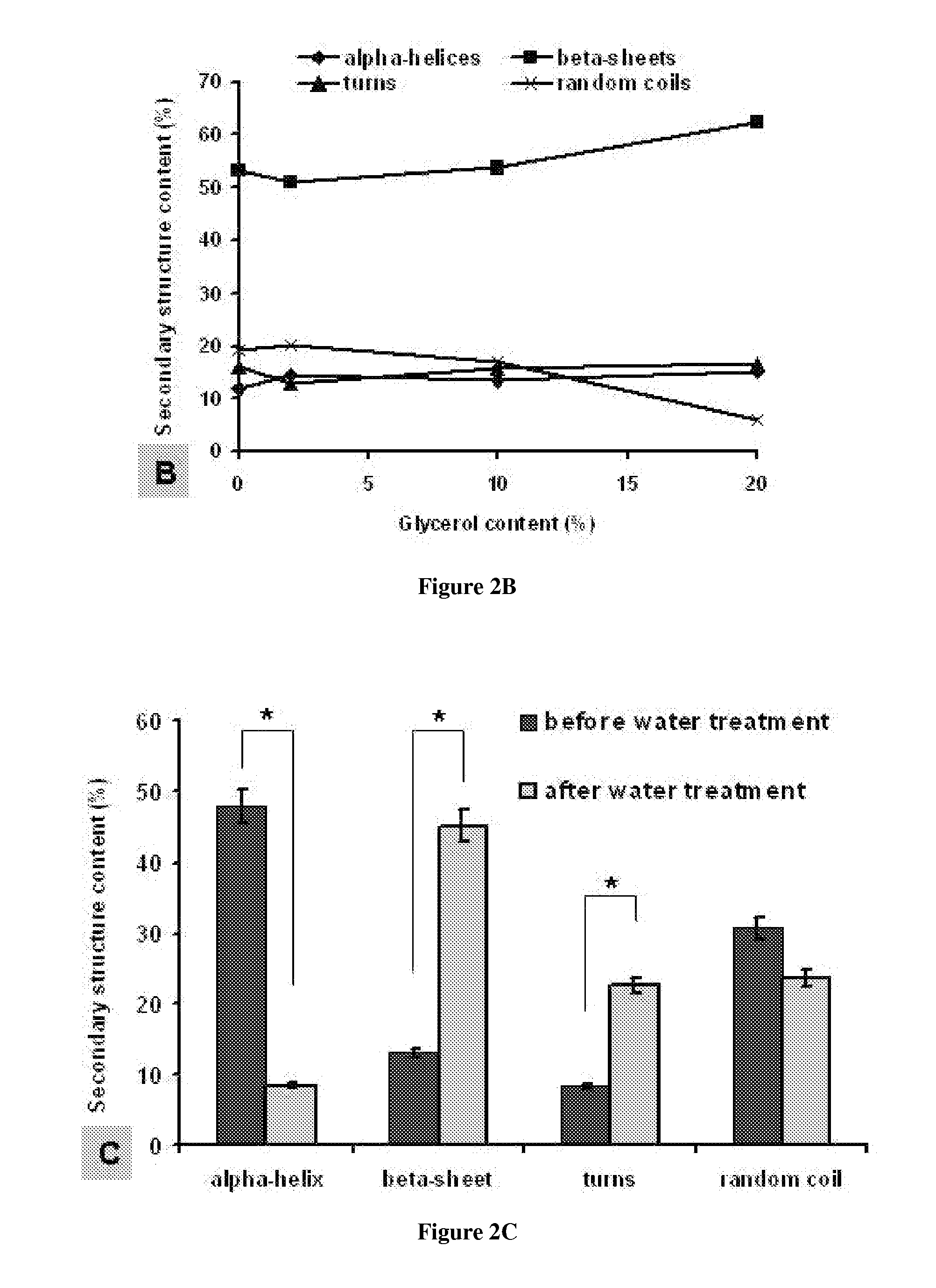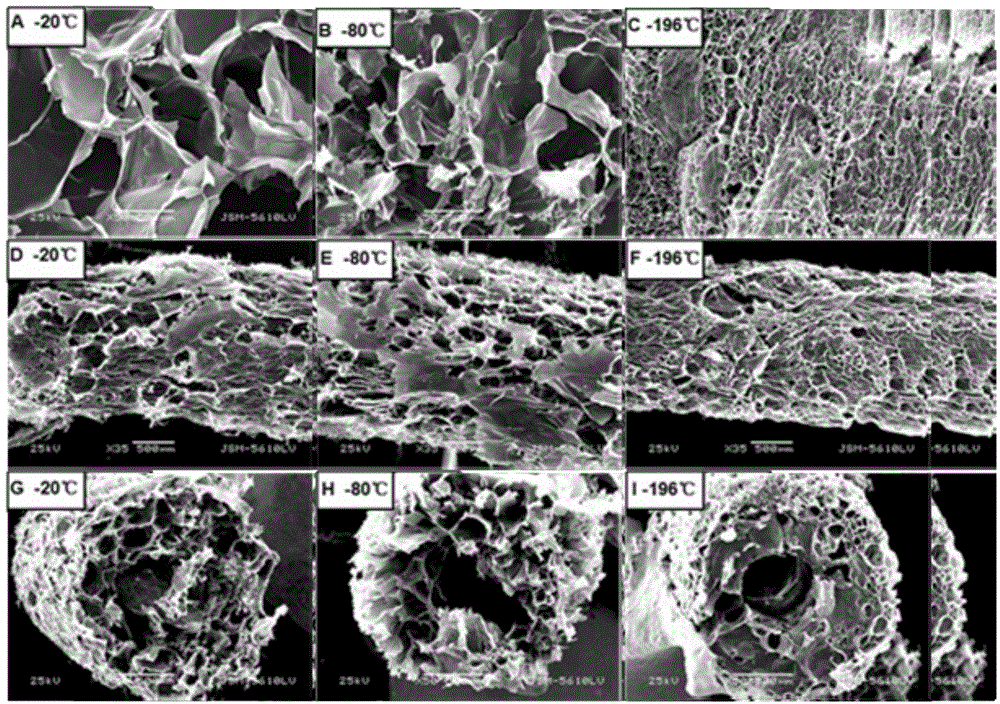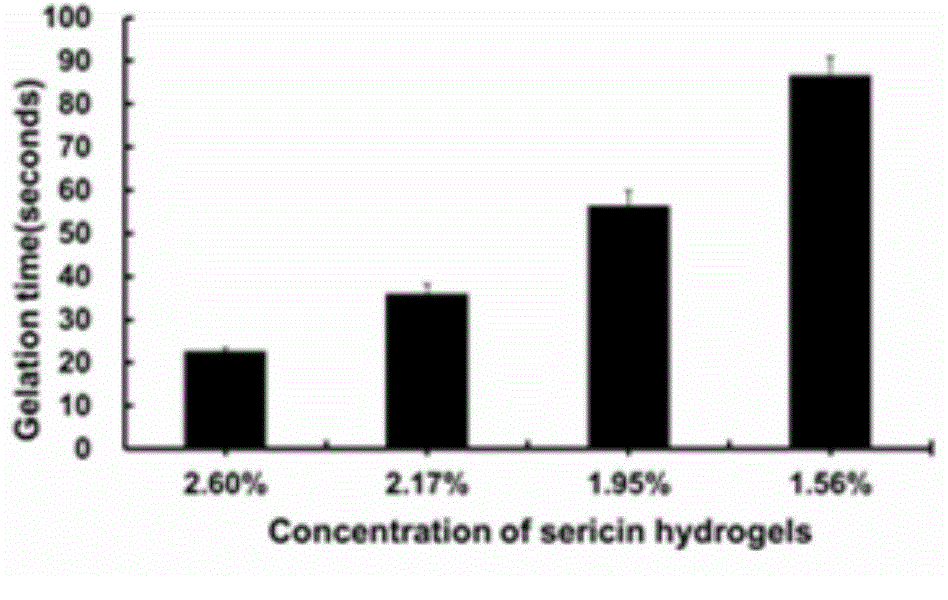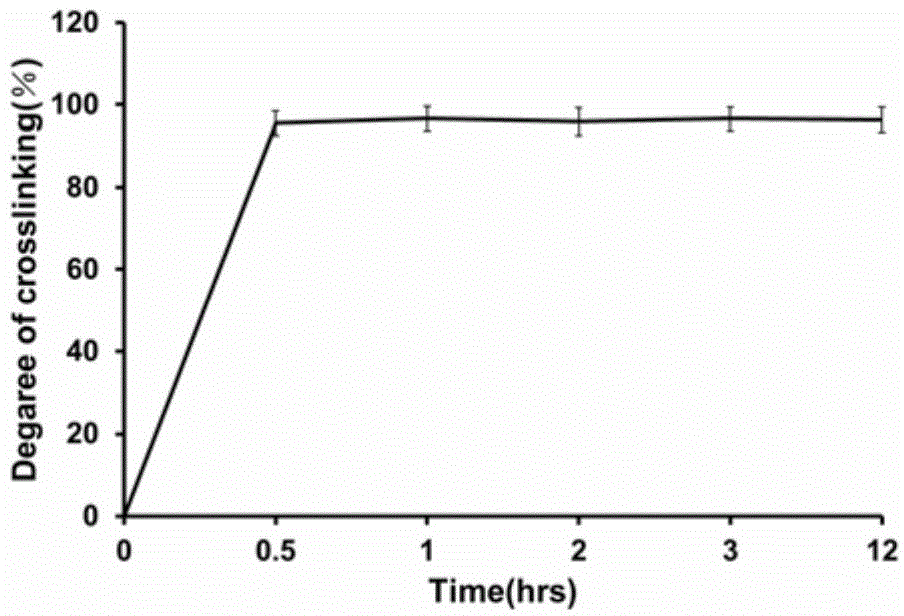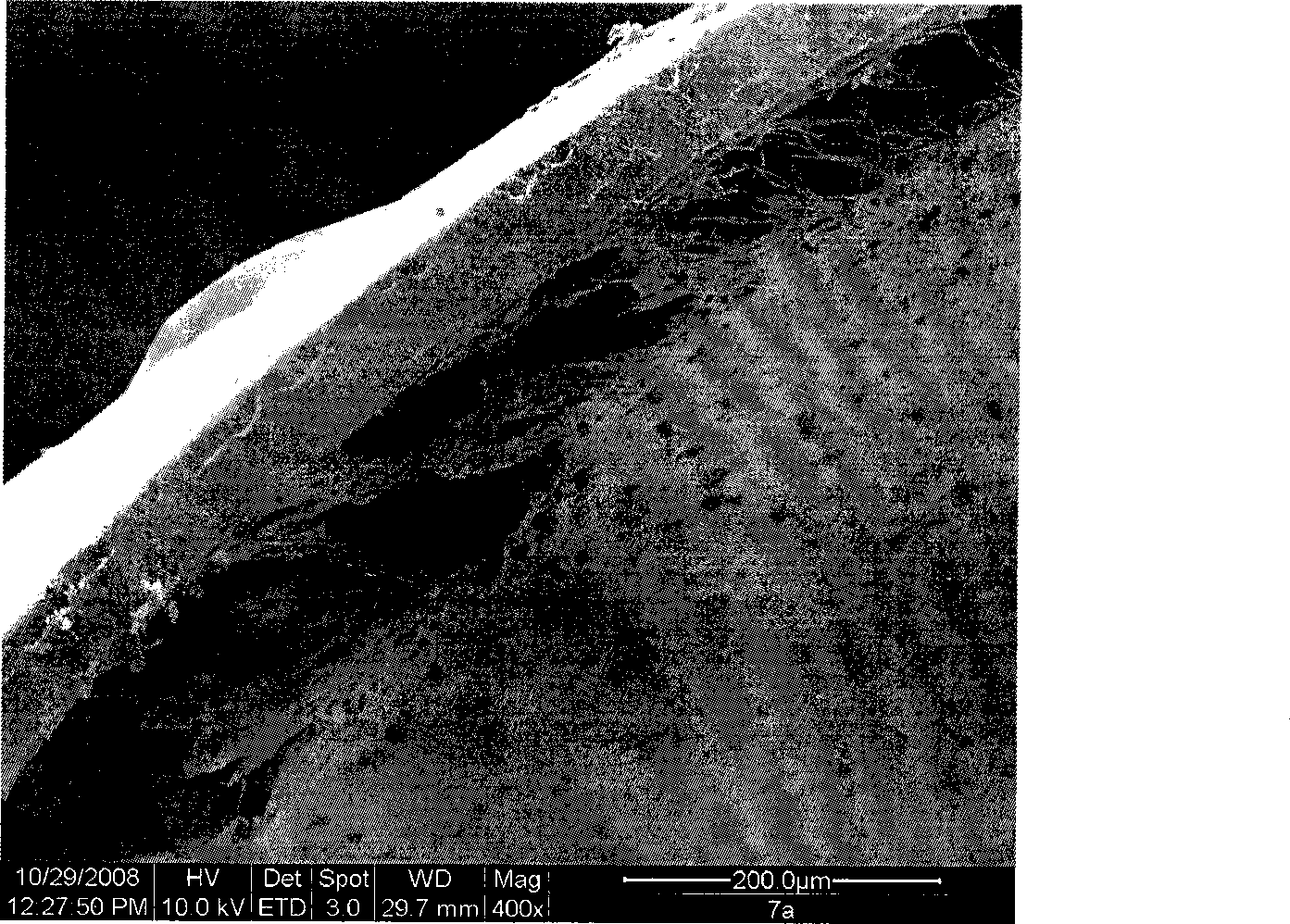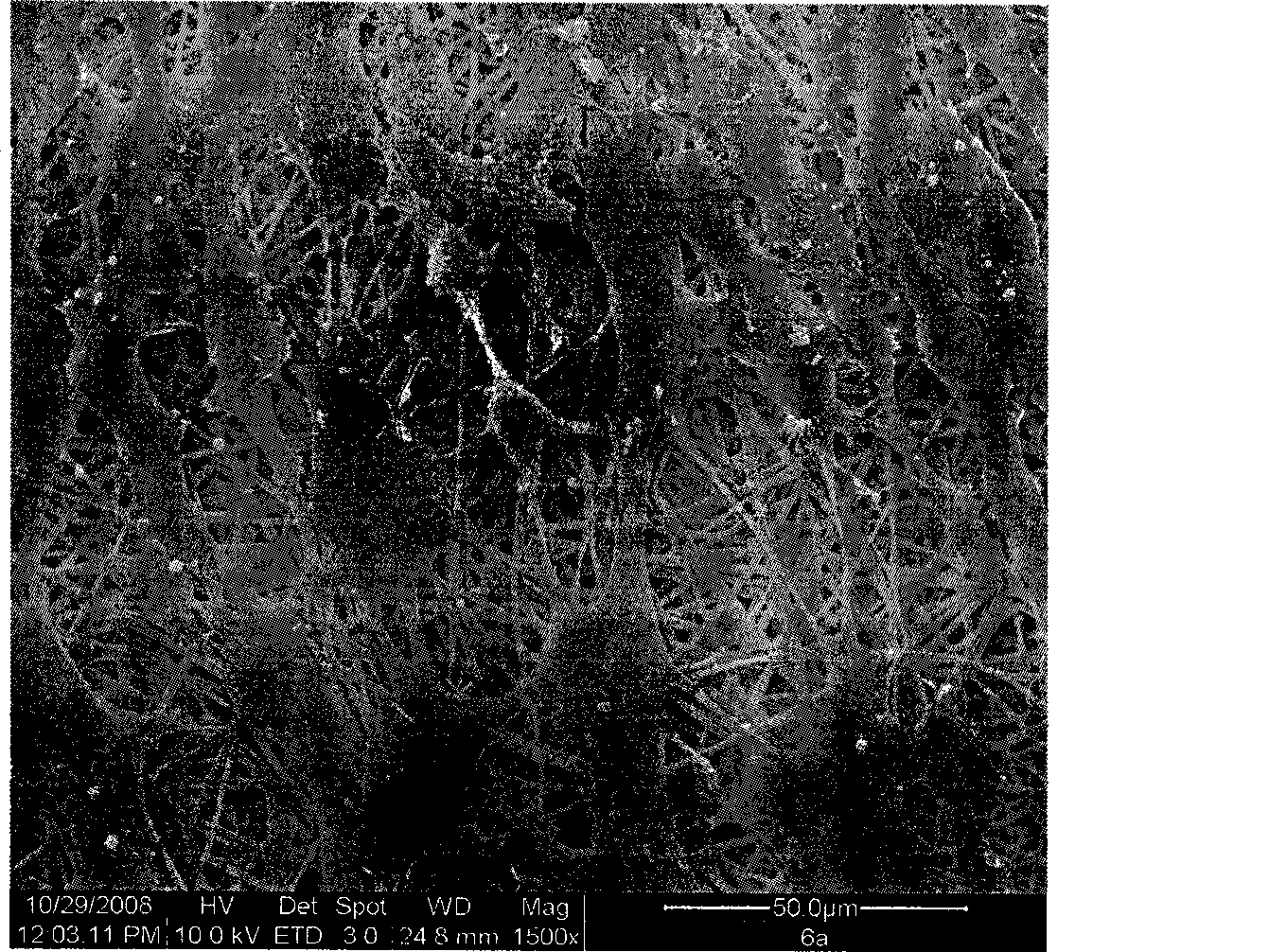Patents
Literature
Hiro is an intelligent assistant for R&D personnel, combined with Patent DNA, to facilitate innovative research.
2800 results about "Fibroin" patented technology
Efficacy Topic
Property
Owner
Technical Advancement
Application Domain
Technology Topic
Technology Field Word
Patent Country/Region
Patent Type
Patent Status
Application Year
Inventor
Fibroin is an insoluble protein present in silk produced by the larvae of Bombyx mori, other moth genera such as Antheraea, Cricula, Samia and Gonometa, and numerous other insects. Silk in its raw state consists of two main proteins, sericin and fibroin, with a glue-like layer of sericin coating two singular filaments of fibroin called brins.
Silk fibroin materials and use thereof
ActiveUS7842780B2Low densityIncreased proliferationPeptide/protein ingredientsMonocomponent fibroin artificial filamentPorosityBiology
The present invention provides processes for producing porous silk fibroin scaffold material. The porous silk fibroin scaffold can be used for tissue engineering. The porosity of the silk fibroin scaffolds described herein can be adjusted as to mimic the gradient of densities found in natural tissue. Accordingly, methods for engineering of 3-dimensional tissue, e.g. bone and cartilage, using the silk fibroin scaffold material are also provided.
Owner:TUFTS UNIV +1
Helically organized silk fibroin fiber bundles for matrices in tissue engineering
InactiveUS6902932B2Immobilised enzymesBioreactor/fermenter combinationsFiber bundleLigament structure
The present invention provides a novel silk-fiber-based matrix having a wire-rope geometry for use in producing a ligament or tendon, particularly an anterior cruciate ligament, ex vivo for implantation into a recipient in need thereof. The invention further provides the novel silk-fiber-based matrix which is seeded with pluripotent cells that proliferate and differentiate on the matrix to form a ligament or tendon ex vivo. Also disclosed is a bioengineered ligament comprising the silk-fiber-based matrix seeded with pluripotent cells that proliferate and differentiate on the matrix to form the ligament or tendon. A method for producing a ligament or tendon ex vivo comprising the novel silk-fiber-based matrix is also disclosed.
Owner:ALLERGAN INC +1
Silk microspheres for encapsulation and controlled release
A method was developed to prepare silk fibroin microspheres using lipid vesicles as templates to efficiently load therapeutic agents in active form for controlled release. The lipids are subsequently removed through the use of a dehydration agent, such as methanol or sodium chloride, resulting in β-sheet structure dominant silk microsphere structures having about 2 μm in diameter. The therapeutic agent can be entrapped in the silk microspheres and used in pharmaceutical formulations for controlled-release treatments.
Owner:TRUSTEES OF TUFTS COLLEGE TUFTS UNIV
Silk biomaterials and methods of use thereof
ActiveUS7674882B2Avoid problemsReduce usagePeptide/protein ingredientsFilament/thread formingFiberIn vivo
The present invention provides an all-aqueous process and composition for production of silk biomaterials, e.g., fibers, films, foams and mats. In the process, at least one biocompatible polymer, such as poly(ethylene oxide) (PEO) (a well-documented biocompatible material), was blended with the silk protein prior to processing e.g., electrospinning. We discovered that this step avoids problems associated with conformational transitions of fibroin during solubilization and reprocessing from aqueous solution which lead to embrittled materials. Moreover, the process avoids the use of organic solvents that can pose problems when the processed biomaterials are exposed to cells in vitro or in vivo.
Owner:MASSACHUSETTS INST OF TECH +1
Concentrated aqueous silk fibroin solution and use thereof
ActiveUS20070187862A1Reduce usageConnective tissue peptidesPeptide/protein ingredientsFiberOrganic solvent
The present invention provides for concentrated aqueous silk fibroin solutions and an all-aqueous mode for preparation of concentrated aqueous fibroin solutions that avoids the use of organic solvents, direct additives, or harsh chemicals. The invention further provides for the use of these solutions in production of materials, e.g., fibers, films, foams, meshes, scaffolds and hydrogels.
Owner:TRUSTEES OF TUFTS COLLEGE TUFTS UNIV
Silk-Based Drug Delivery System
ActiveUS20080085272A1High crystallinityIncrease liquid crystlallinityAntibacterial agentsOrganic active ingredientsCrystallinityDelivery system
The present invention provides for novel sustained release silk-based delivery systems. The invention further provides methods for producing such formulations. In general, a silk fibroin solution is combined with a therapeutic agent to form a silk fibroin article. The article is then treated in such a way as to alter its conformation. The change in conformation increases its crytallinity or liquid crystallinity, thus controlling the release of a therapeutic agent from the formulation. This can be accomplished as single material carriers or in a layer-by-layer fashion to load different therapeutic agents or different concentrations of these agents in each layer.
Owner:TRUSTEES OF TUFTS COLLEGE TUFTS UNIV +1
Wound dressing material containing silk fibroin and sericin as main component and method for preparing same
There is provided a novel wound dressing material which has biocompatibility and infection controllability as essential properties required for such a material, especially excellent flexibility and water absorption properties, thereby accelerating smooth regeneration of a skin defect without stripping off the regenerating skin while removing the material from the skin. A healing agent is added to the wound dressing material which comprises an amorphous film of a crystallinity below 10% and contains fibroin and sericin as a main component.
Owner:NAT INST OF AGROBIOLOGICAL SCI +1
Silk Fibroin Hydrogels and Uses Thereof
InactiveUS20110008406A1Increase profitGood biocompatibilityBiocideCosmetic preparationsDiseaseFibronectin binding
The present specification provides for methods for purifying fibroins, purified fibroins, methods of conjugating biological and synthetic molecules to fibroins, fibroins conjugated to such molecules, methods of making fibroin hydrogels, fibroin hydrogels and fibroin hydrogel formulations useful for a variety of medical uses, including, without limitation uses as bulking agents, tissue space fillers, templates for tissue reconstruction or regeneration, cell culture scaffolds for tissue engineering and for disease models, surface coating to improve medical device function, or drug delivery devices.
Owner:ALLERGAN INC
Silk Fibroin Hydrogels and Uses Thereof
InactiveUS20110008437A1Increase profitGood biocompatibilityPowder deliveryCosmetic preparationsDiseaseFibronectin binding
The present specification provides for methods for purifying fibroins, purified fibroins, methods of conjugating biological and synthetic molecules to fibroins, fibroins conjugated to such molecules, methods of making fibroin hydrogels, fibroin hydrogels and fibroin hydrogel formulations useful for a variety of medical uses, including, without limitation uses as bulking agents, tissue space fillers, templates for tissue reconstruction or regeneration, cell culture scaffolds for tissue engineering and for disease models, surface coating to improve medical device function, or drug delivery devices.
Owner:ALLERGAN INC
Concentrated aqueous silk fibroin solution and use thereof
ActiveUS20090234026A1Reduce usageBiocideMonocomponent fibroin artificial filamentFiberOrganic solvent
The present invention provides for concentrated aqueous silk fibroin solutions and an all-aqueous mode for preparation of concentrated aqueous fibroin solutions that avoids the use of organic solvents, direct additives, or harsh chemicals. The invention further provides for the use of these solutions in production of materials, e.g., fibers, films, foams, meshes, scaffolds and hydrogels.
Owner:TRUSTEES OF TUFTS COLLEGE
Method for silk fibroin gelation using sonication
ActiveUS20100178304A1Fast gelationCell from functioningBiocideOrganic active ingredientsDelivery vehicleViable cell
This invention provides for a process of rapidly forming silk fibroin gelation through ultrasonication. Under the appropriate conditions, gelation can be controlled to occur within two hours after the ultrasonication treatment. Biological materials, including viable cells, or therapeutic agents can be encapsulated in the hydrogels formed from the process and be used as delivery vehicles.
Owner:TRUSTEES OF TUFTS COLLEGE TUFTS UNIV
Methods for stepwise deposition of silk fibroin coatings
ActiveUS20090202614A1Suppression of initial burstFacilitated releasePeptide/protein ingredientsLayered productsChemical treatmentEntrapment
The invention provides a method for the controlled assembly of layered silk fibroin coatings using aqueous silk fibroin material. The methods described herein can be used to coat substrates of any material, shape, or size. Importantly, the described methods enable control of the biomaterial surface chemistry, thickness, morphology and structure using layered thin film coatings, or bulk coatings. Furthermore, the methods can be performed in all water and do not require intensive chemical processing enabling controlled entrapment of labile molecules such as, drugs, cytokines, and even cells or viruses to generate functional coatings that can be used in a variety of applications.
Owner:TRUSTEES OF TUFTS COLLEGE TUFTS UNIV
Nanofibrous nonwoven membrane of silk fibroin for guided bone tissue regeneration and manufacturing method thereof
InactiveUS20060095137A1Easy to controlSimple processMaterial nanotechnologyElectric discharge heatingBone tissueBiocompatibility Testing
The present invention relates to a membrane for guided bone tissue regeneration and, more particularly, to a membrane for guided bone tissue regeneration having a structure that silk fibroin nanofibers obtained by removing sericin from silk fibers are formed as a nonwoven, and a manufacturing method thereof. A membrane for guided bone tissue regeneration according to the present invention has a predetermined strength, biocompatibility, and biodegradability, and may maintain a sustained drug release system, when drugs are added in the manufacturing process. Additionally, a membrane for guided bone tissue regeneration according to the present invention may be modified corresponding to the condition of usage, because a thickness of the membrane may be adjusted by controlling fineness of nanofibers, compactness of nanofibers, and pore size of a multiporous structure may be adjusted, in a nonwoven manufacturing process. A nanofibrous membrane for guided bone tissue regeneration according to the present invention is manufactured by freezing rapidly, drying a silk fibroin solution obtained by removing sericin from silk fibers, and by electrospinning after dissolving the dried silk fibroin in an electrospinning solvent. The membrane according to the present invention has excellent adhesion and air permeability, and is thereby effective in regeneration of damaged periodontal tissues.
Owner:SEOUL NAT UNIV R&DB FOUND
Electrospun pharmaceutical compositions
ActiveUS20060273279A1Increased proliferationIncrease differentiationPeptide/protein ingredientsFilament/thread formingPorosityFibroin
The present invention provides processes for producing porous silk fibroin scaffold material. The porous silk fibroin scaffold can be used for tissue engineering. The porosity of the silk fibroin scaffolds described herein can be adjusted to mimic the gradient of densities found in natural tissue. Accordingly, methods for engineering of 3-dimensional tissue, e.g. bone and cartilage, using the silk fibroin scaffold material are also provided.
Owner:TUFTS UNIV +1
Silk fibroin materials and use thereof
ActiveUS20100279112A1Low densityIncreased proliferationPeptide/protein ingredientsFilament/thread formingPorosityBiology
The present invention provides processes for producing porous silk fibroin scaffold material. The porous silk fibroin scaffold can be used for tissue engineering. The porosity of the silk fibroin scaffolds described herein can be adjusted as to mimic the gradient of densities found in natural tissue. Accordingly, methods for engineering of 3-dimensional tissue, e.g. bone and cartilage, using the silk fibroin scaffold material are also provided.
Owner:TRUSTEES OF TUFTS COLLEGE +1
Tissue-engineered silk organs
ActiveUS20100191328A1Easy to controlEye implantsNervous system cellsCell-Extracellular MatrixCulture cell
This invention relates to a lamellae tissue layer, comprising a grooved silk fibroin substrate comprising tissue-specific cells. The silk fibroin substrates provides an excellent means of controlling and culturing cell and extracellular matrix development. A multitude of lamellae tissue layers can be used to create a tissue-engineered organ, such as a tissue-engineered cornea. The tissue-engineered organ is non-immunogenic and biocompatible.
Owner:TRUSTEES OF TUFTS COLLEGE TUFTS UNIV
Silk fibroin nanofiber membrane and preparation method thereof
The invention discloses a silk fibroin nanofiber membrane and a preparation method of the silk fibroin nanofiber membrane. The preparation method comprises the following specific steps of: dissolving natural silk taken as a main raw material by an acid salt solution, forming a membrane, desalting the membrane, dissolving the membrane by methanoic acid and hexafluoroisopropanol to prepare a spinning solution, and carrying out electrostatic spinning to prepare the silk fibroin nanofiber membrane. The silk fibroin nanofiber membrane comprises fibers with the diameter of 10nm-10 microns and has the excellent mechanical property, the breaking strength of greater than 8Mpa at dry state, the breaking elongation of greater than 15% at dry state, the breaking strength of greater than 1Mpa at wet state and the breaking elongation of greater than 100% at wet state. In addition, the silk fibroin nanofiber membrane prepared by the method is stable and controllable in structure, has good biocompatibility and can serve as a medicinal biological material. The preparation method disclosed by the invention is simple and short in flow path, has high film formation and spinning efficiency and is suitable for industrialization large-scale production.
Owner:上海丝波敦生物科技有限公司
Method for the preparation of a non-woven silk fibroin fabrics
InactiveUS7285637B2Peptide/protein ingredientsMonocomponent fibroin artificial filamentSericinDisulfide bond
A process for producing non-woven silk fiber fabrics comprises the following steps: a) obtaining silk fibroin, for example either from silk cocoons, or silk textiles or waste silk; b) removing the sericin layer covering the silk fibroin fibers, when present; c) breaking the disulfide bonds between heavy (350 kDa) and light (27 kDa) chains of silk fibroin in order to obtain the production of chain fragments which serve as a specific cellular recognition sites promoting the attachment and growth of cells, d) homogenising of the material resulting from step c).
Owner:CONSORZIO PER GLI STUDI UNIVRI
Silk fibroin fiber bundles for matrices in tissue engineering
InactiveUS20050089552A1Increase differentiationEnhance tissue development processBioreactor/fermenter combinationsPeptide/protein ingredientsFiber bundleLigament structure
The present invention provides a novel silk-fiber-based matrix having a wire-rope geometry for use in producing a ligament or tendon, particularly an anterior cruciate ligament, ex vivo for implantation into a recipient in need thereof. The invention further provides the novel silk-fiber-based matrix which is seeded with pluripotent cells that proliferate and differentiate on the matrix to form a ligament or tendon ex vivo. Also disclosed is a bioengineered ligament comprising the silk-fiber-based matrix seeded with pluripotent cells that proliferate and differentiate on the matrix to form the ligament or tendon. A method for producing a ligament or tendon ex vivo comprising the novel silk-fiber-based matrix is also disclosed.
Owner:ALLERGAN INC
Drug delivery platforms comprising silk fibroin hydrogels and uses thereof
The present specification provides drug delivery platforms useful for the controlled release of a compound over time in an individual.
Owner:ALLERGAN INC
Silk Fibroin Hydrogels and Uses Thereof
InactiveUS20110008436A1Increase profitGood biocompatibilityBiocideCosmetic preparationsDiseaseBiology
The present specification provides for methods for purifying fibroins, purified fibroins, methods of conjugating biological and synthetic molecules to fibroins, fibroins conjugated to such molecules, methods of making fibroin hydrogels, fibroin hydrogels and fibroin hydrogel formulations useful for a variety of medical uses, including, without limitation uses as bulking agents, tissue space fillers, templates for tissue reconstruction or regeneration, cell culture scaffolds for tissue engineering and for disease models, surface coating to improve medical device function, or drug delivery devices.
Owner:ALLERGAN INC
Antheraea pernyi silk fibrion biology medicine material and the preparation method
InactiveCN101036802AGood biocompatibilityIdeal induced biomedical materialsSurgeryProsthesisTissue repairReticular formation
The invention discloses bio-medical engineering material and preparation method thereof, particularly relates to 3D tissue repair material suitable for adhesively growing of cell and preparation method thereof, belonging to bio-medical material technique domain. The natural tussah silk is used as raw material. After antheraea pernyi silk fibroin dissolves, 3D non-woven web structure composed of antheraea pernyi silk fibroin fibre is obtained by electrostatic spinning, wherein the fibre diameter is 50nm-20 mu m, the hole between the fibres is 1-500 mu m, the thickness of non-woven web is 50nm-20mm, and molecular weight of the antheraea pernyi silk fibroin is 10X10<4>-20X10<5>D. The bio-medical engineering material has features of non-poison, harmless, good biocampatibility, good adhesive growth ability of cell, etc. Because of the wide materials supply and low cost, the said material will replace some high-cost bio-medical material such as collagen, and will be used for repair material such as artificial skin, tendon, cartilage, duramater and so on, particularly for histiocyte induction material.
Owner:SUZHOU UNIV
Composite repair material for bridging defect nerves and stent made of composite repair material
The invention provides a composite repair material which facilitates surgical operation and realizes quick defect nerve bridging and composition, preparation and application of a stent made of the composite repair material. The composite repair material consists of a fibroin layer, a collagen layer and a high-molecular polymer layer which are sequentially arranged, and during application, the composite repair material is folded or wound to form the nerve bridging stent taking the fibroin layer as the inner layer, the collagen layer as the middle layer and the high-molecular polymer as the outer layer. The composite repair material and the stent made of the composite repair material adopt the layered arrangement and a specific three-dimensional design to bring the advantages of various repair materials into full play, and meanwhile, make up for the deficiencies of the various repair materials. During surgical operation, only suturing or bonding anastomosis of epineurium is required but not suturing of perineurium, so that the operation time of a defect nerve bridging operation is greatly shortened, the operation technical difficulty is lowered, and the security is improved.
Owner:WENZHOU MEDICAL UNIV
System and method for making biomaterial structures
ActiveUS20110076384A1Unique and robust mechanical propertyProperty is limitedNew-spun product collectionMonocomponent fibroin artificial filamentFiberMaterials processing
A system and method for making a biomaterial device includes a support structure providing a shape for a biomaterial device. At least one applicator has a supply of biomaterial solution and is positioned along the support structure. The at least one applicator forms a biomaterial fiber by applying shear force to the biomaterial solution and delivering the biomaterial fiber to the support structure. A controller causes relative movement between the support structure and the at least one applicator, and the biomaterial fiber is arranged on the support structure according to the relative movement to form the biomaterial device. The biomaterial may be silk fibroin which may be wound onto a reciprocating and rotating mandrel. Control over the properties of the biomaterial device is achieved through appropriate selection of material processing, winding strategy, and post-winding processing.
Owner:TRUSTEES OF TUFTS COLLEGE +1
Vortex-induced silk fibroin gelation for encapsulation and delivery
The present invention provided for a novel process of forming silk fibroin gels, and controlling the rate of β-sheet formation and resulting hydrogelation kinetics, by vortex treatment of silk fibroin solution. In addition, the vortex treatment of the present invention provides a silk fibroin gel that may be reversibly shear-thinned, enabling the use of these approach for precise control of silk self-assembly, both spatially and temporally. Active agents, including biological materials, viable cells or therapeutic agents, can be encapsulated in the hydrogels formed from the processes, and be used as delivery vehicles. Hence, the present invention provide for methods for silk fibroin gelation that are useful for biotechnological applications such as encapsulation and delivery of active agents, cells, and bioactive molecules.
Owner:TRUSTEES OF TUFTS COLLEGE TUFTS UNIV
Nano fibrous tissue engineering blood vessel and preparation thereof
InactiveCN101214393APromote endothelializationMeet the mechanical requirementsConjugated cellulose/protein artificial filamentsBlood vesselsFiberCross-link
The invention relates to a tissue engineering material and a preparation method thereof, in particular to a nano fiber tissue engineering blood vessel and a preparation method thereof. The invention consists of a three-dimensional reticular non-woven film formed by an inner layer of nano fiber and an outer layer of nano fiber; the inner layer of the blood vessel is natural polymer, wherein, calculated by weight, 40 percent to 80 percent is fibroin, 20 percent to 50 percent is gelatine, 0 percent to 20 percent is extracellular matrix protein; while the outer layer of the blood vessel is synthetic polymer. The preparation method is that the natural polymer is dissolved in trifluroroethyl and other solution, while the synthetic polymer is dissolved in hexafluoroisopropanol and other solution, which are respectively prepared into spinning solution; the static electricity spinning technique is adopted to subsequently form the inner and the outer layers on a gather roller; cross-linked treatment is conducted after the inner and the outer layers are taken down, to prepare the nano fiber tissue engineering vessel. The inner layer can simulate the structure of the extracellular matrix, provide good environment for endothelial cells to grow, support adhesion, proliferation and differentiation of the cells, and is good for endothelization of the blood vessel; and the outer layer has good mechanical performance.
Owner:SUZHOU UNIV
Modified silk films containing glycerol
InactiveUS20110223153A1Distinct propertyAdds “ green chemistry ” valueAntibacterial agentsOrganic active ingredientsActive agentGlycerol
The present invention provides for compositions and methods for preparing aqueous insoluble, ductile, flexible silk fibroin films. The silk films comprise silk fibroin and about 10% to about 50% (w / w) glycerol, and are prepared by entirely aqueous processes. The ductile silk film may be further treated by extracting the glycerol from and re-drying the silk film. Active agents may be embedded in or deposited on the glycerol modified silk film for a variety of medical applications. The films may be into 3-dimentional structures, or placed on support surfaces as labels or coatings. The glycerol modified silk films of the present invention are useful in variety of applications such as tissue engineering, medical devices or implants, drug delivery, and edible pharmaceutical or food labels.
Owner:TRUSTEES OF TUFTS COLLEGE TUFTS UNIV
Preparation method and application of sericin hydrogel
ActiveCN103951831AGood natural propertiesOvercoming the challenge of high biological properties of sericinNervous disorderPeptide/protein ingredientsCross-linkDisease
The invention discloses a preparation method of sericin hydrogel, the method is as follows: first, weighting domestic silkworm fibroin deletion form mutation variety silkworm cocoon for LiBr or LiCl extraction and dialysis and purification to obtain a non-degradable sericin water solution with a mass percentage concentration of 0.1-4%; concentrating the sericin water solution to 1.5-10%, adding a cross-linking agent to the concentrated sericin water solution (wherein 2-500muL of the cross-linking agent is added into each L of the sericin water solution), fully mixing, and placing at 4-45 DEG C for 5 seconds to 36 hours to obtain the sericin hydrogel. The sericin hydrogel has biological activity and multiple functions, can be used as carrying growth factors, drugs and cell carriers treatment, and can be applied in repair of a variety of soft tissue injuries, including but not limited to skin damages, muscle damages, injuries of blood vessel, nerve injuries, myocardial damages, and the like, and treatment of diseases.
Owner:XIEHE HOSPITAL ATTACHED TO TONGJI MEDICAL COLLEGE HUAZHONG SCI & TECH UNIV
Method for preparing graphene/ silk composite fiber
InactiveCN103173882AHigh strengthImprove toughnessMonocomponent fibroin artificial filamentFilament/thread formingElectrospinningGraphite
The invention provides a method for preparing graphene / silk composite fiber. The method comprises the steps of: oxidizing graphite powder by using acid, and carrying out ultrasonic dispersing and stripping to obtain graphene solution; mixing the obtained graphene solution with degummed silk fibroin and formic acid to obtain spinning solution; and carrying out electrospinning on the spinning solution by an electrostatic spinning device to obtain the graphene / silk composite fiber. The method is simple in preparation technology, can effectively improve the mechanical property of the silk fiber and is easy to popularize and use.
Owner:DALIAN MARITIME UNIVERSITY
Tissue regeneration membrane with bioactivity and preparation method thereof
InactiveCN101474430APrevent invasionPromote intensiveSurgeryProsthesisElectrospinningIsolation layer
The invention discloses a bioactive tissue regeneration membrane and a preparing method thereof. The membrane is double compound layer. One layer is a tissue isolation layer which comprises silk fibroin, and the other layer is a tissue orientation layer which comprises silk fibroin bundles adhered on the tissue isolation layer or silk fibroin bundles mixed with bioactive factors. One side of the membrane is a smooth dense shape, and the other side is a loose porous structure. In the preparing method of the bioactive tissue regeneration membrane, the silk fibroin solution is swollen, stirred, deaerated and casted into membrane to obtain the tissue isolation layer. One side of the tissue isolation layer is scratched to be coarsened. Then, the silk fibroin solution or the silk fibroin solution mixed with the bioactive factors is coated or sprayed on the scratched layer by an electrostatic spinning method. After freezing and vacuum drying demoulding, the membrane is obtained. The membranehas the advantages of nontoxic and harmless property, perfect biocompatibility, good cell adhering growth property, abundant raw material and low cost and can substitute bio-medical materials of collagen and the like and widely applied to a plurality of clinical subjects.
Owner:WUHAN UNIV
Features
- R&D
- Intellectual Property
- Life Sciences
- Materials
- Tech Scout
Why Patsnap Eureka
- Unparalleled Data Quality
- Higher Quality Content
- 60% Fewer Hallucinations
Social media
Patsnap Eureka Blog
Learn More Browse by: Latest US Patents, China's latest patents, Technical Efficacy Thesaurus, Application Domain, Technology Topic, Popular Technical Reports.
© 2025 PatSnap. All rights reserved.Legal|Privacy policy|Modern Slavery Act Transparency Statement|Sitemap|About US| Contact US: help@patsnap.com



